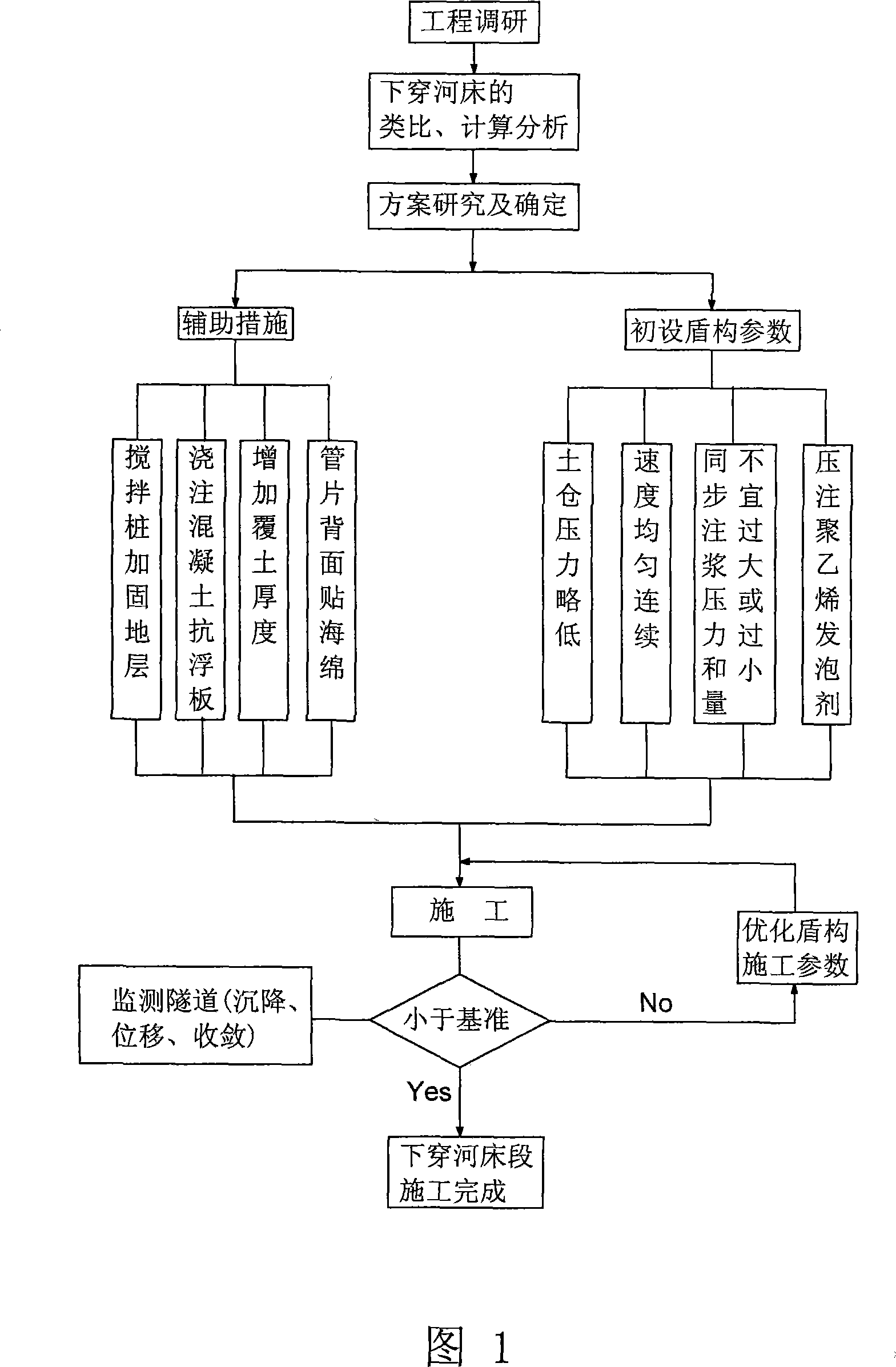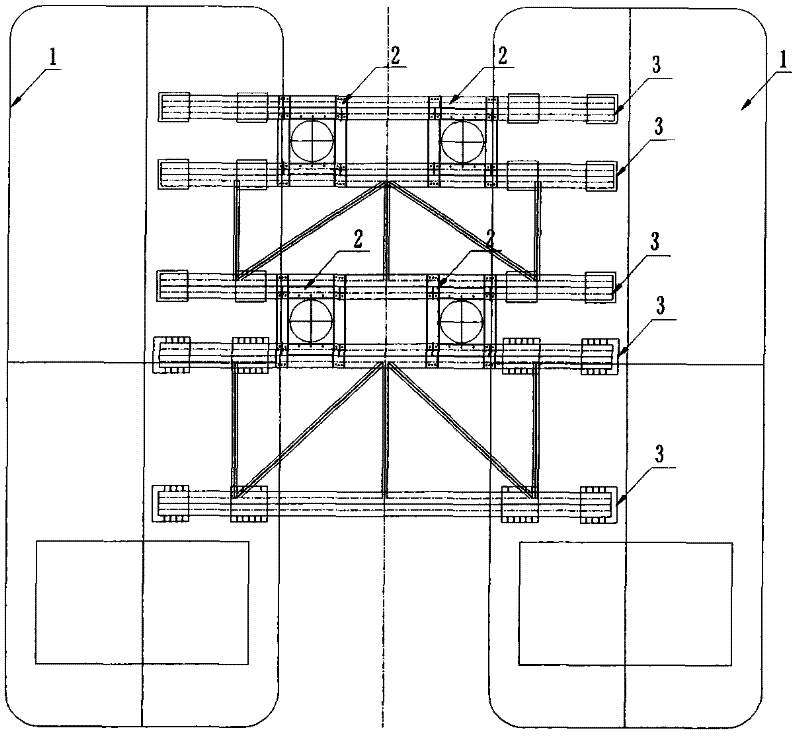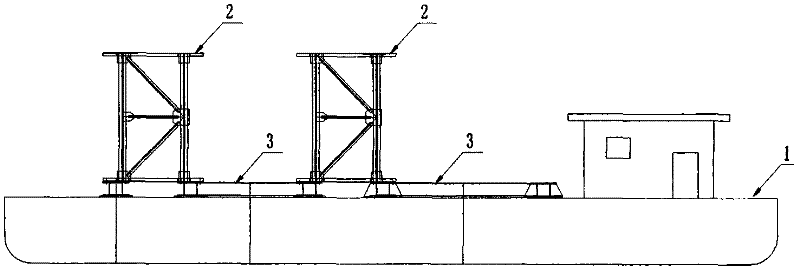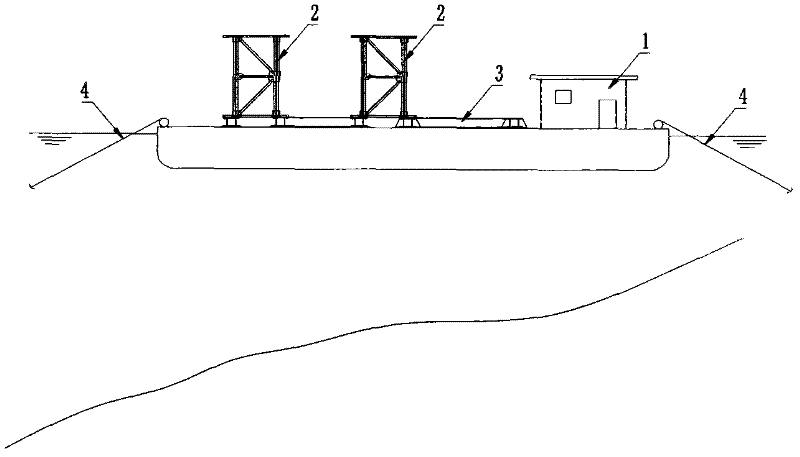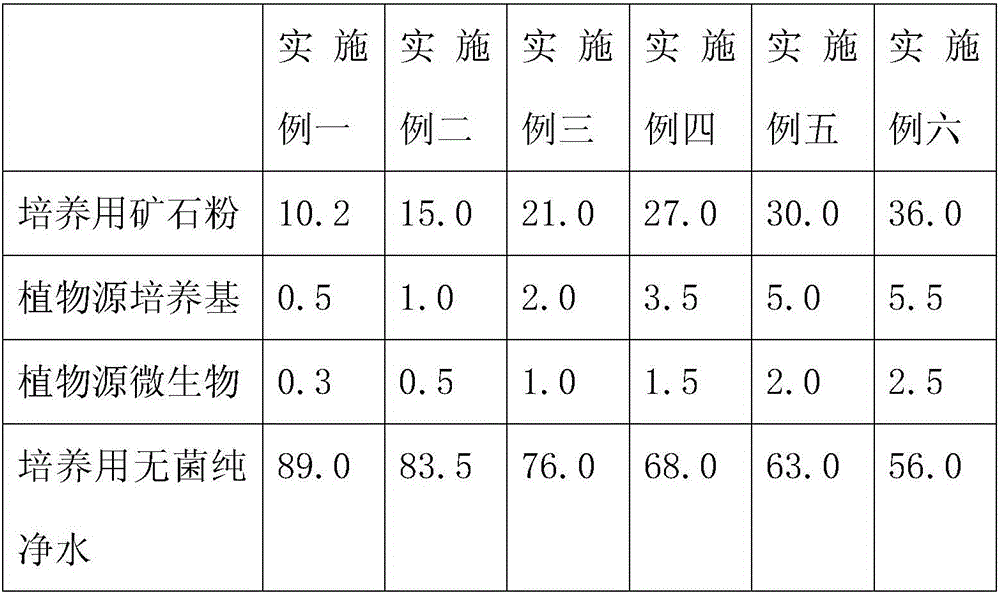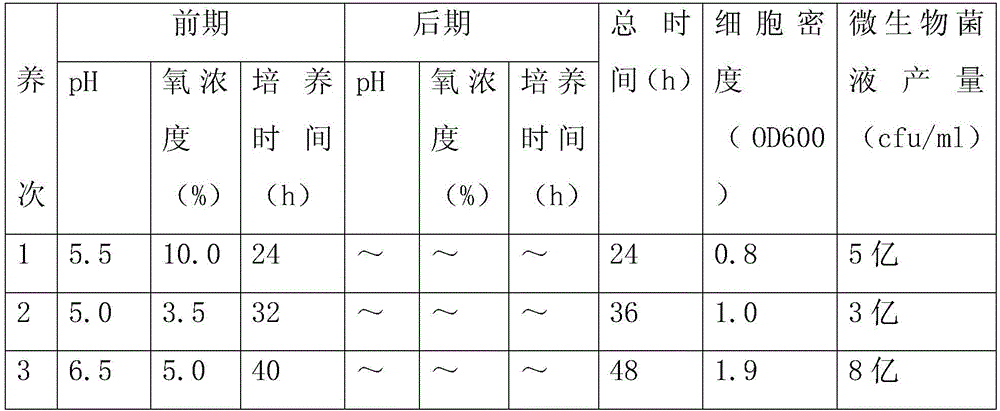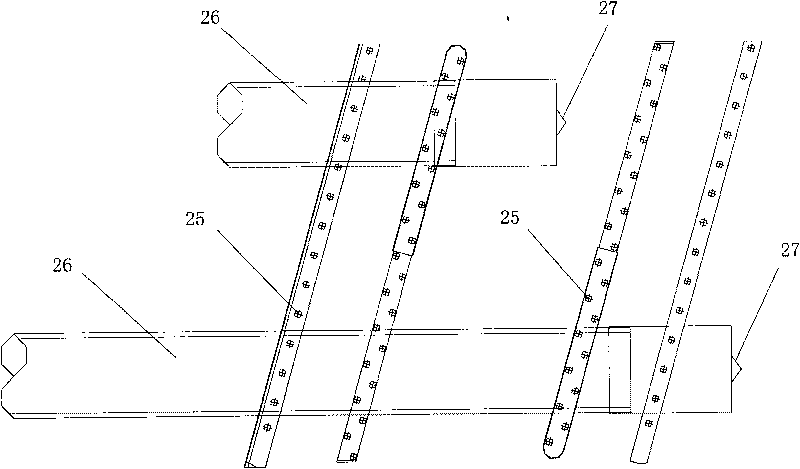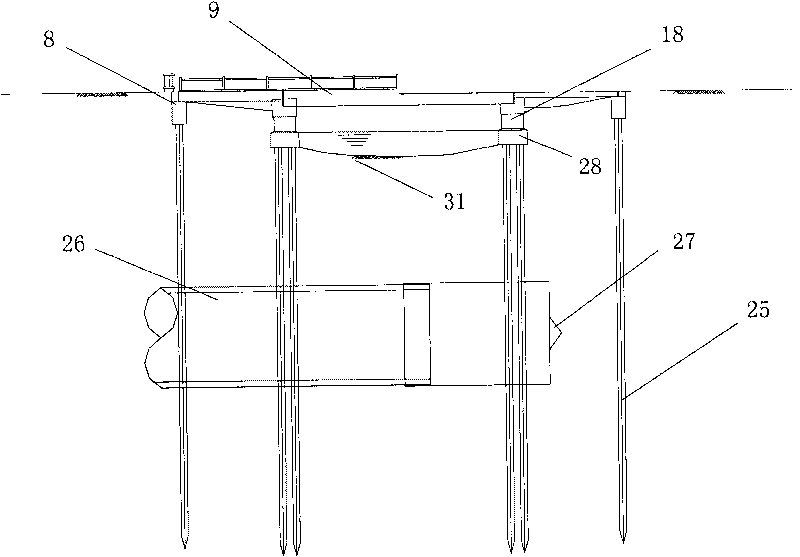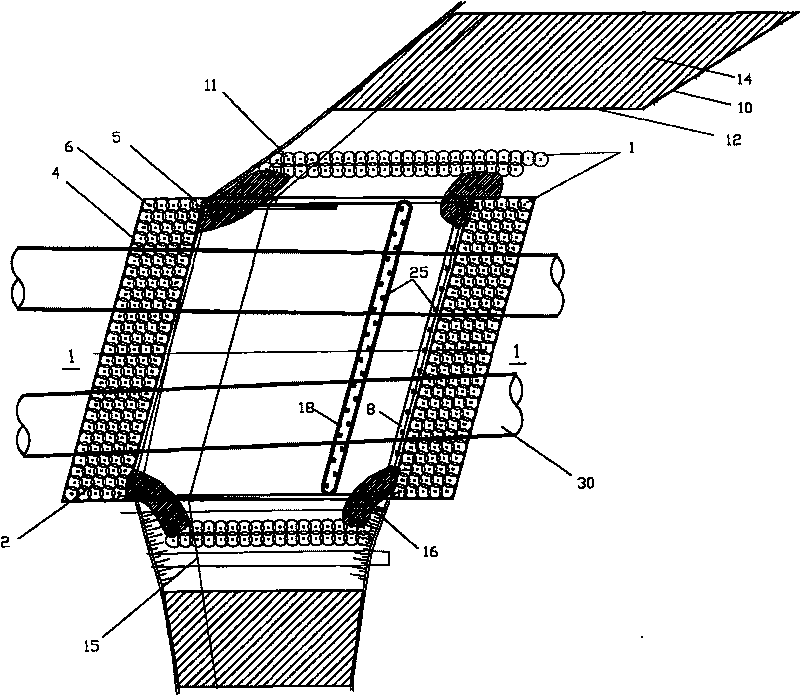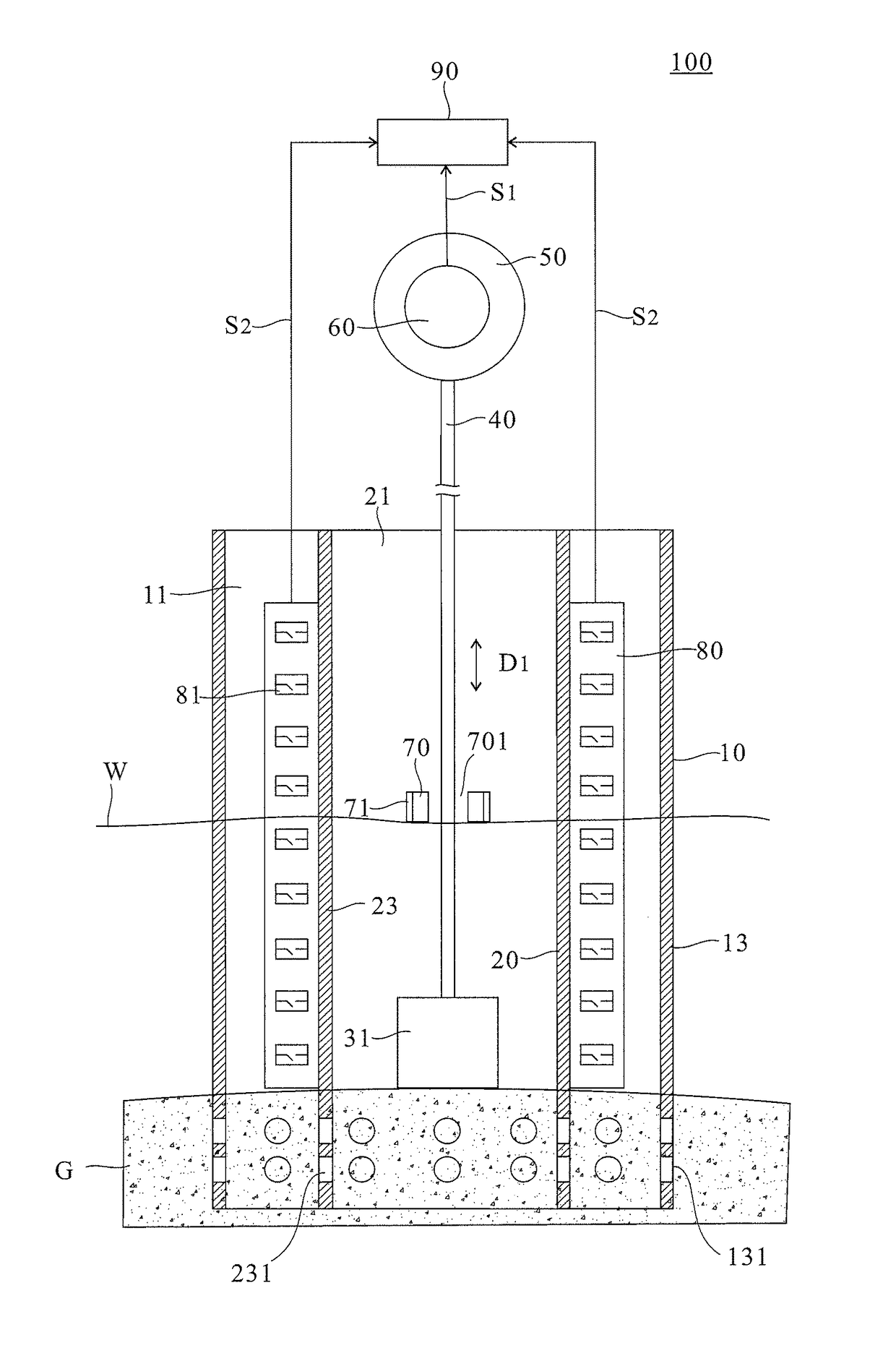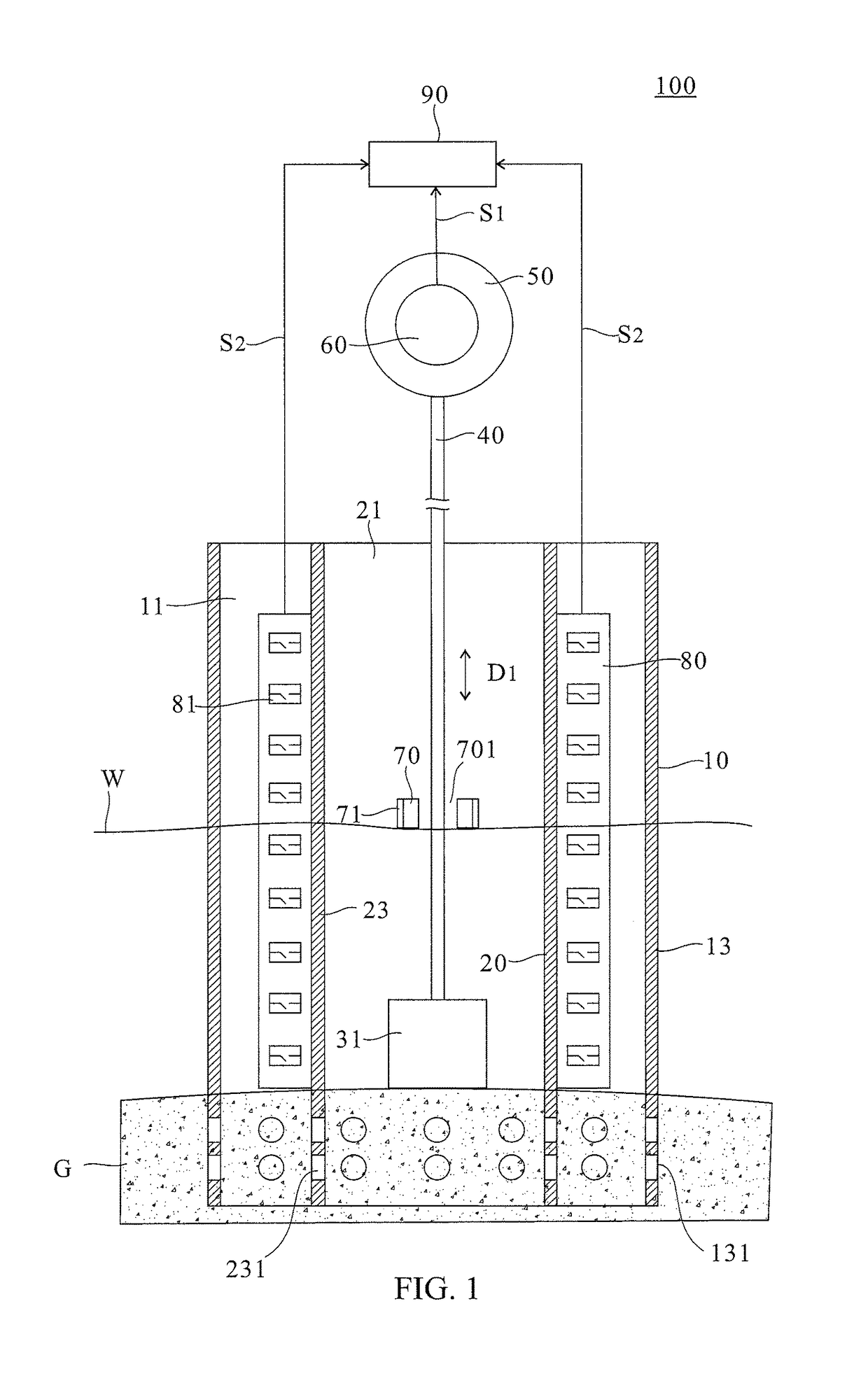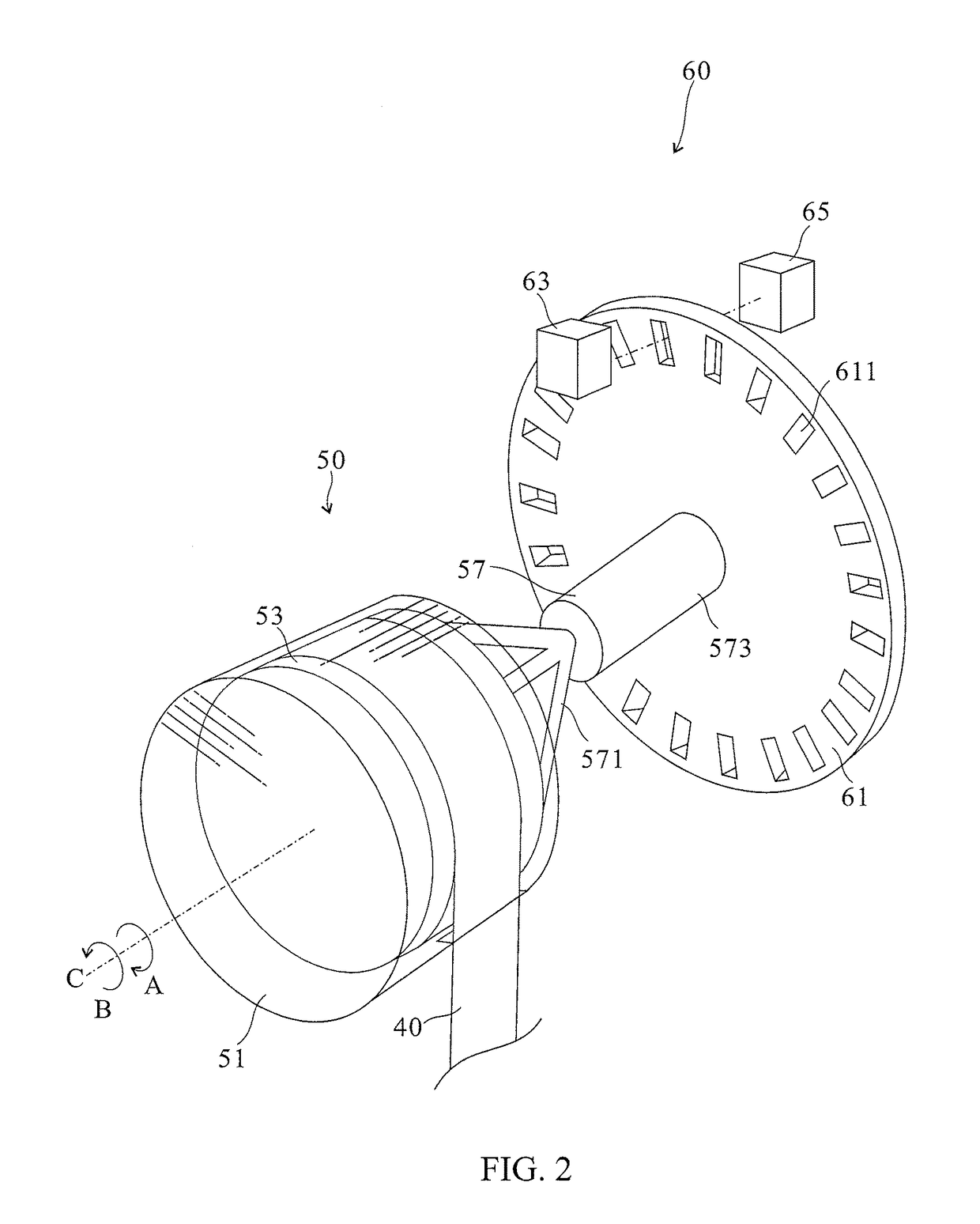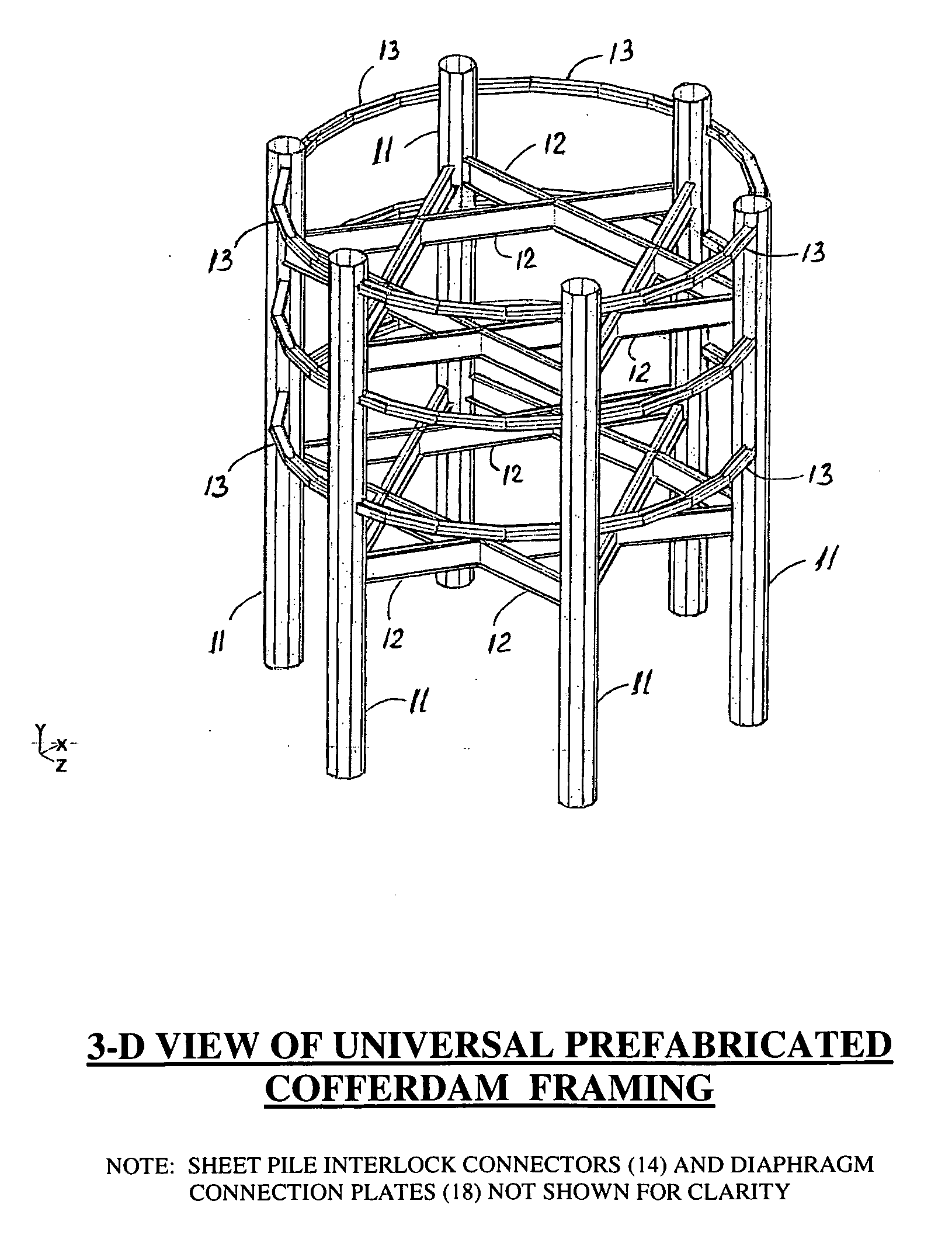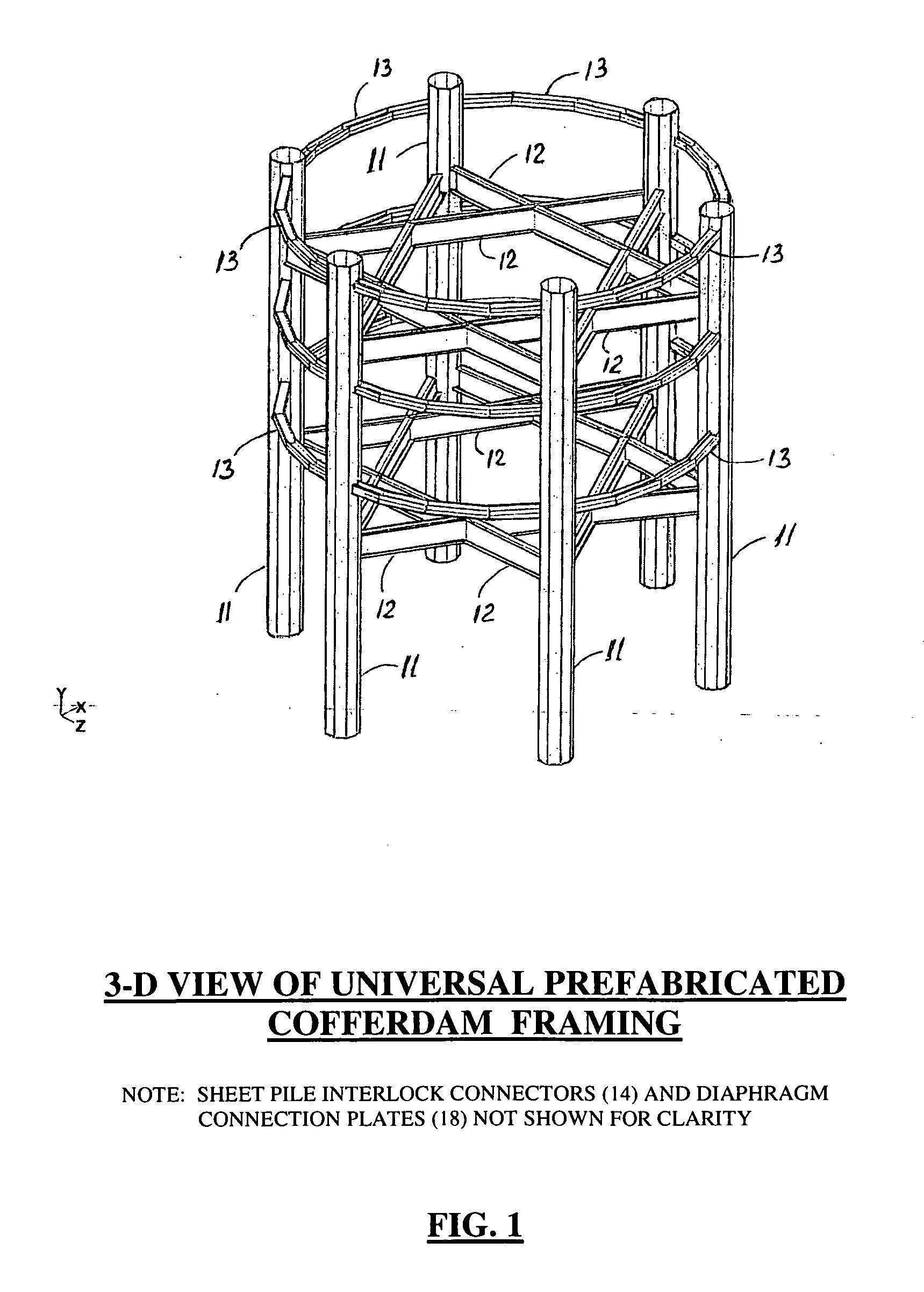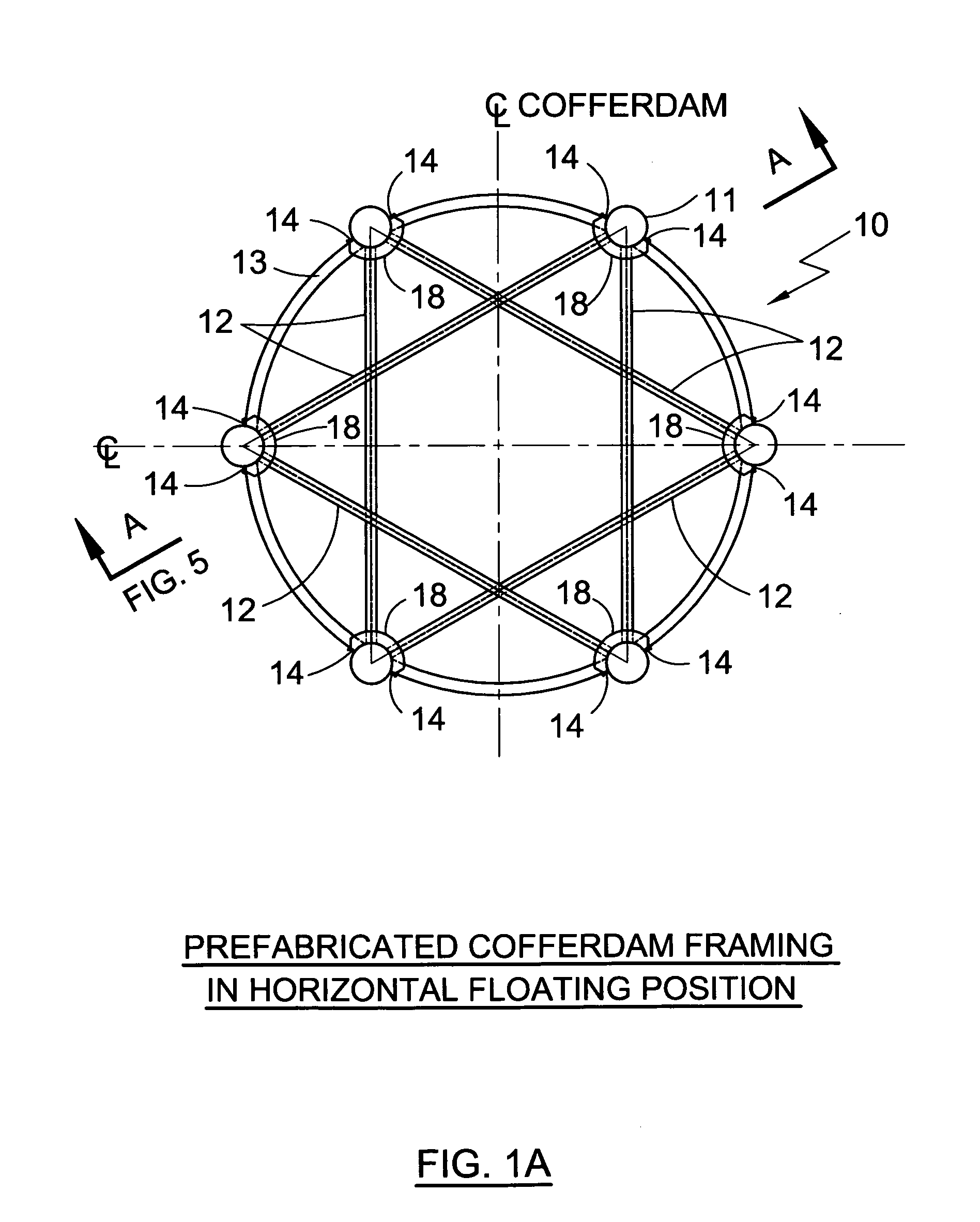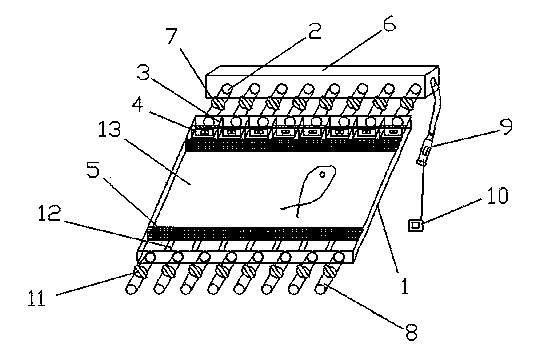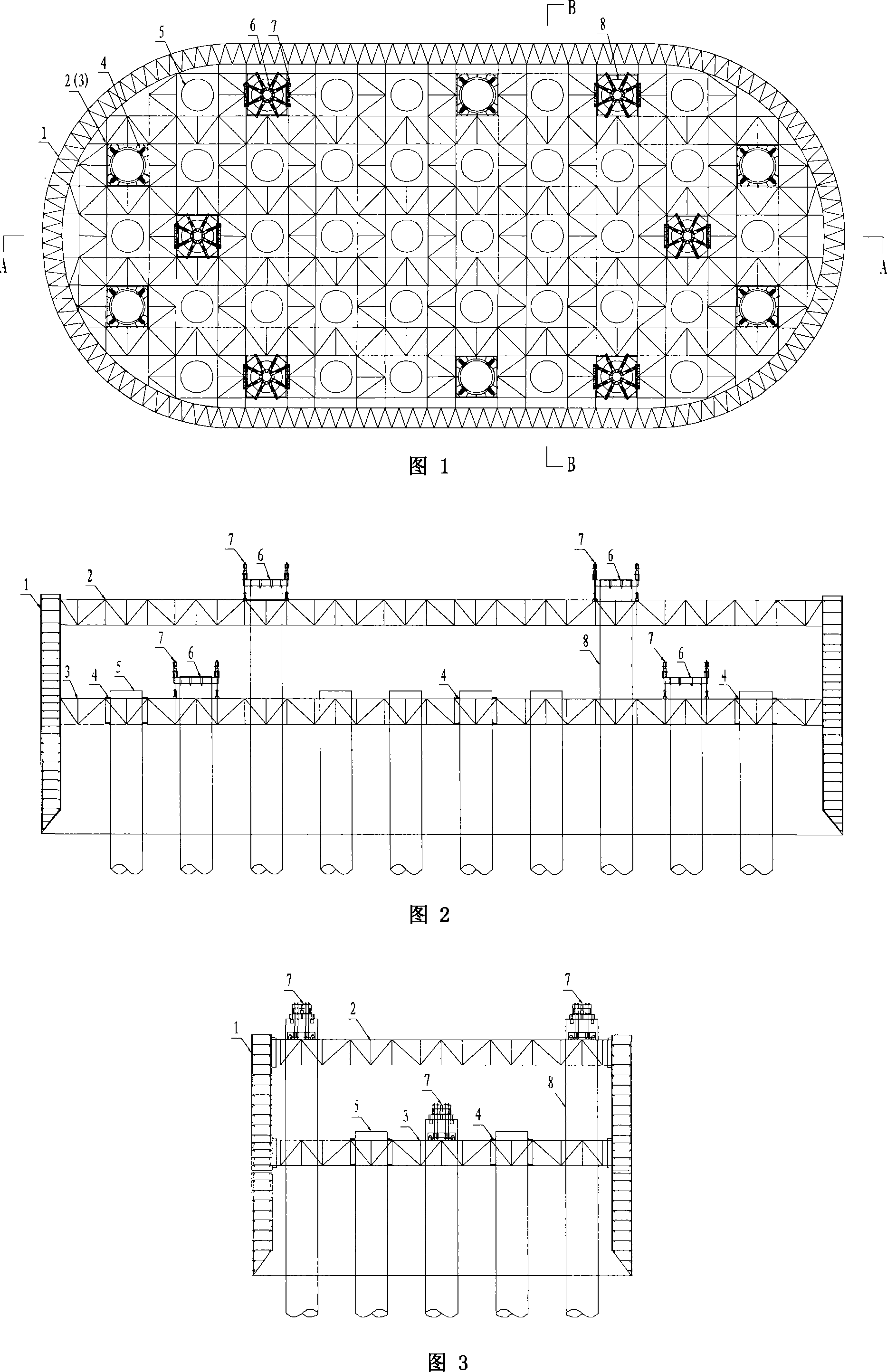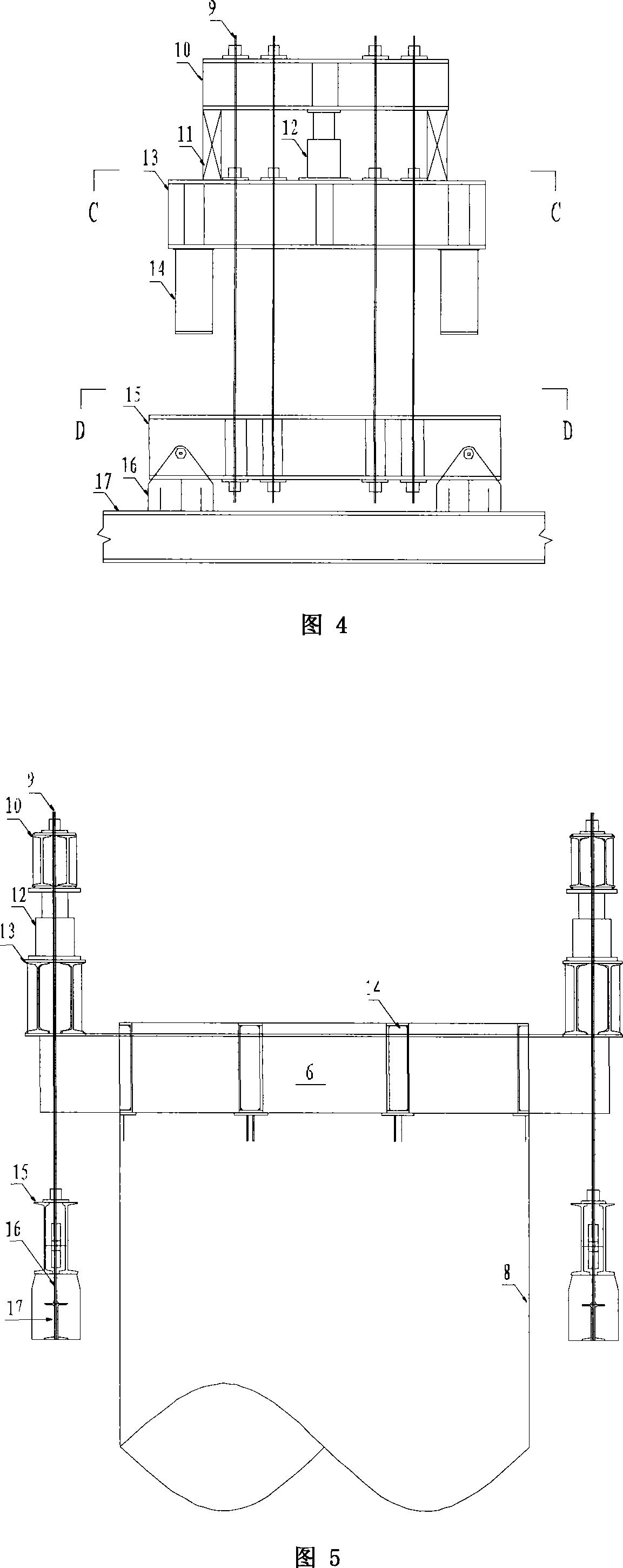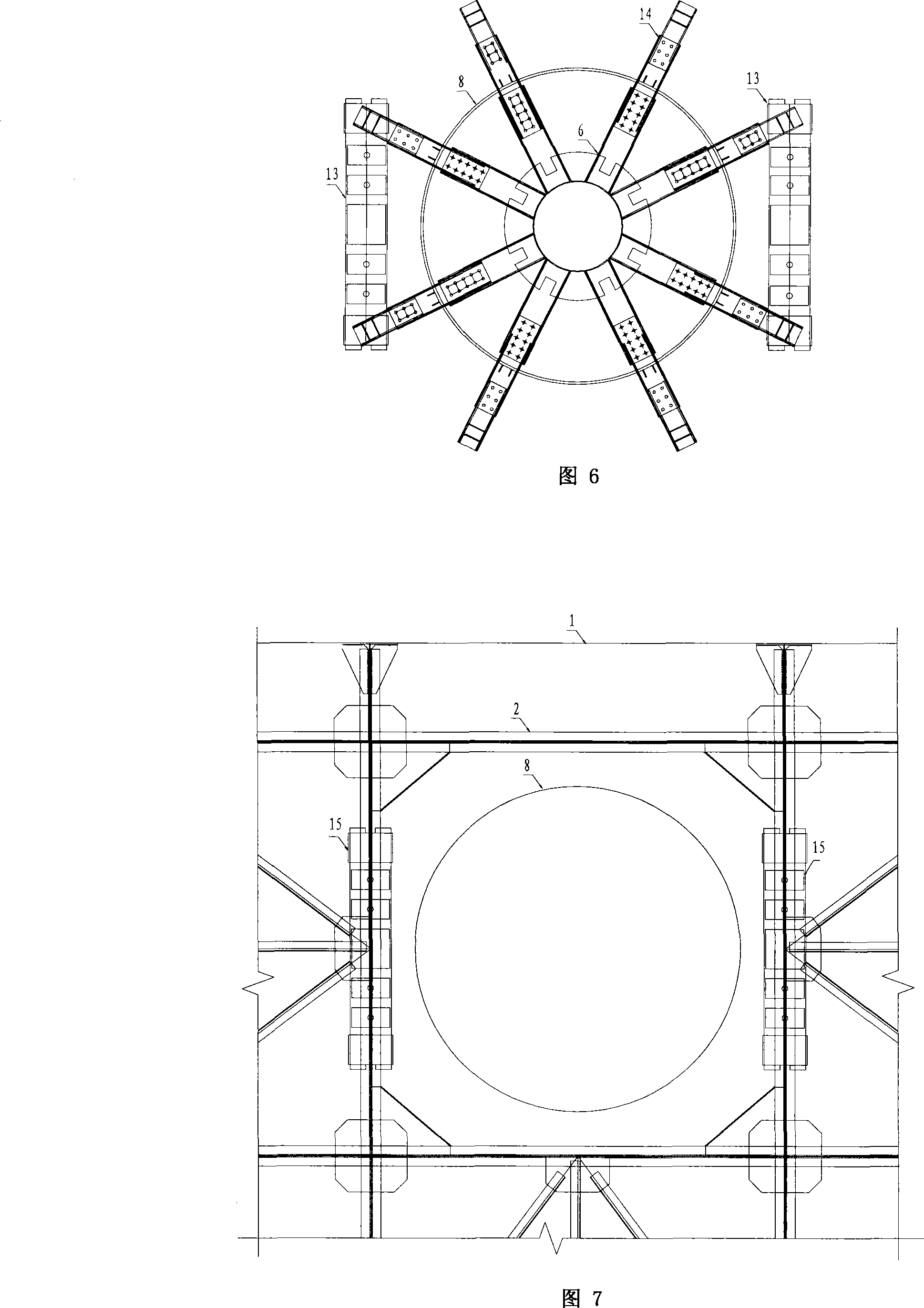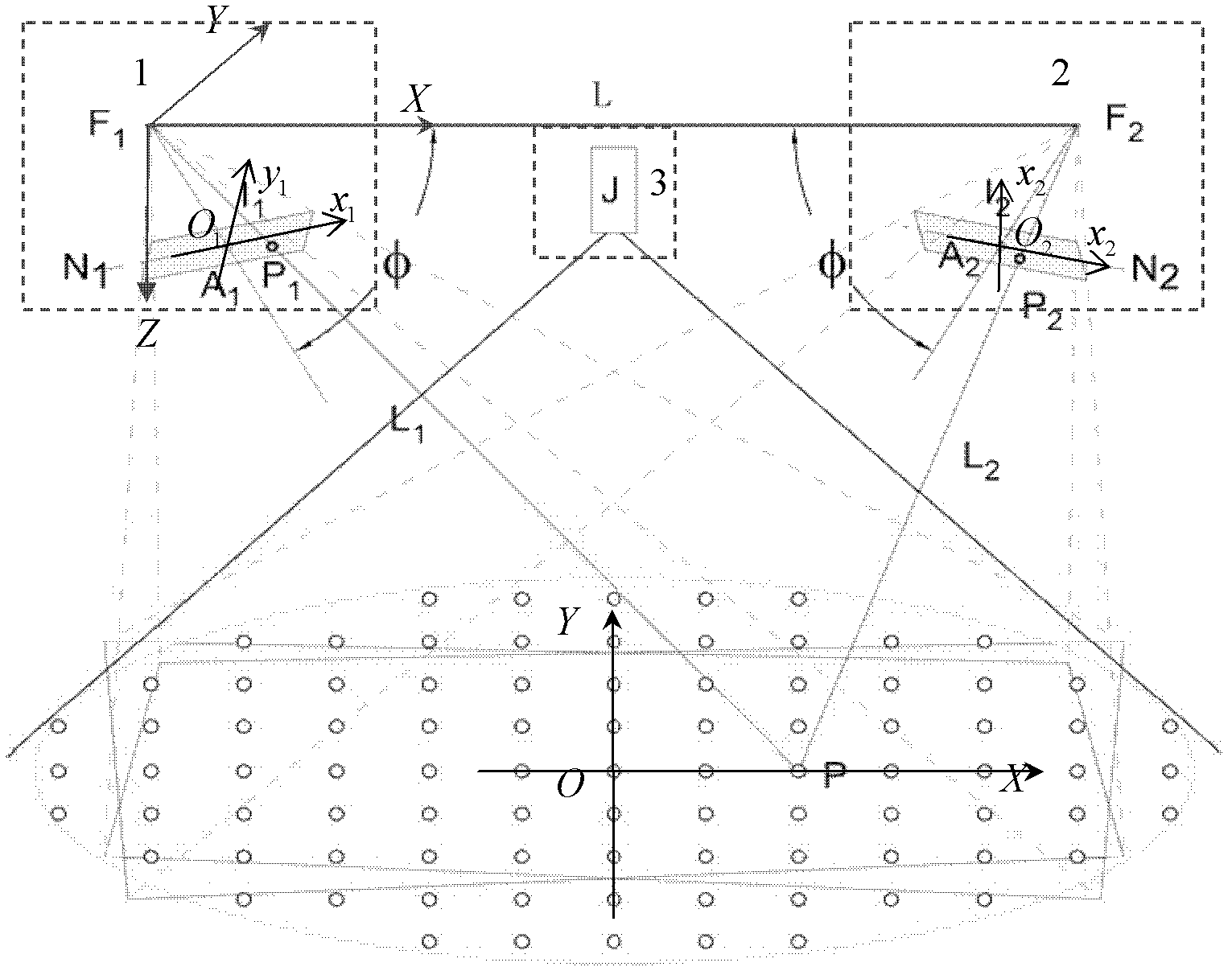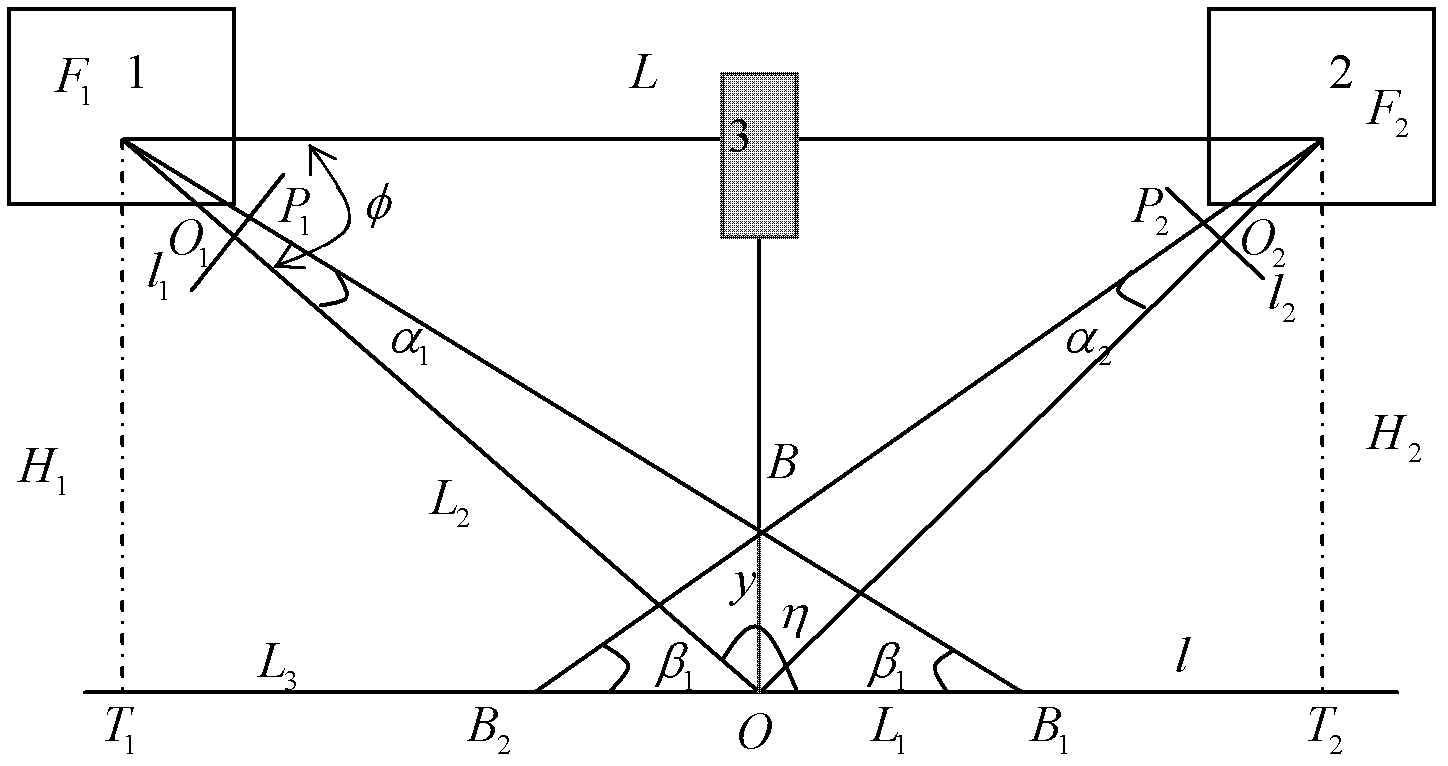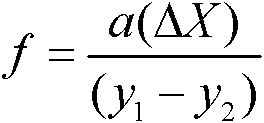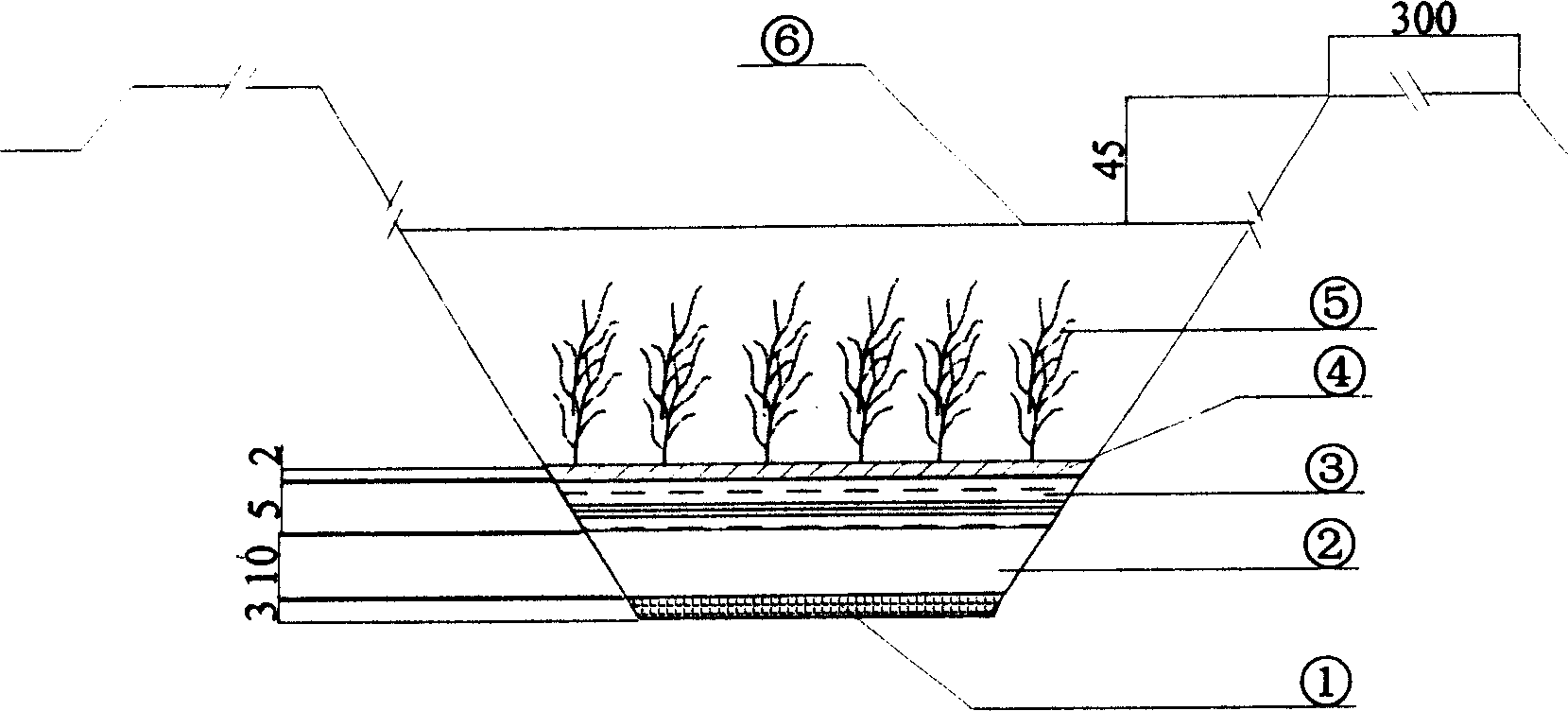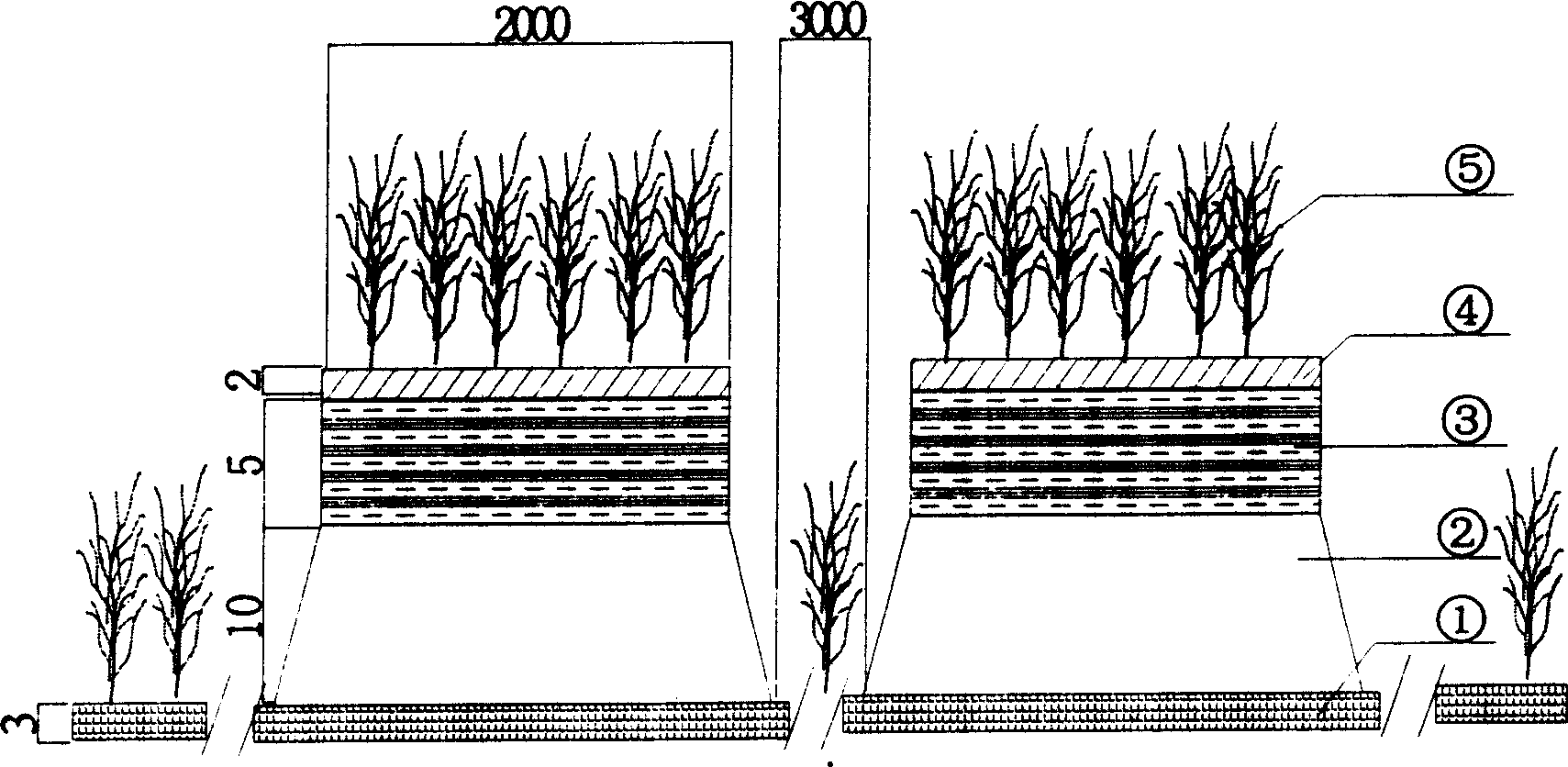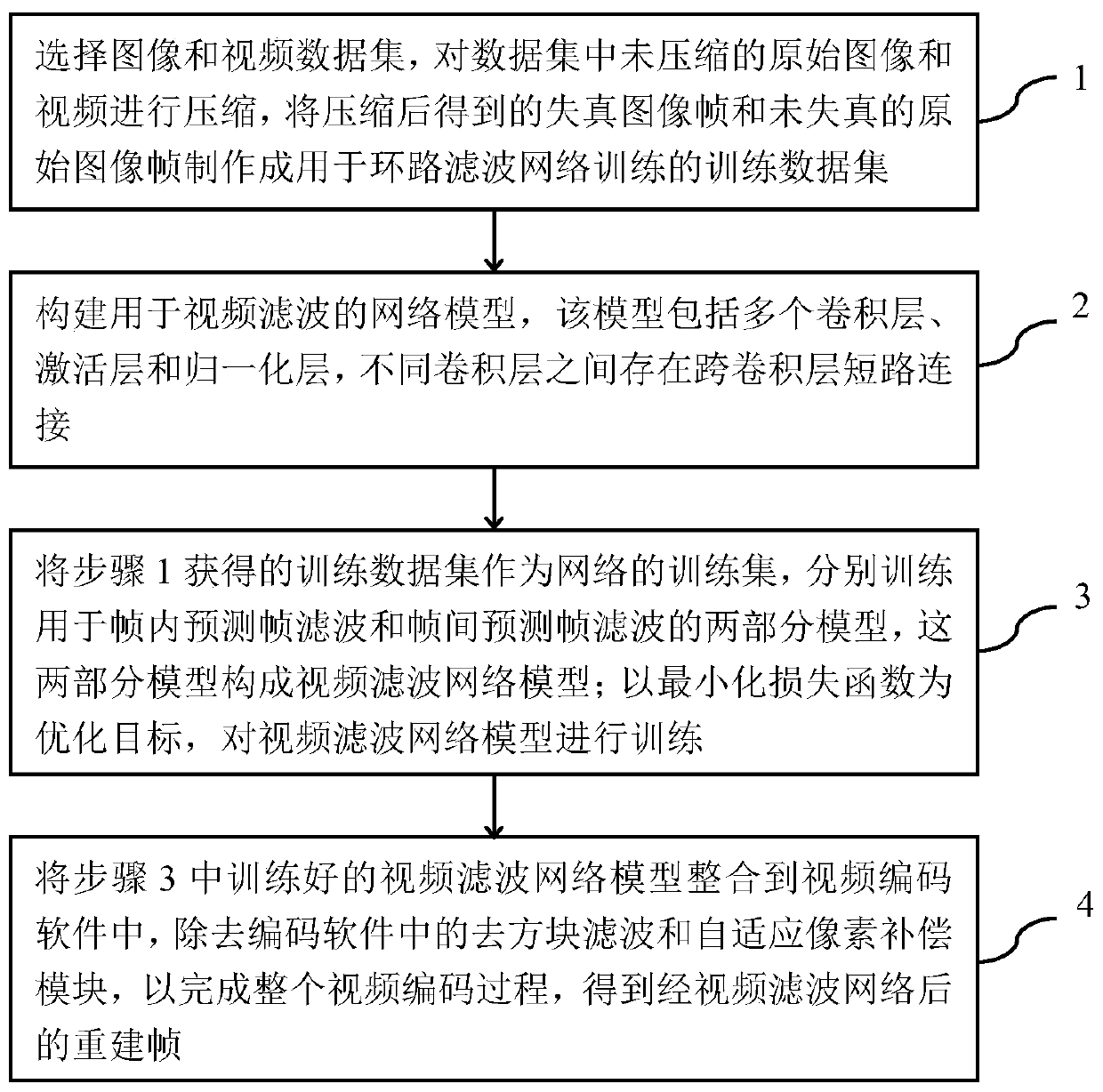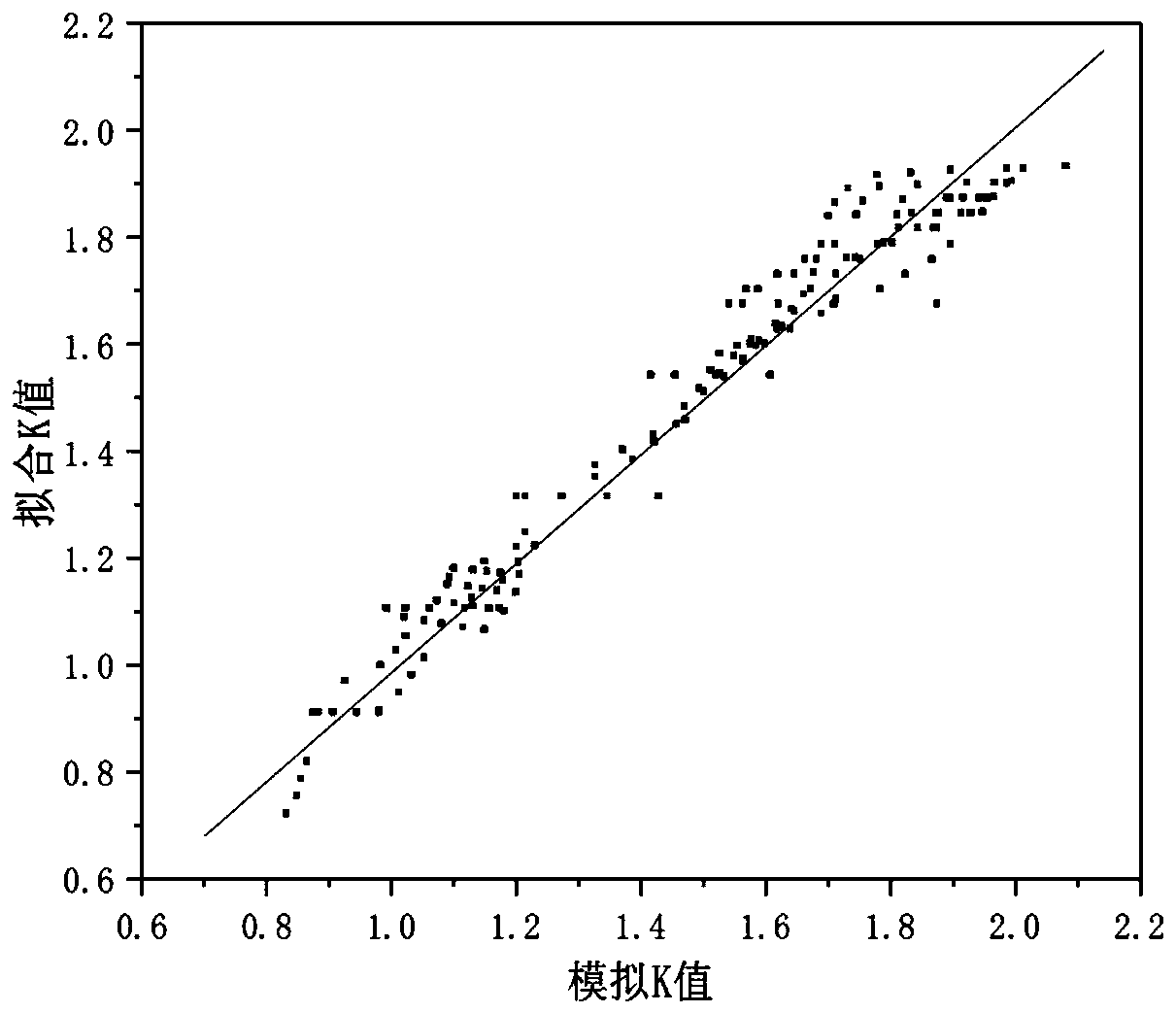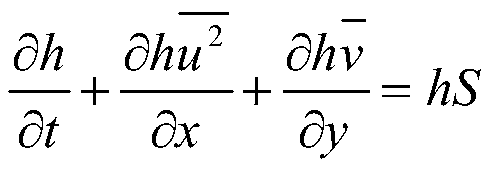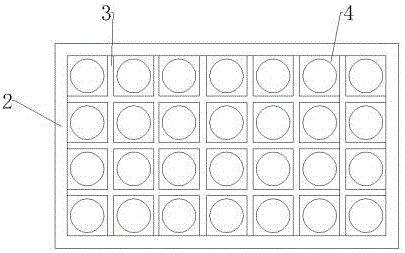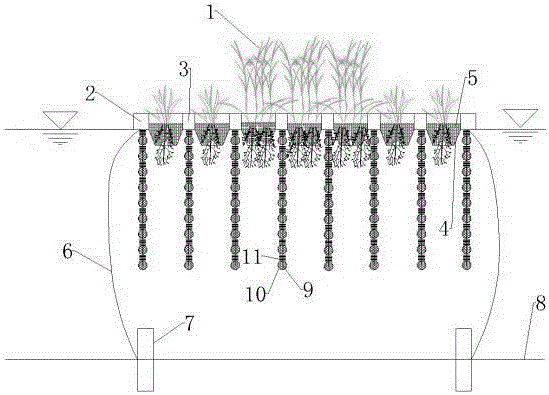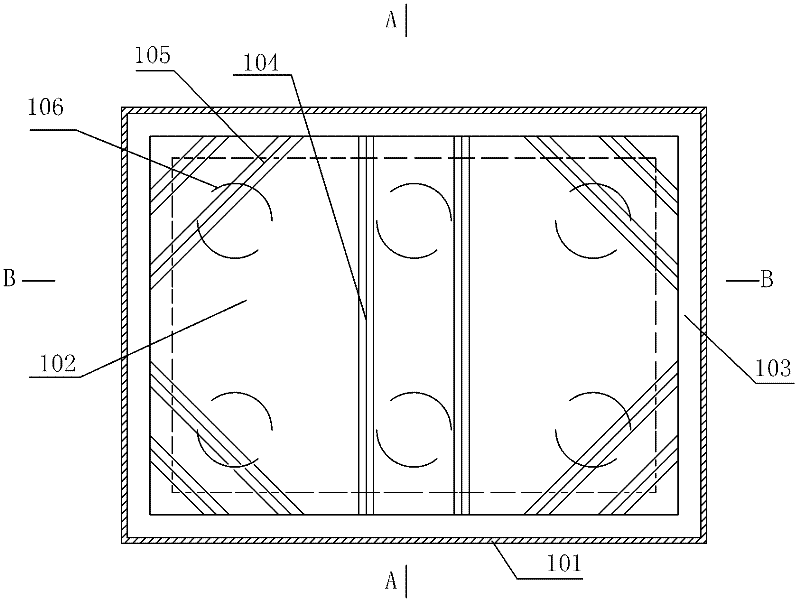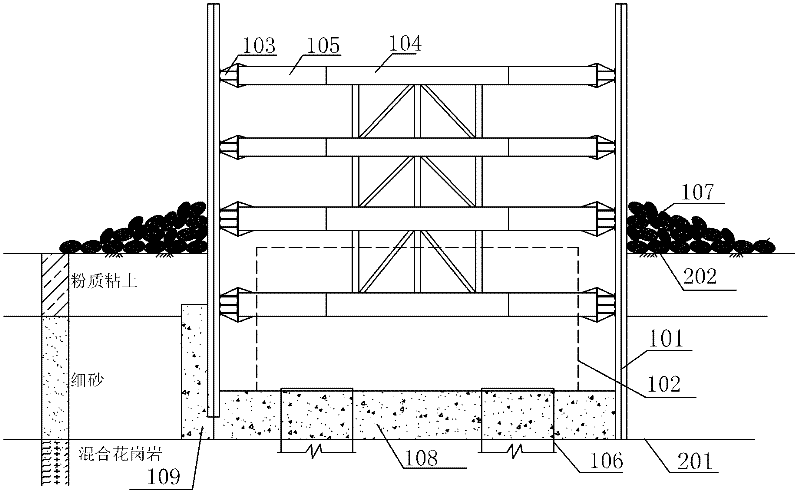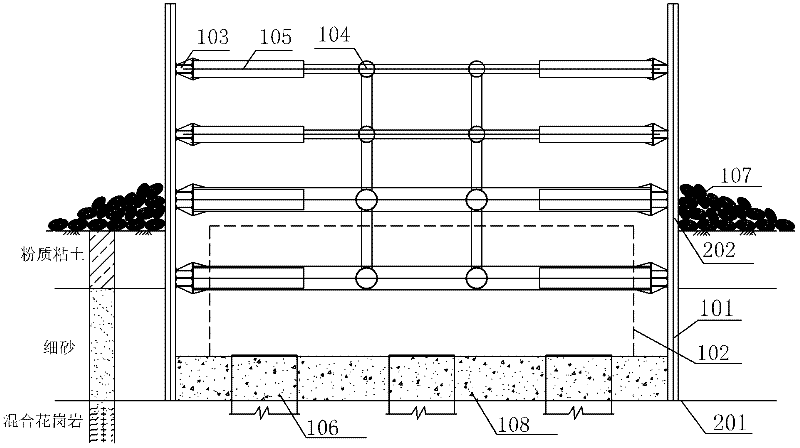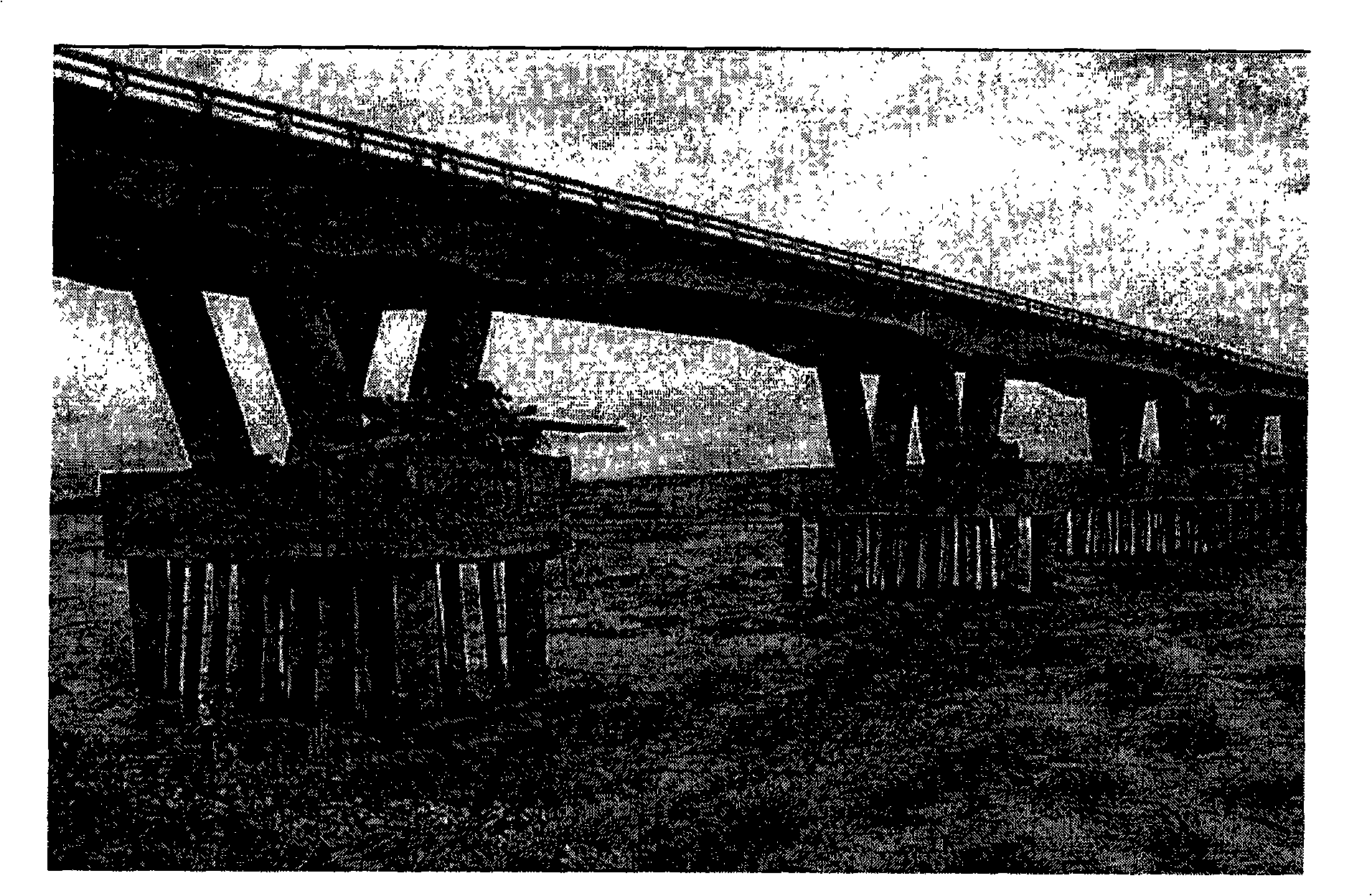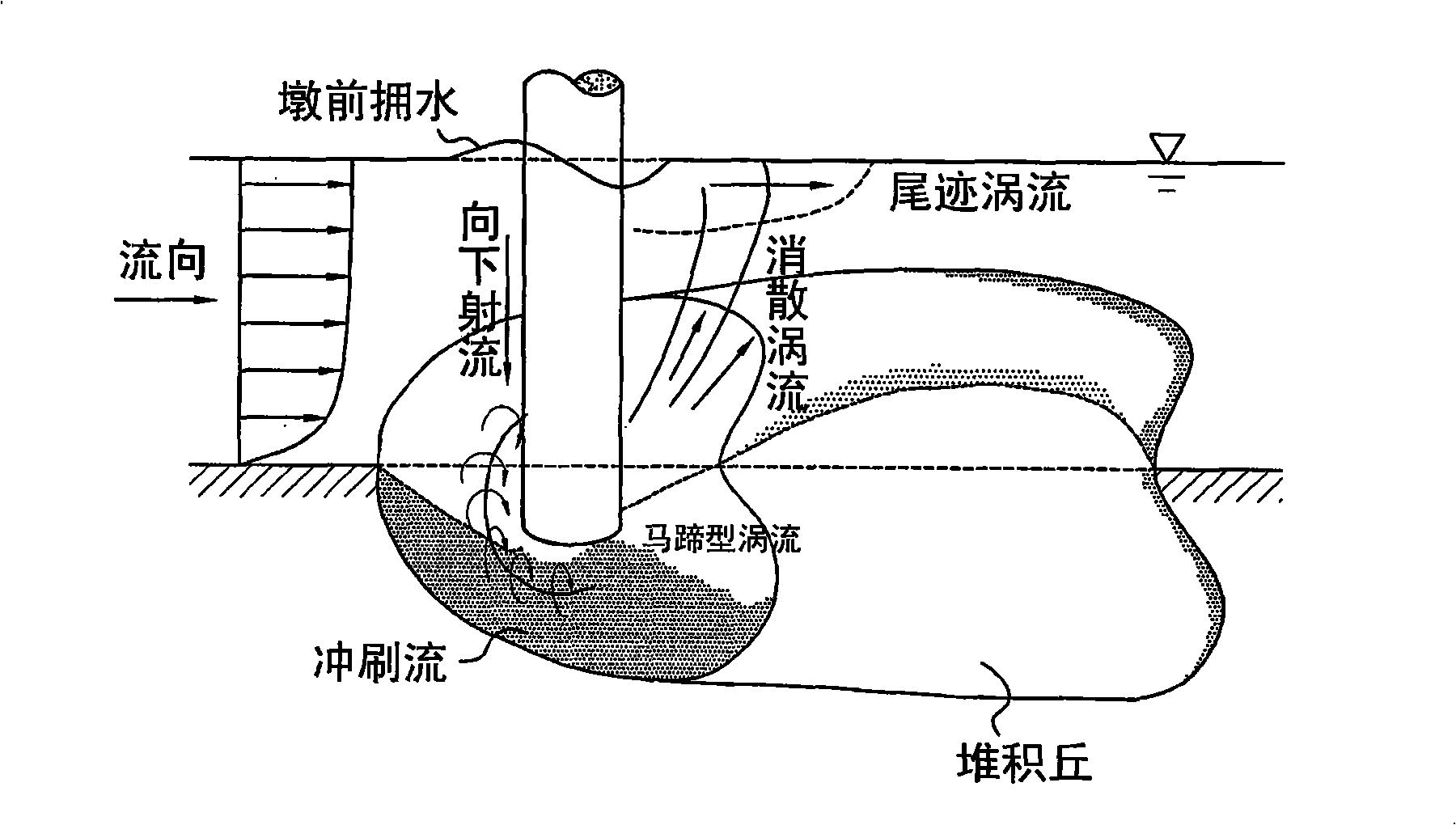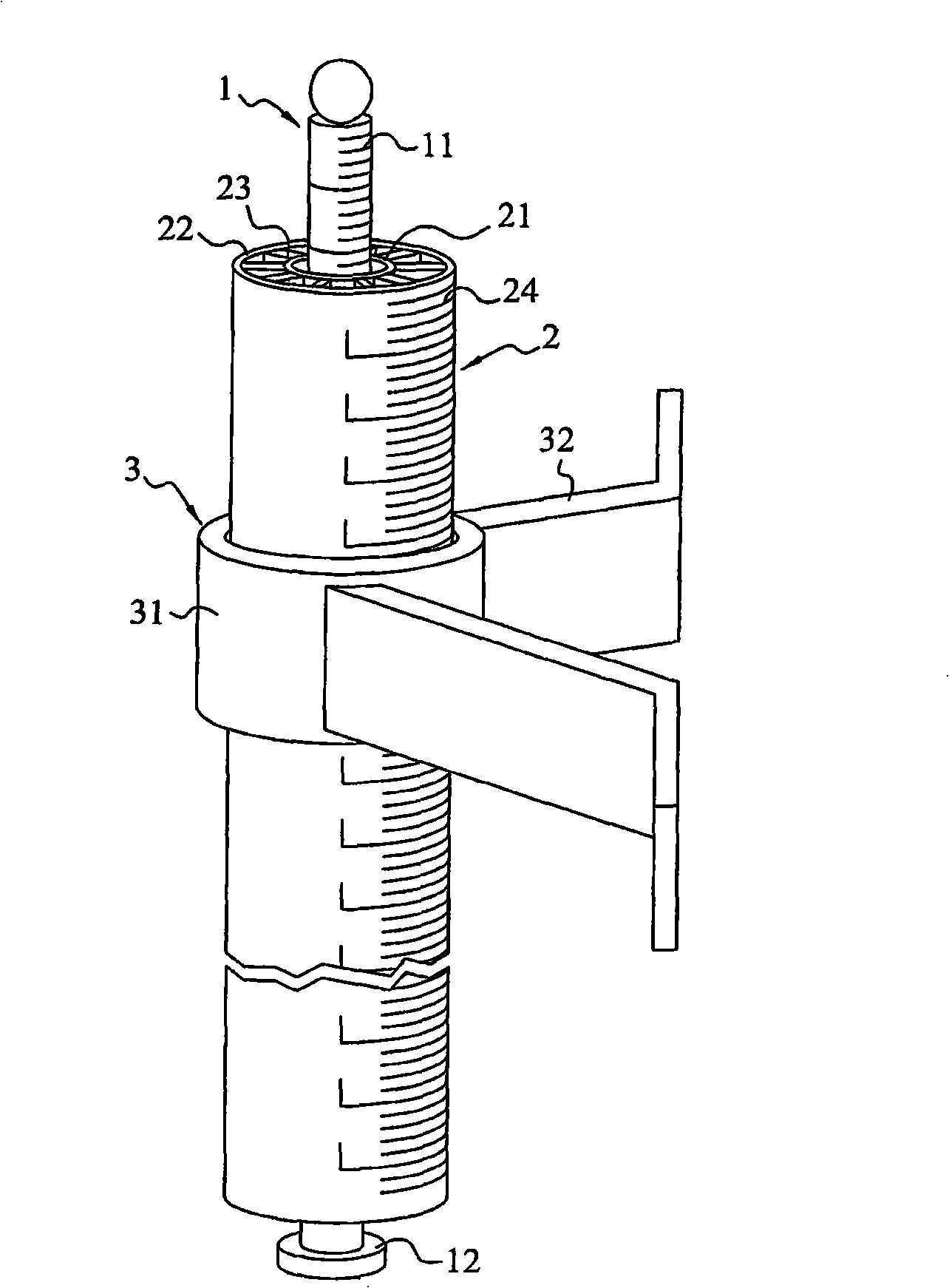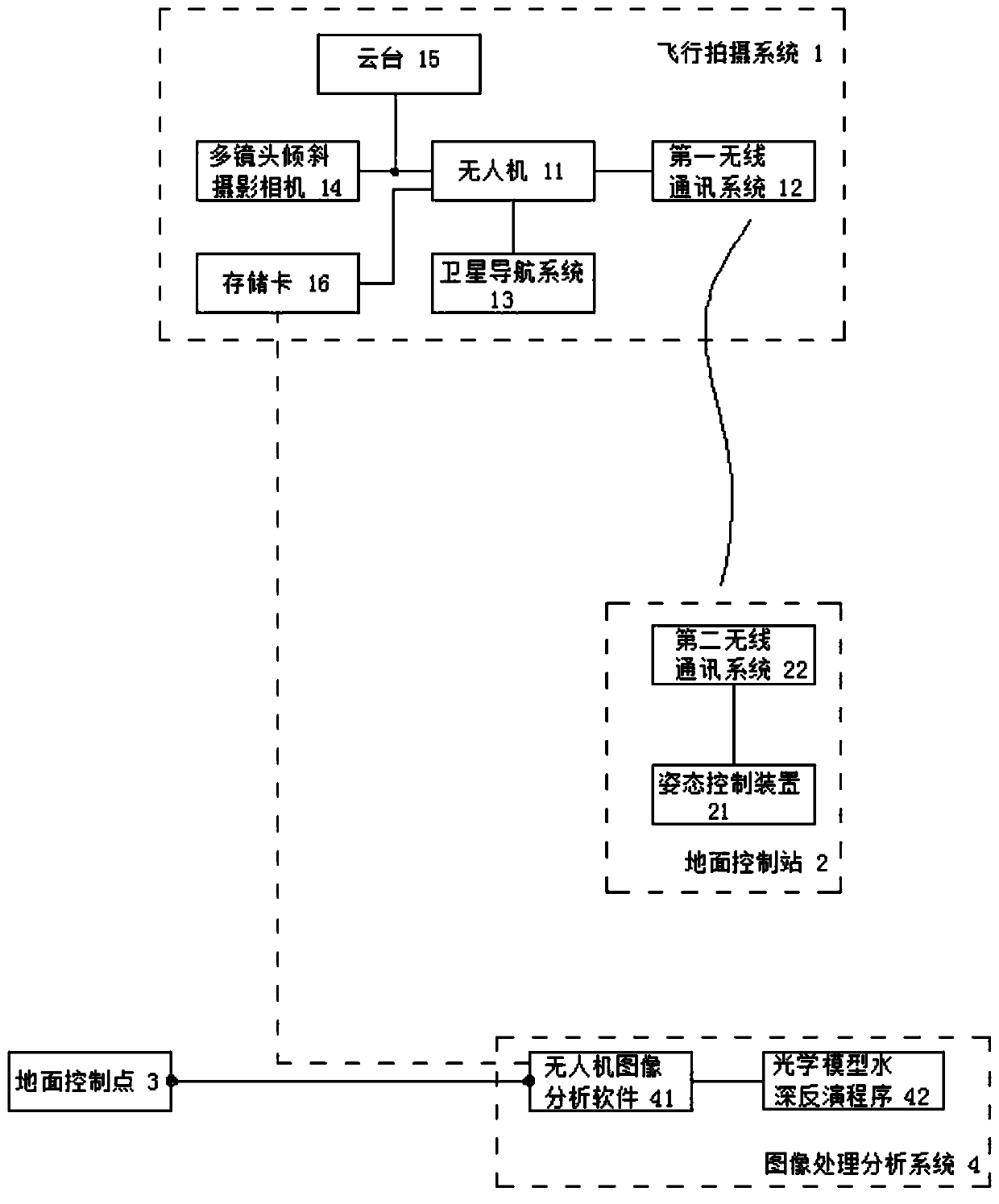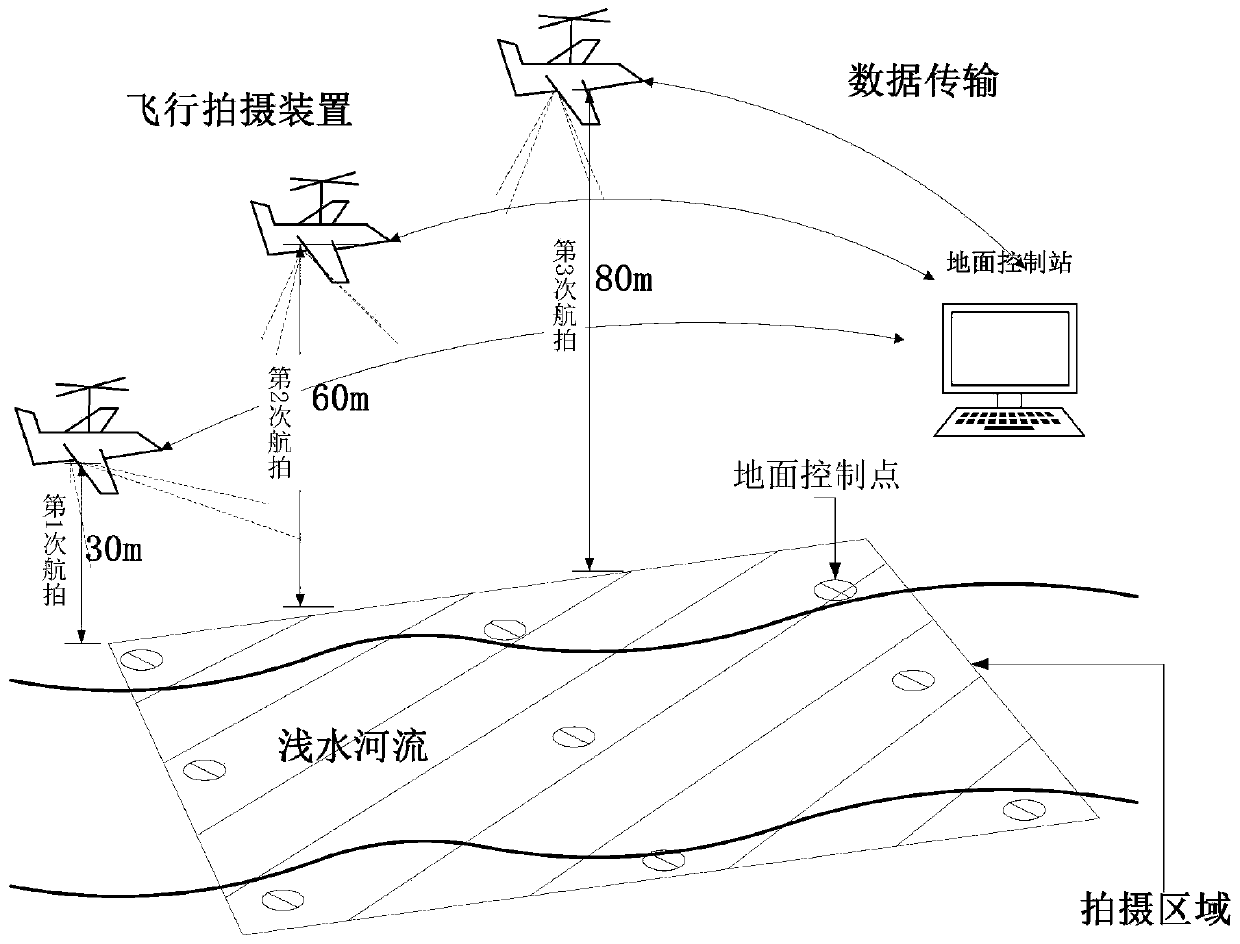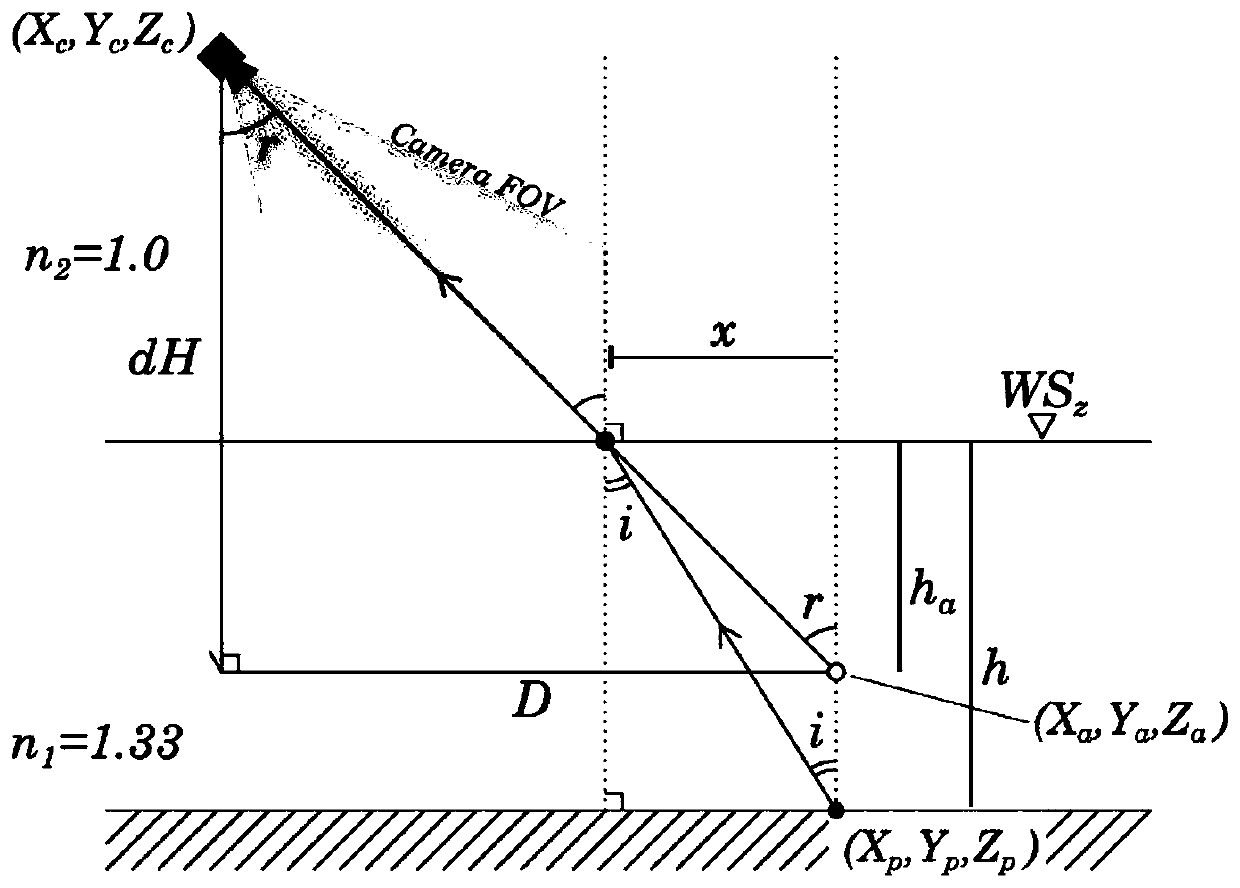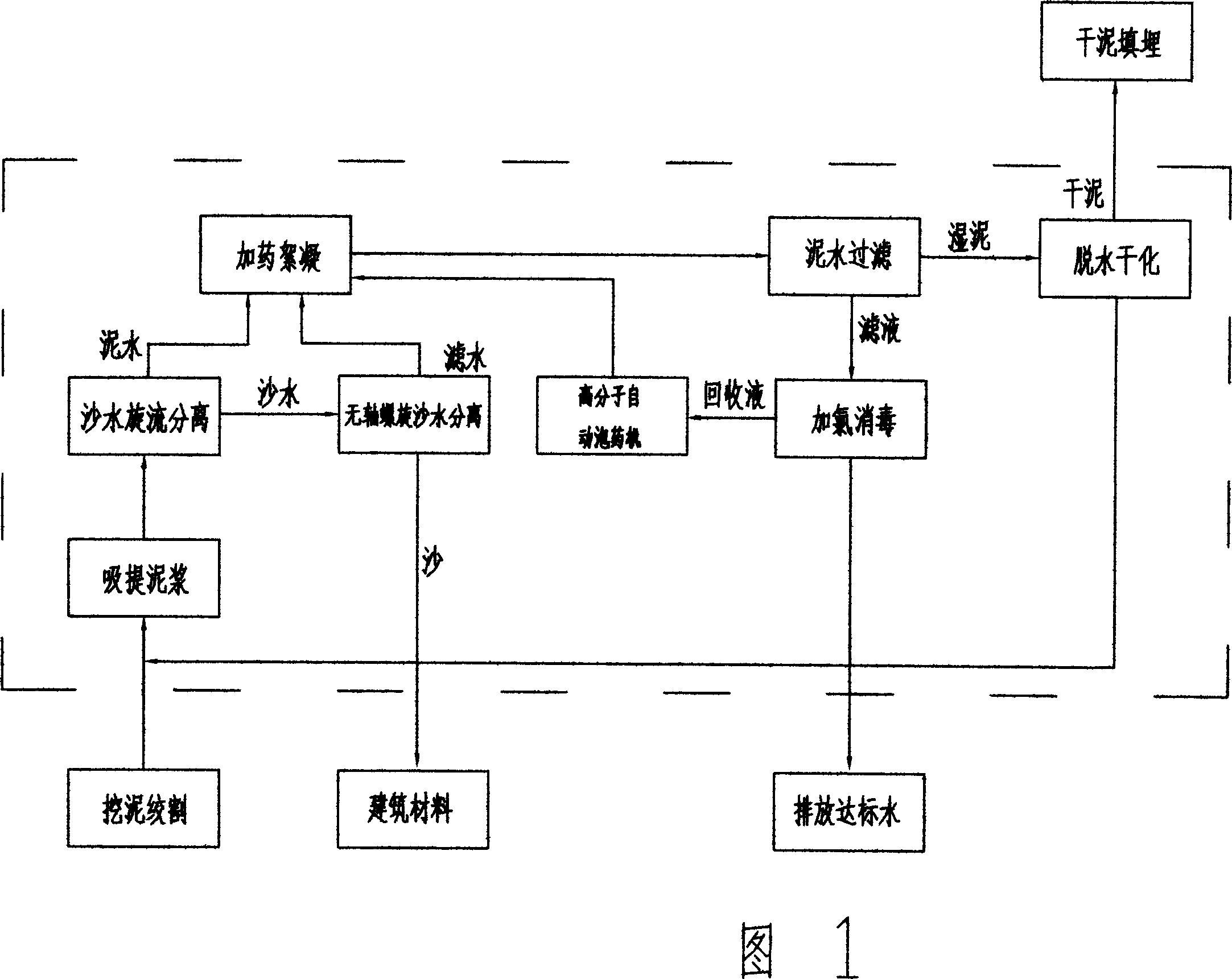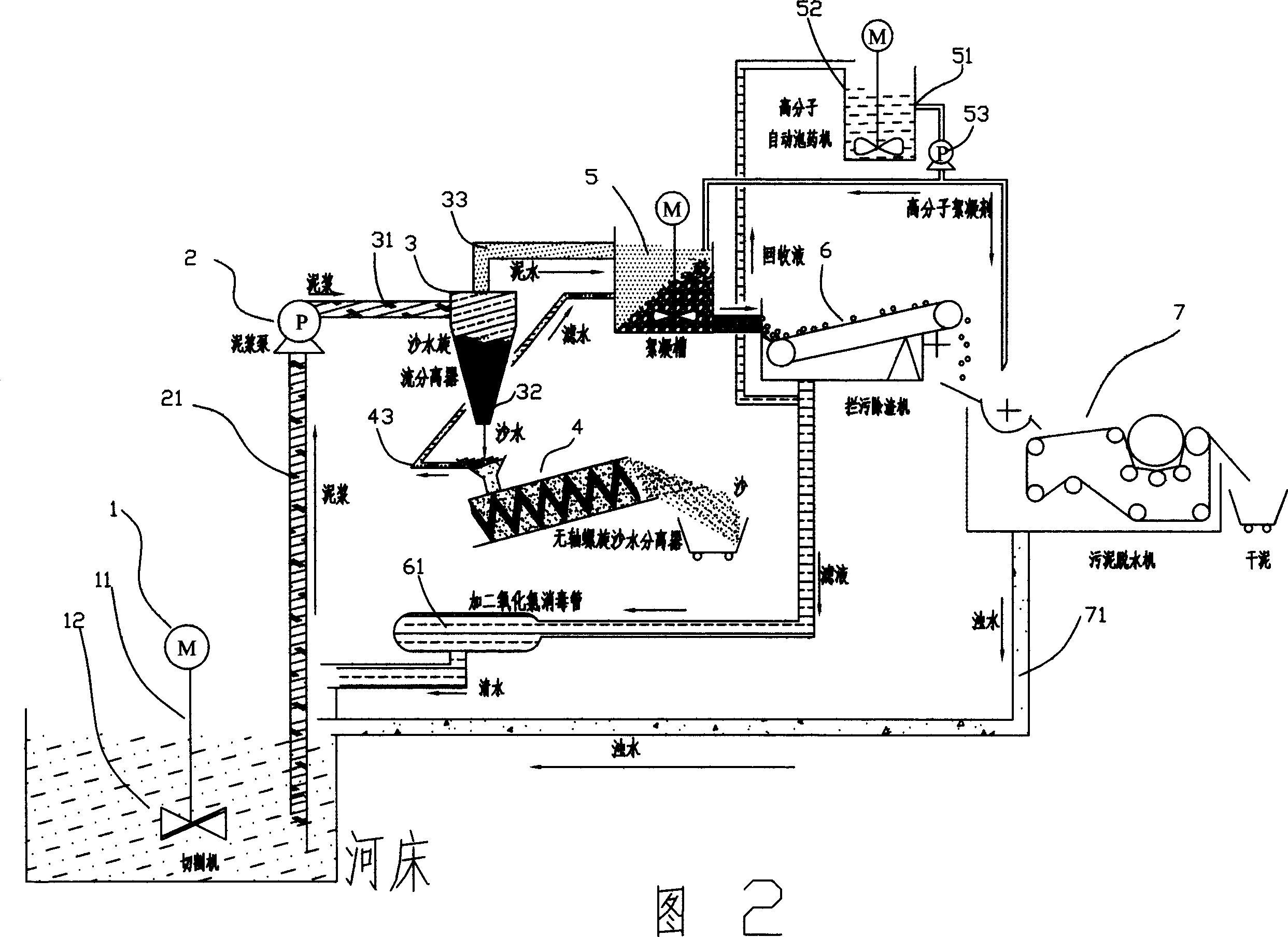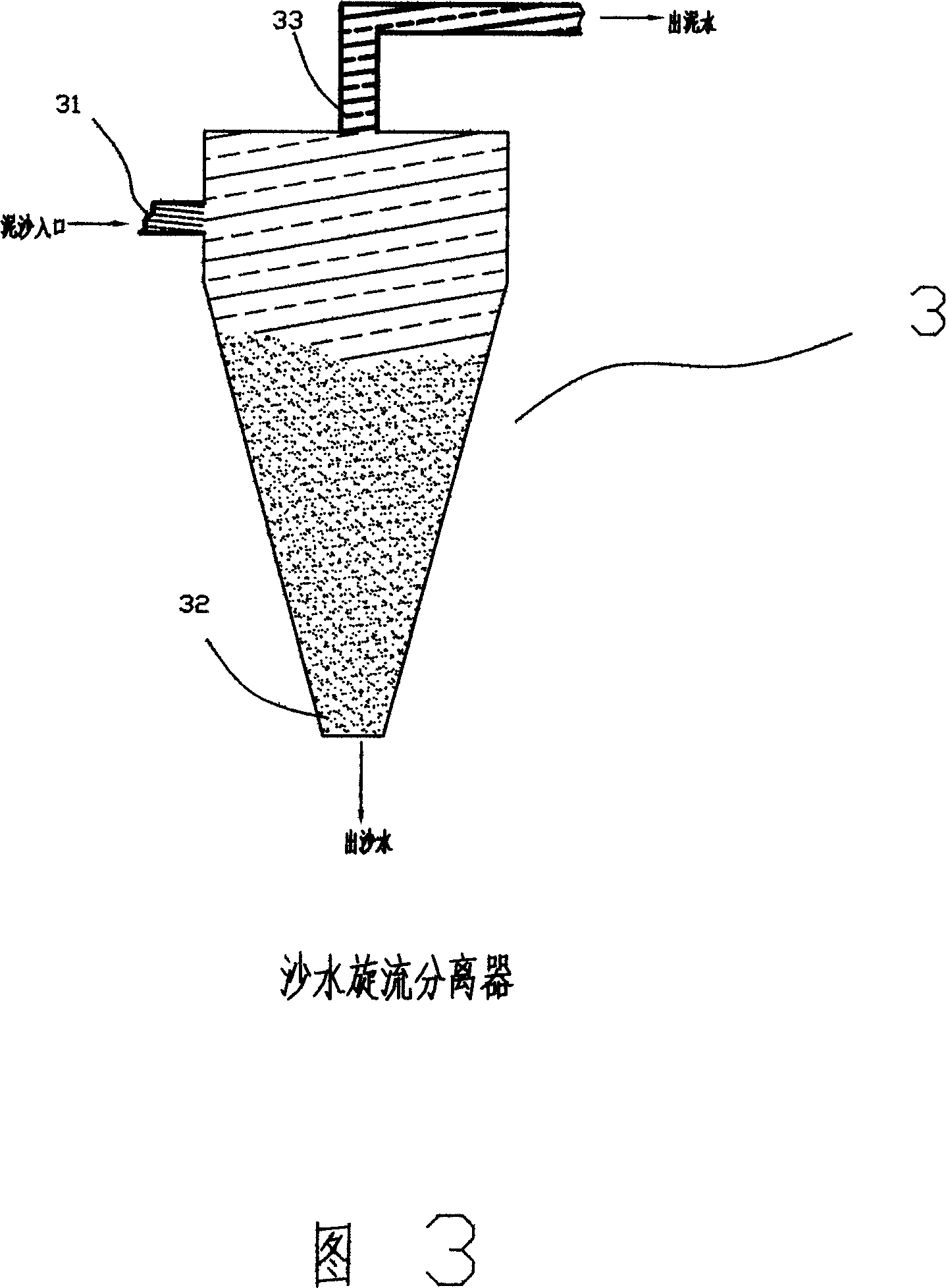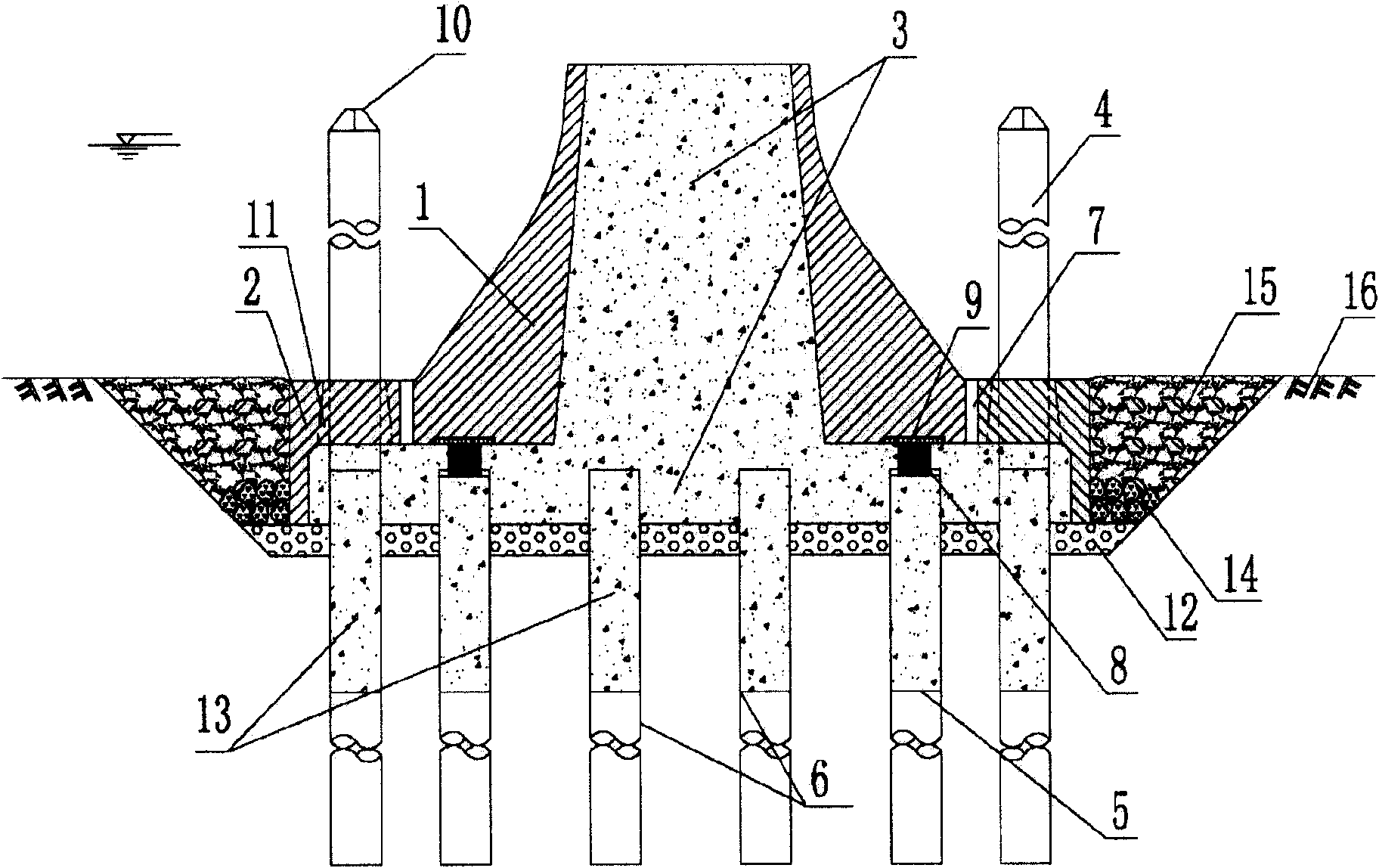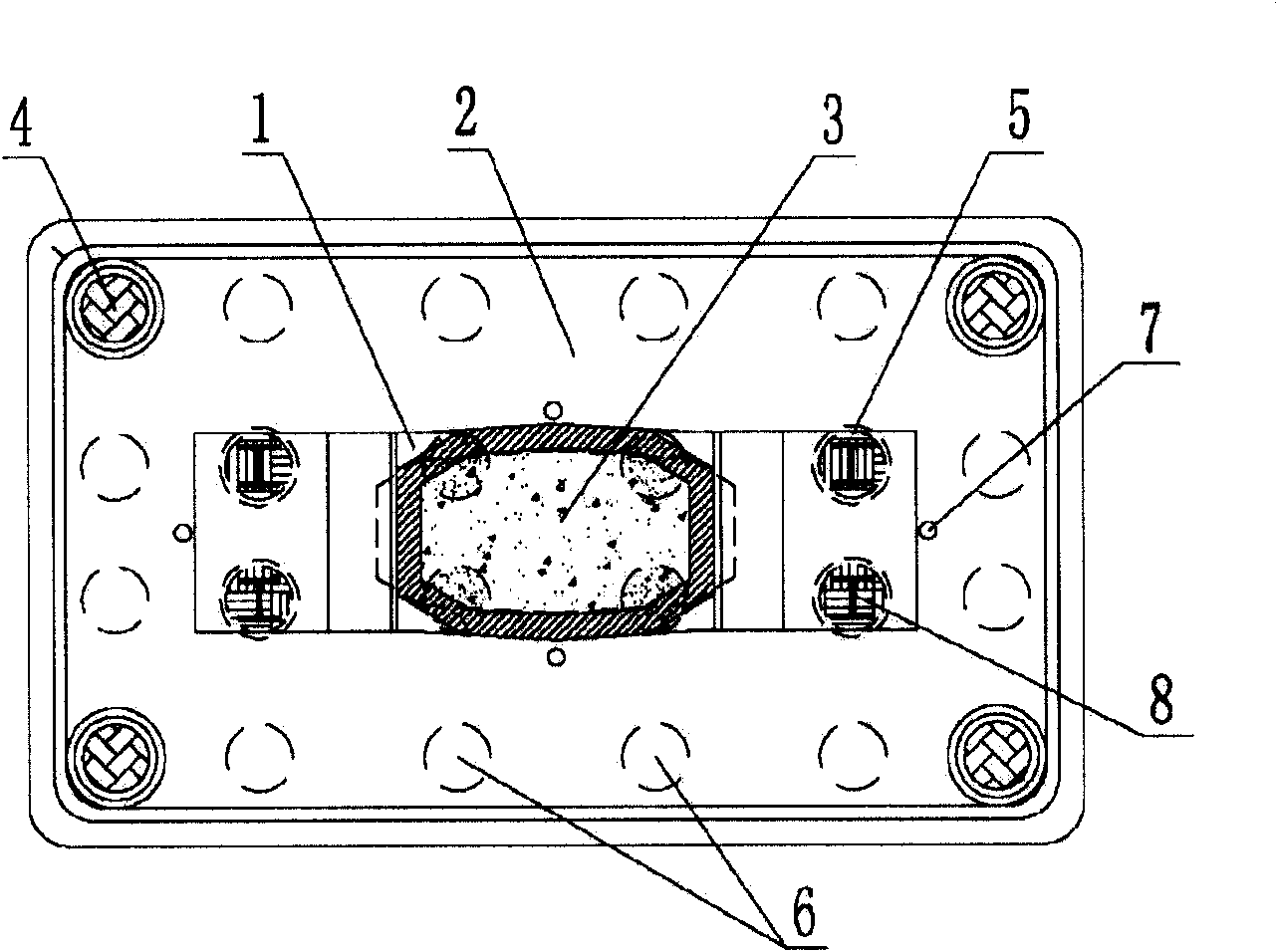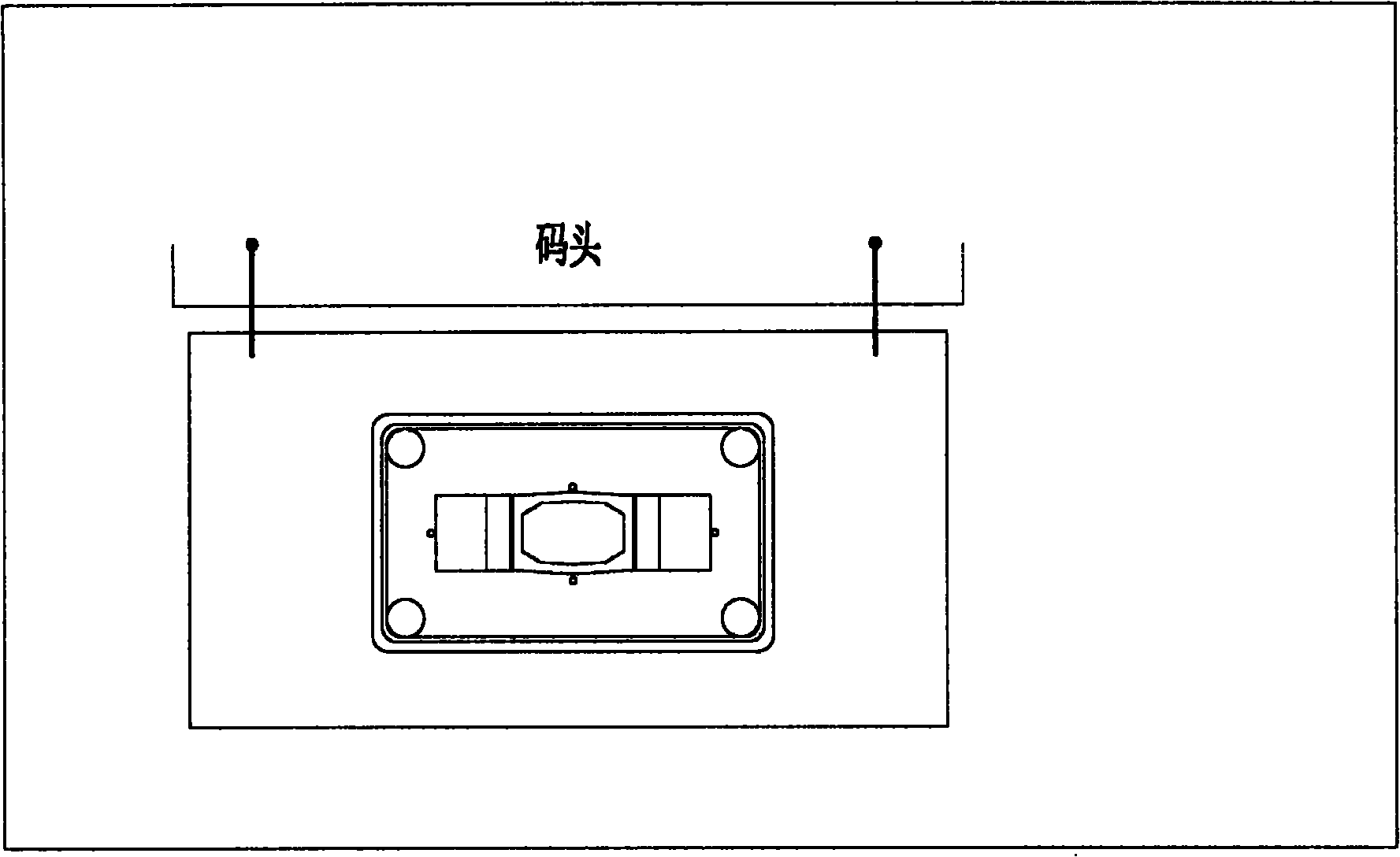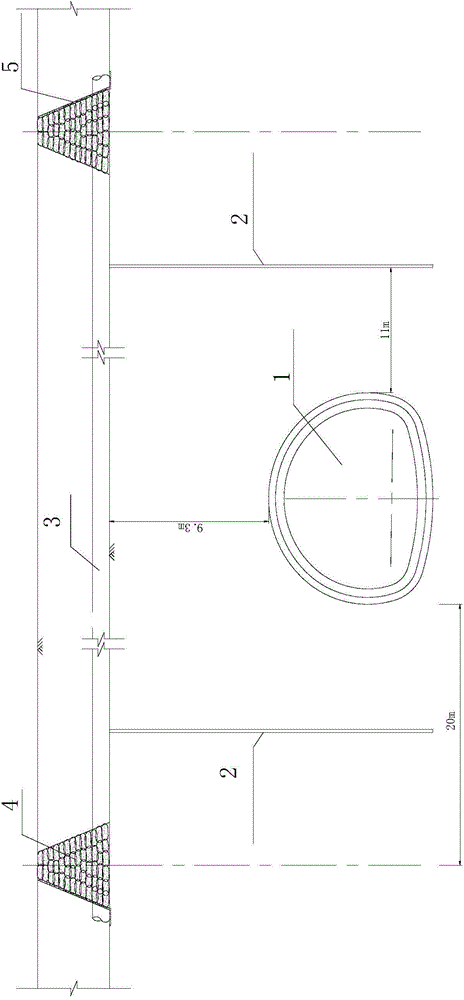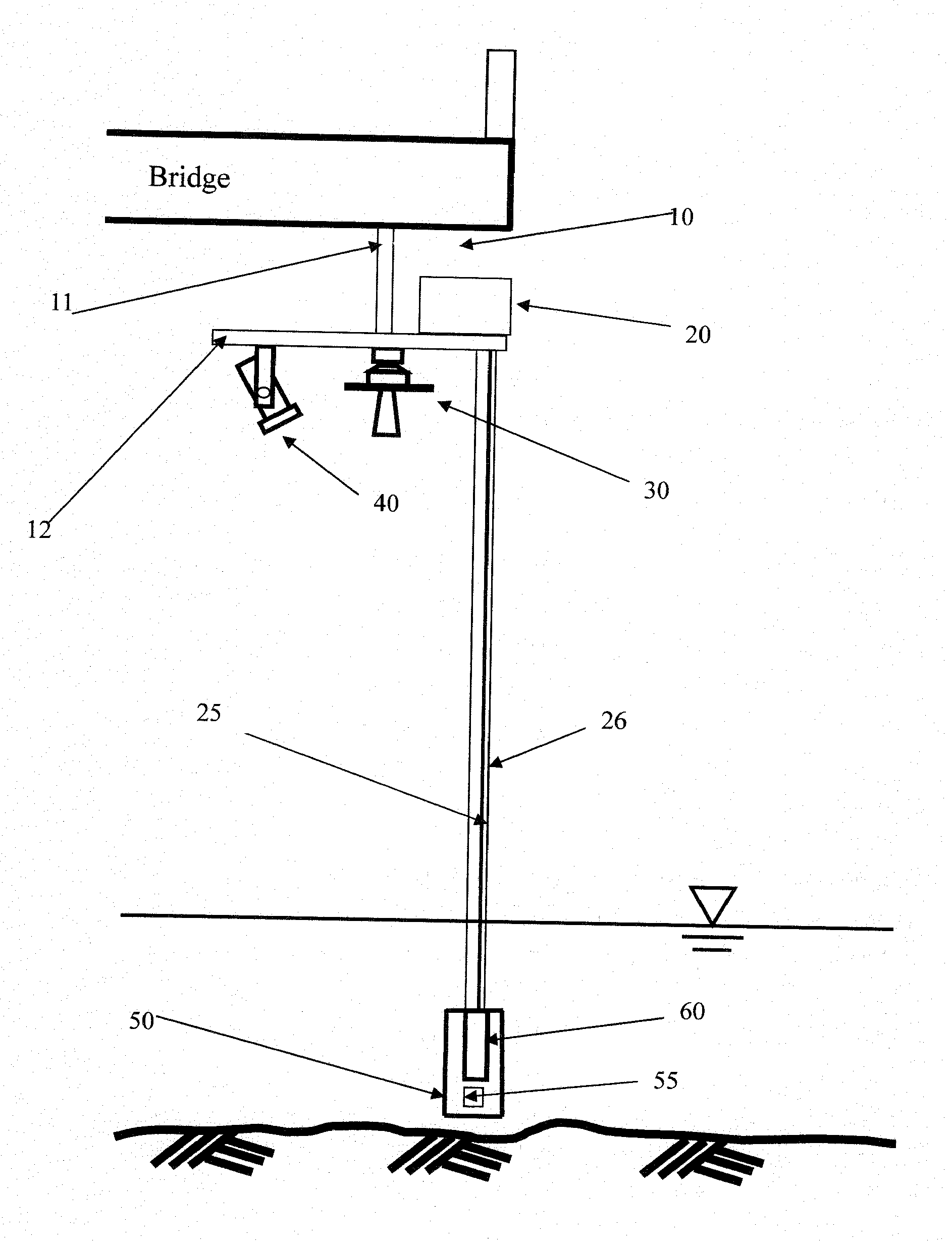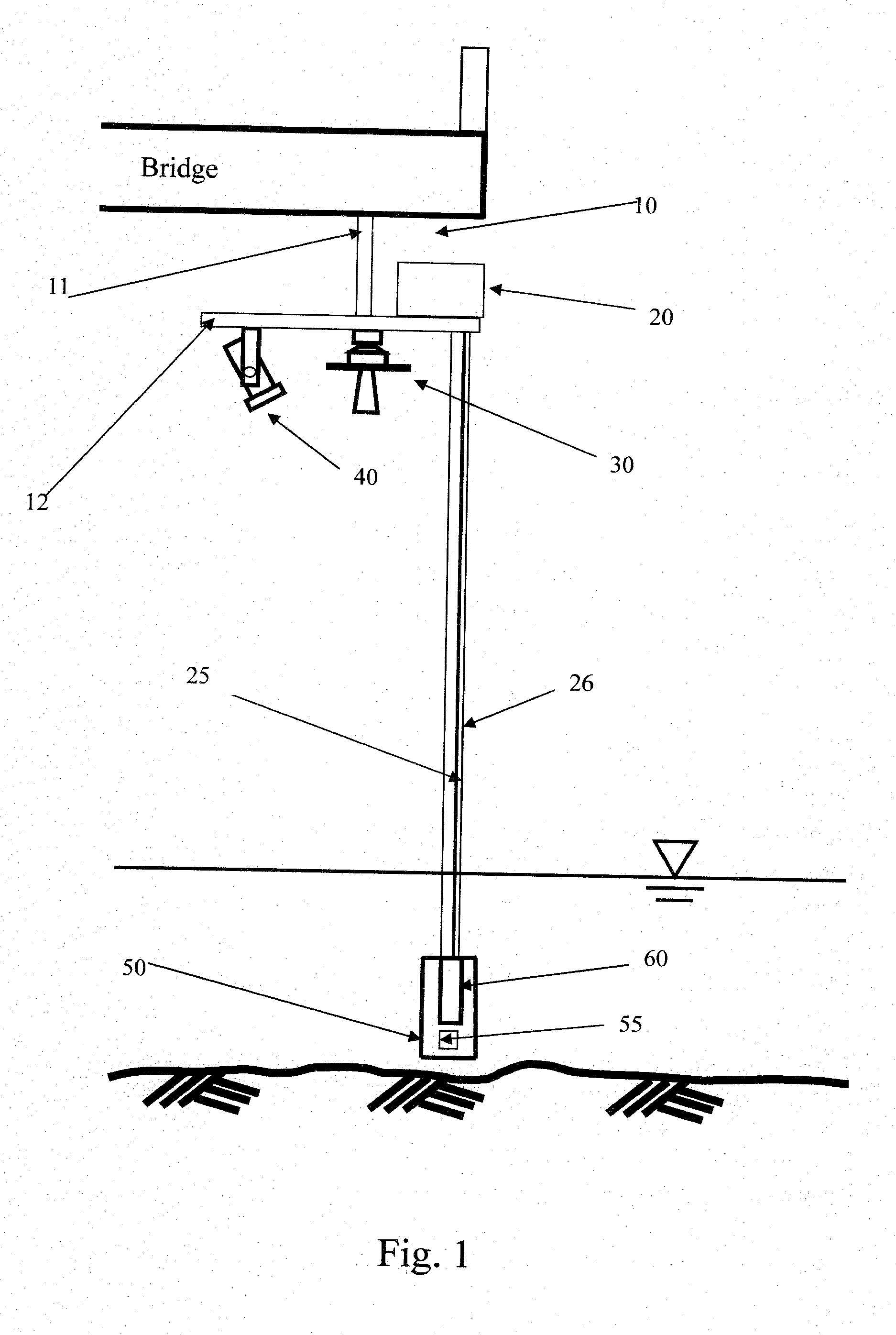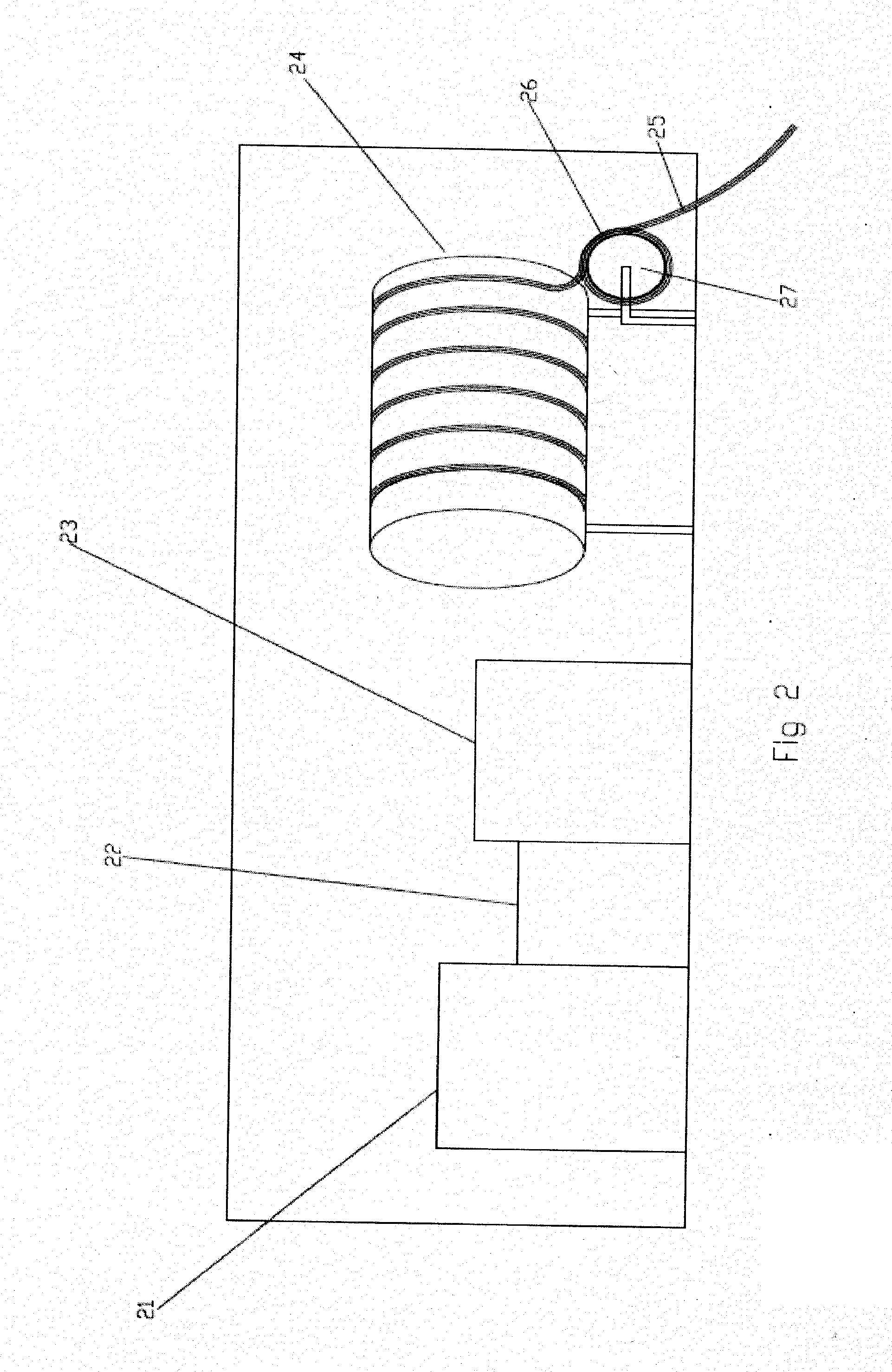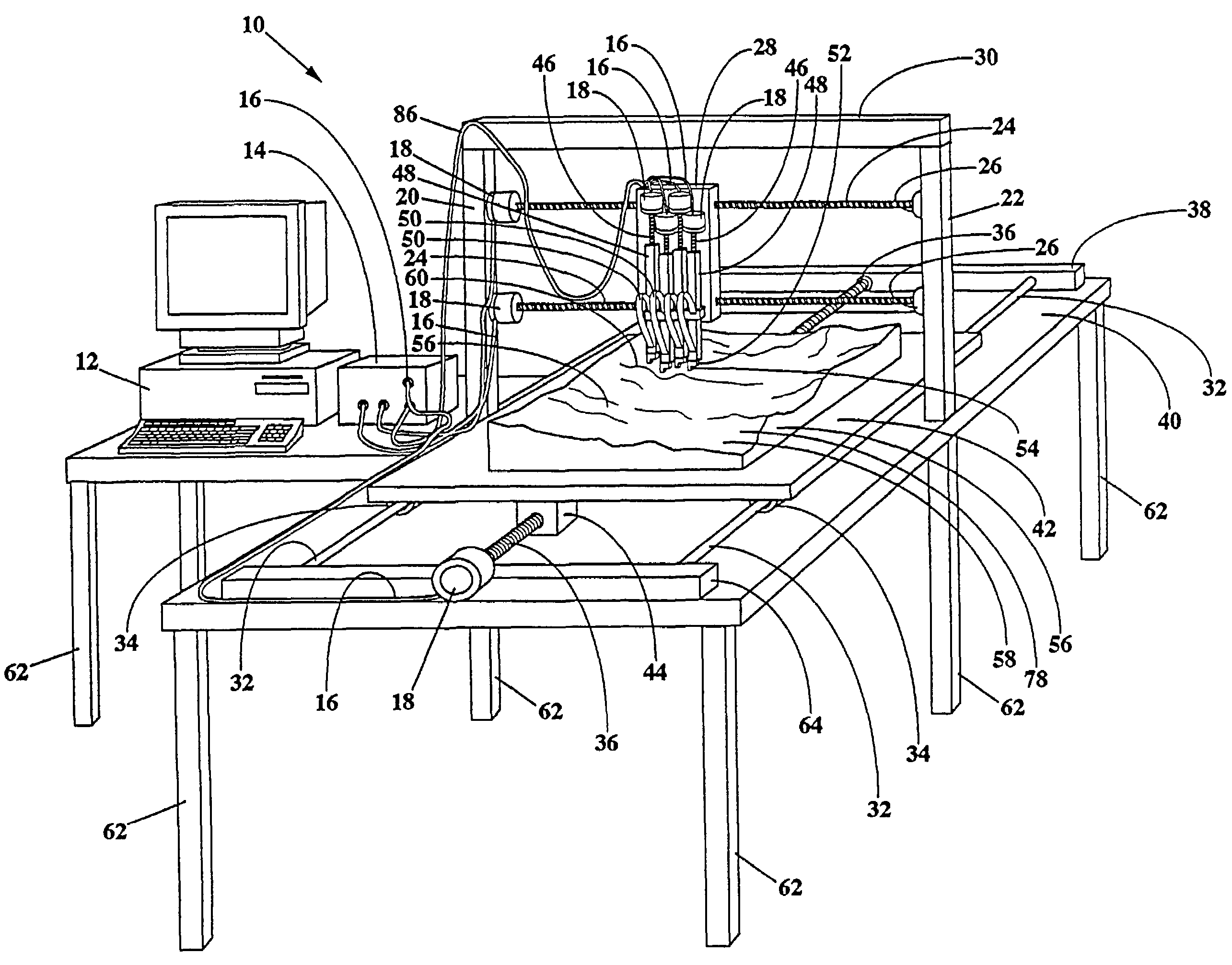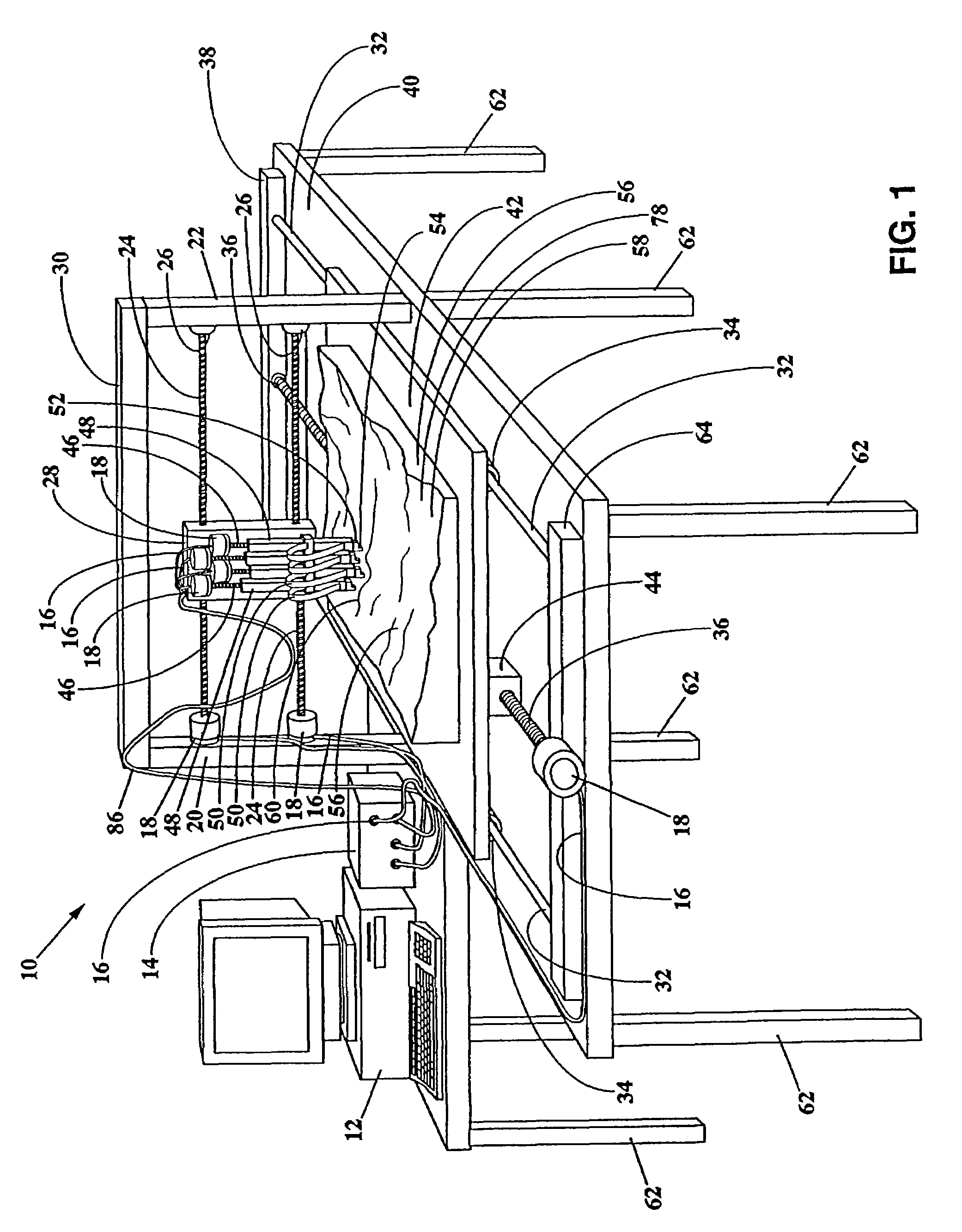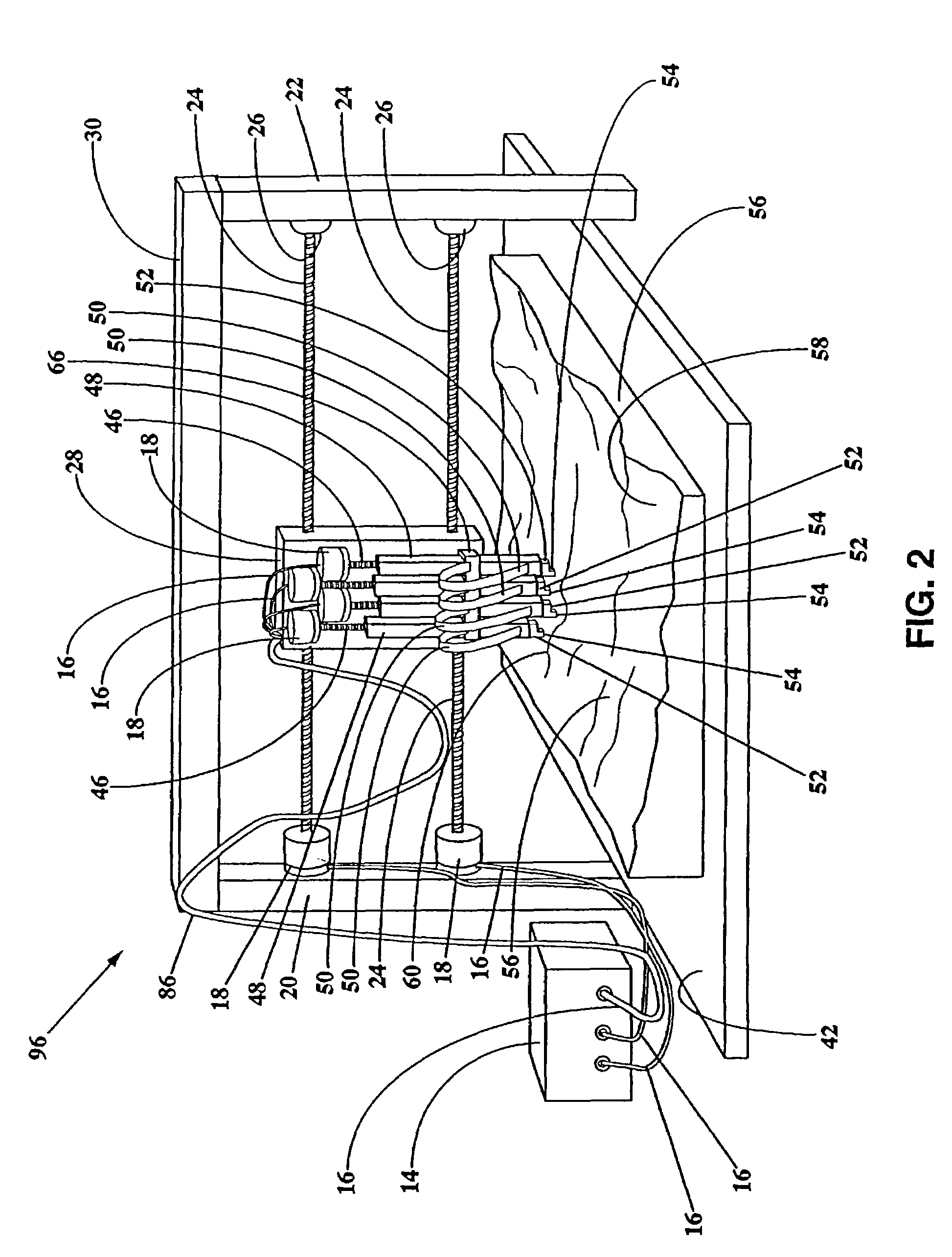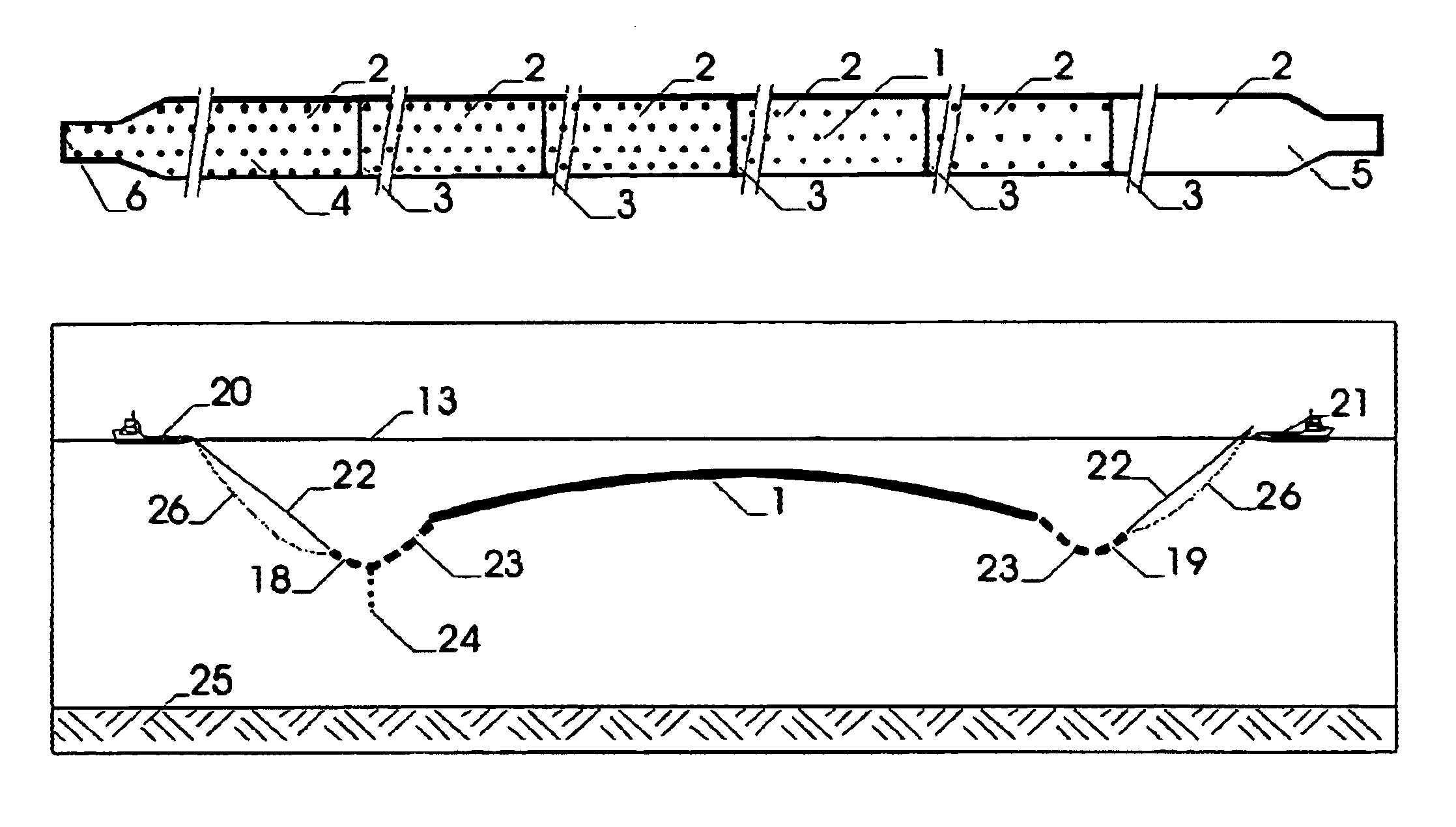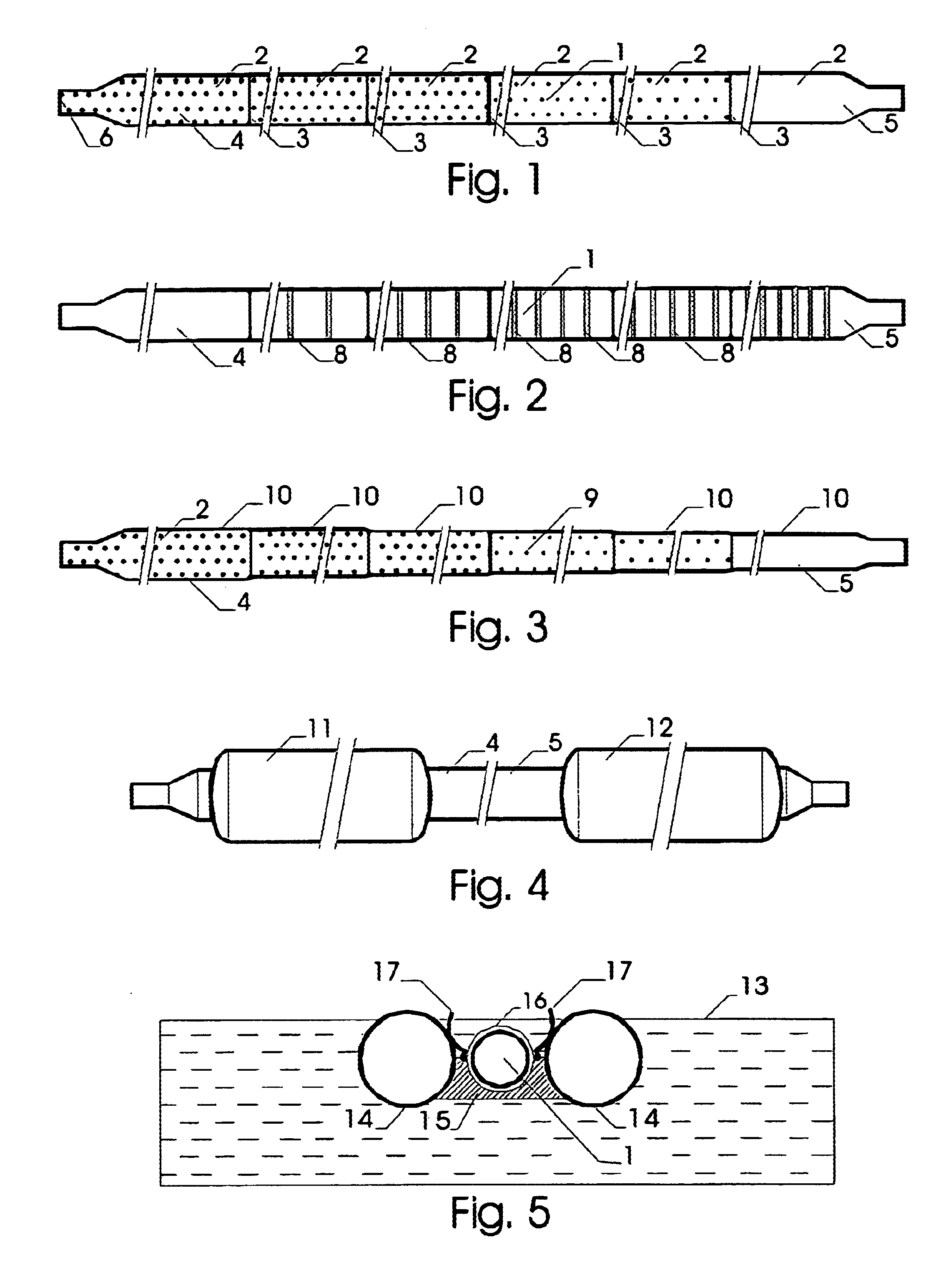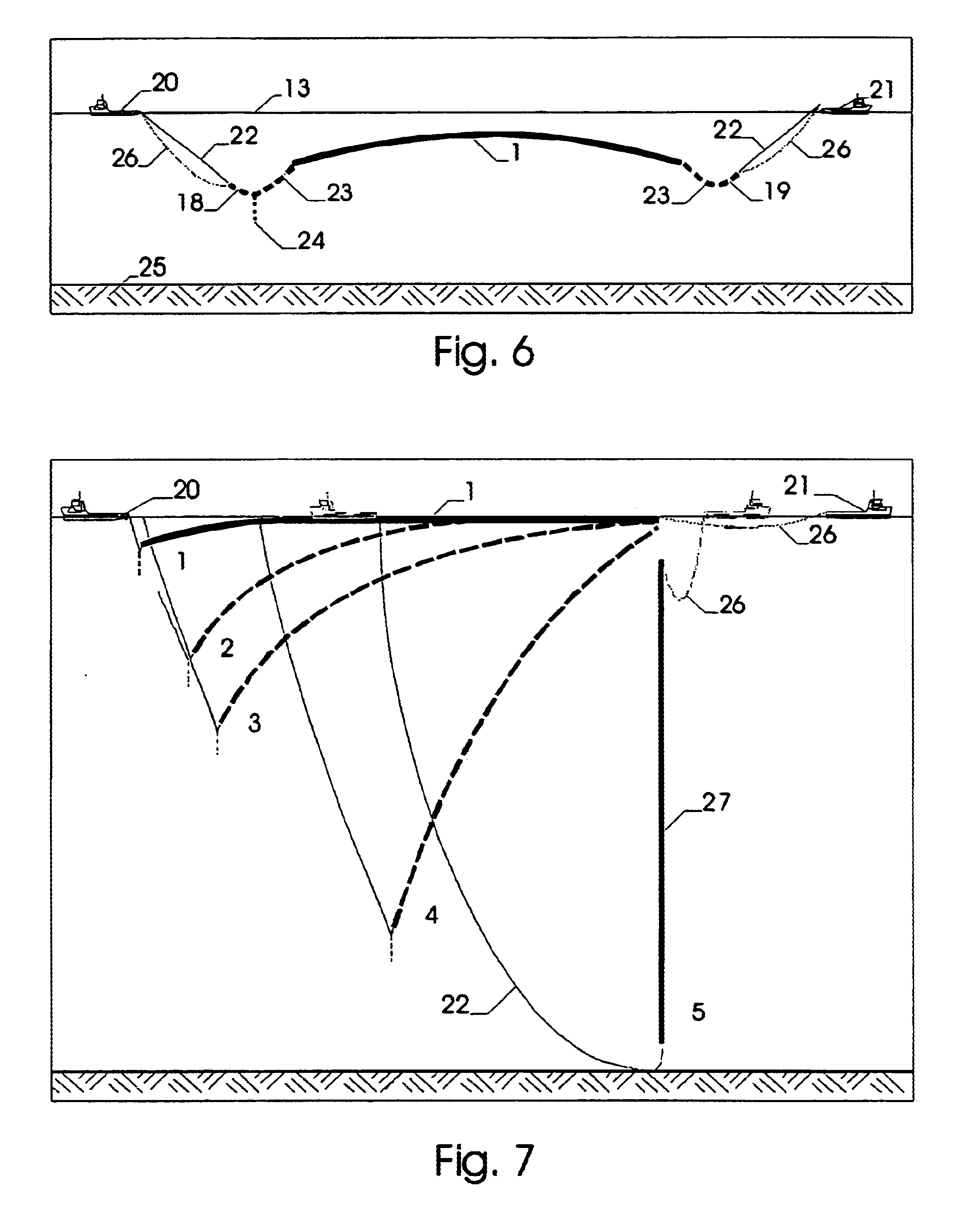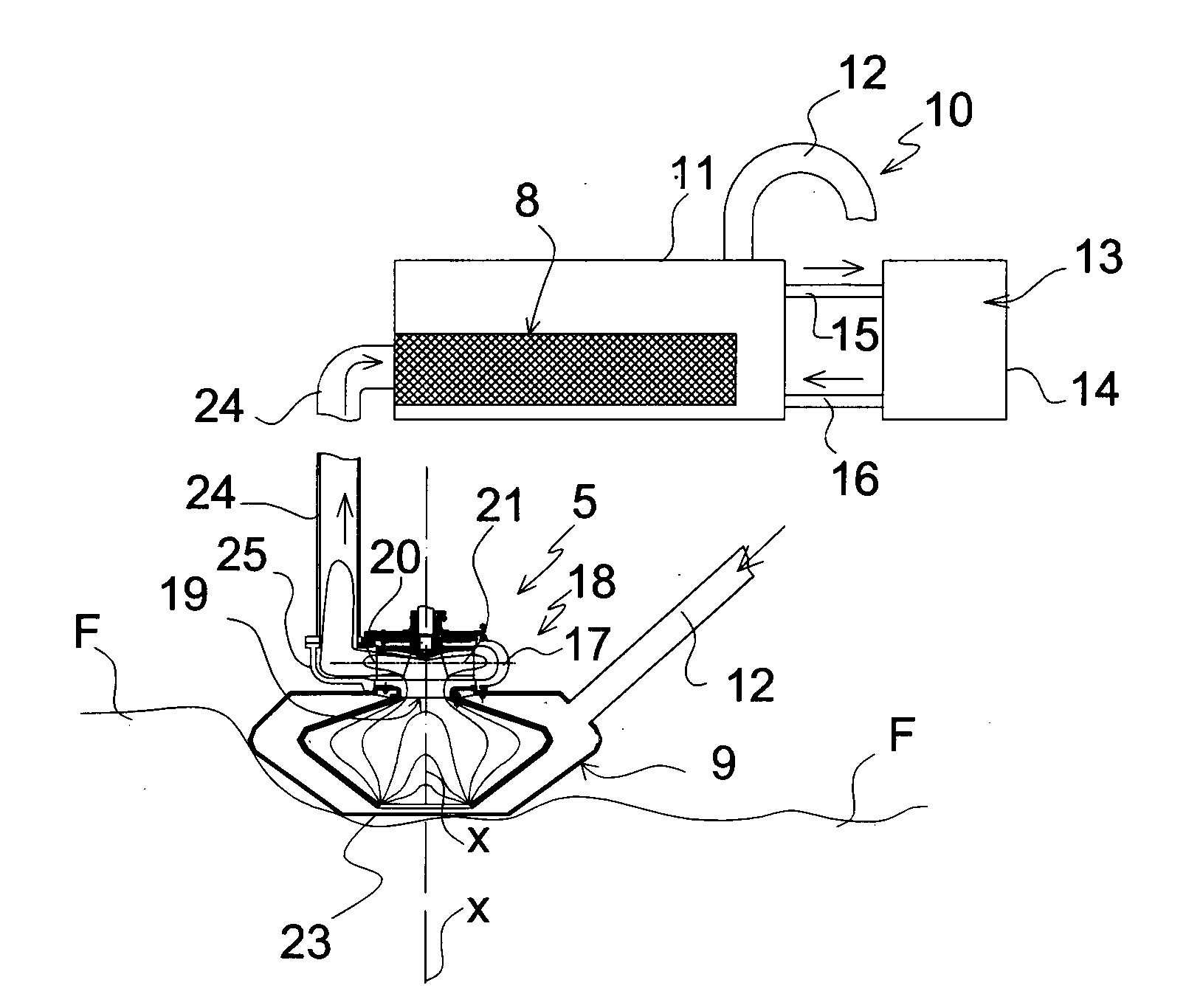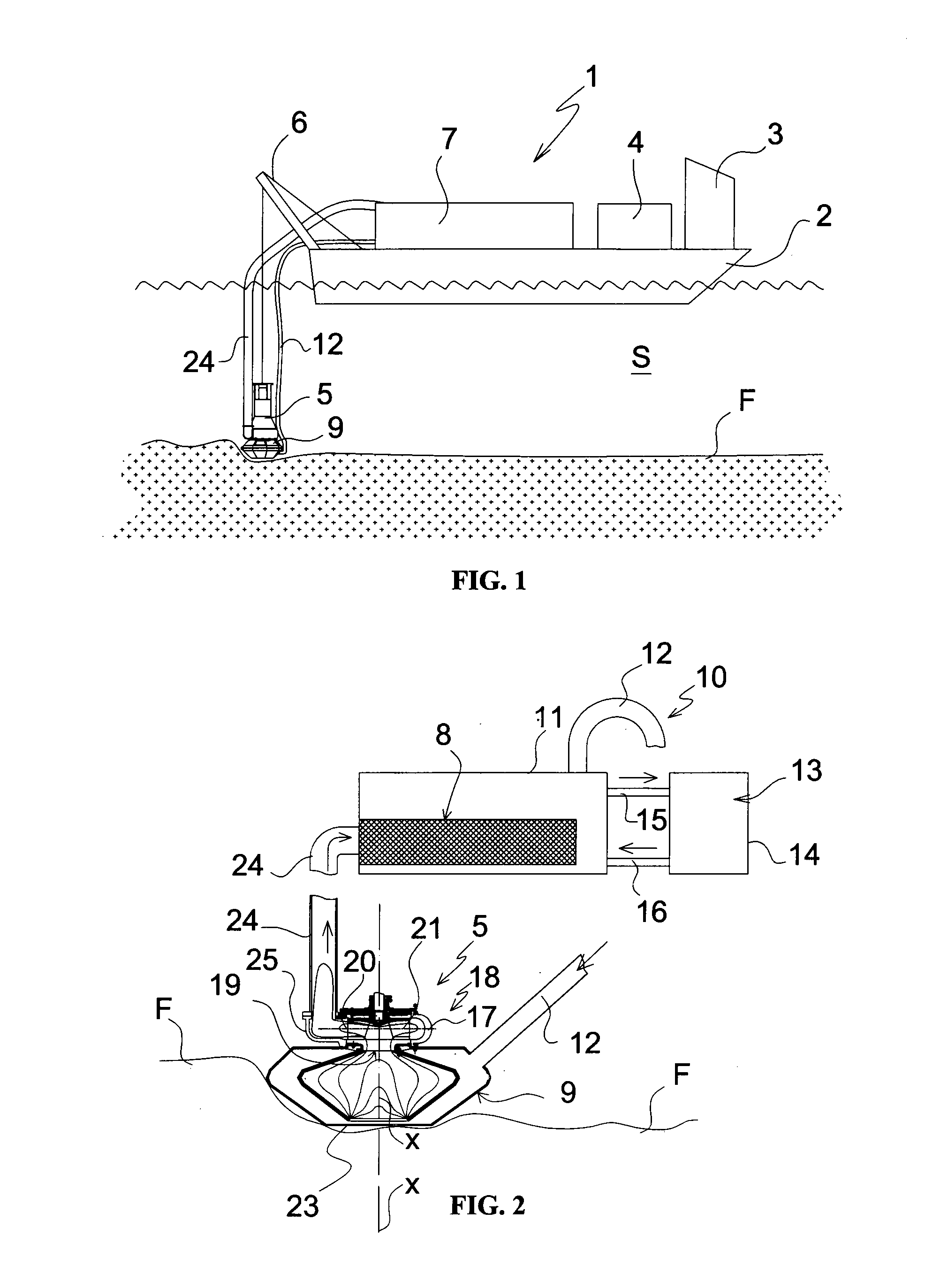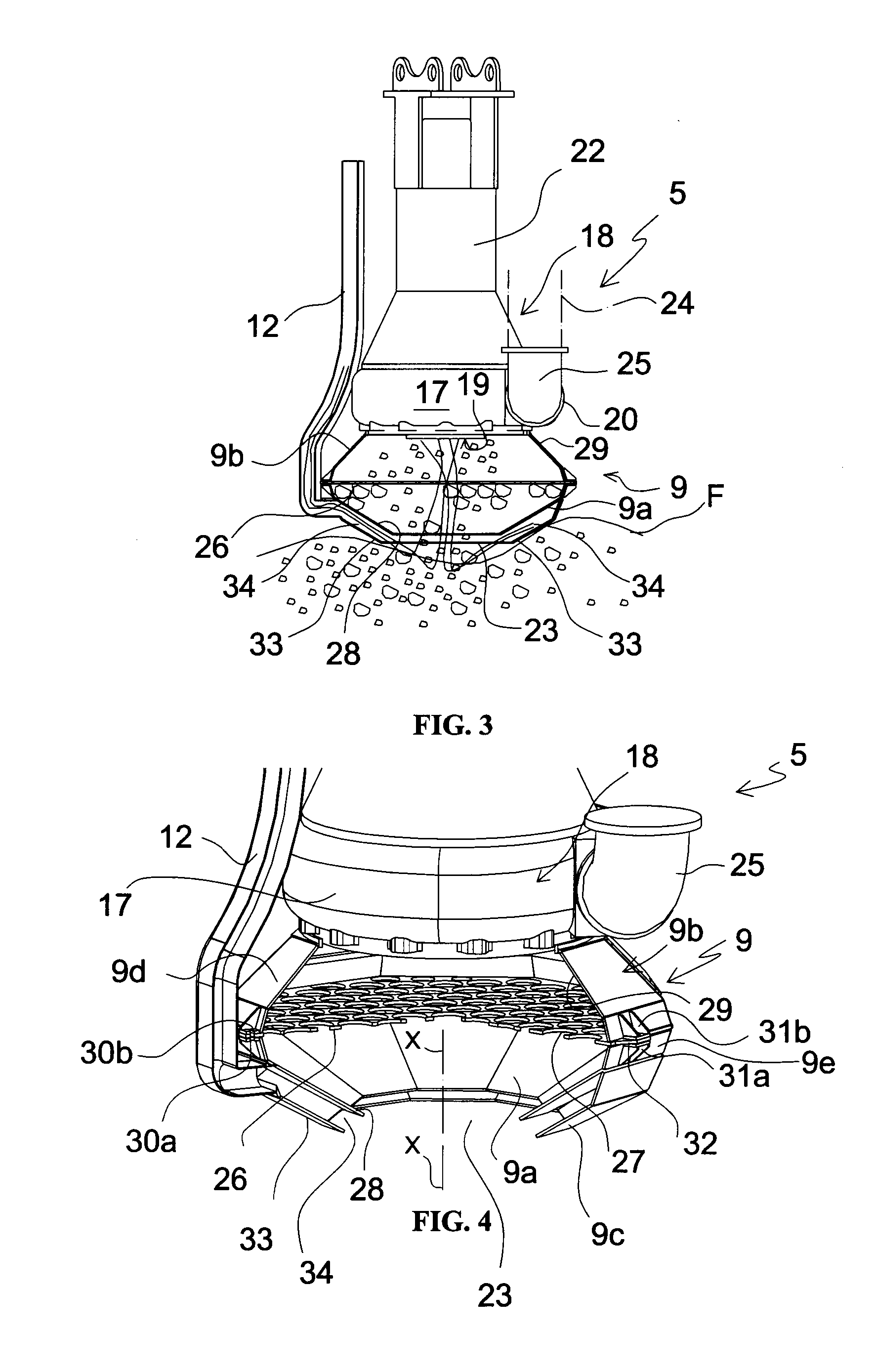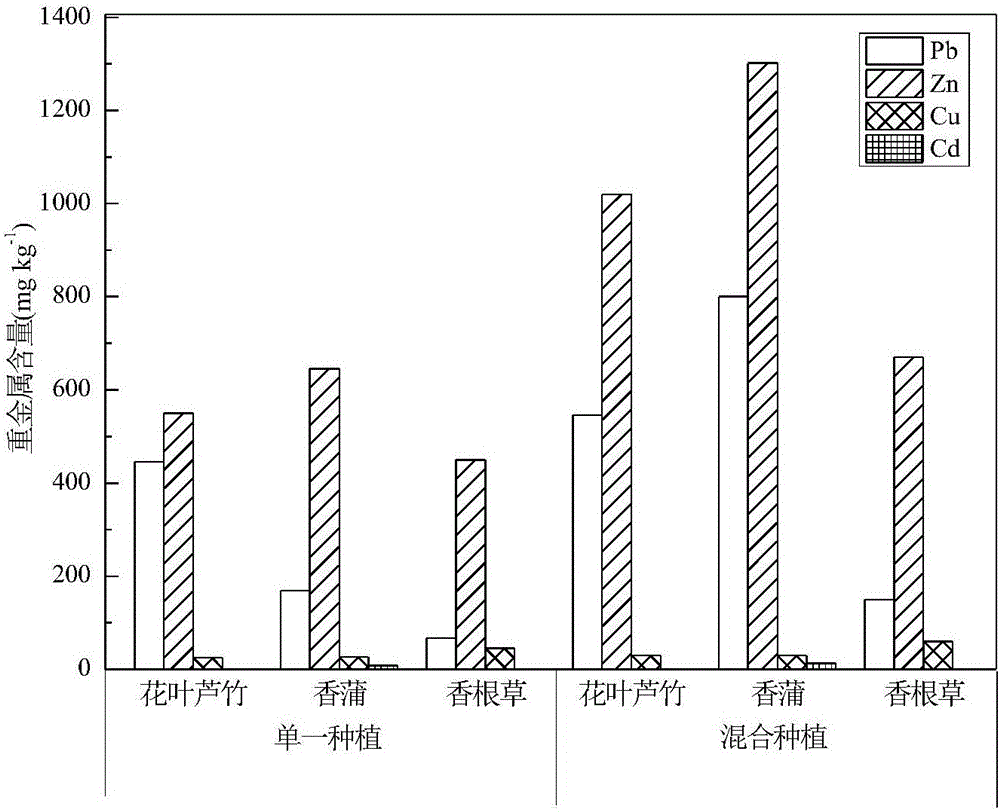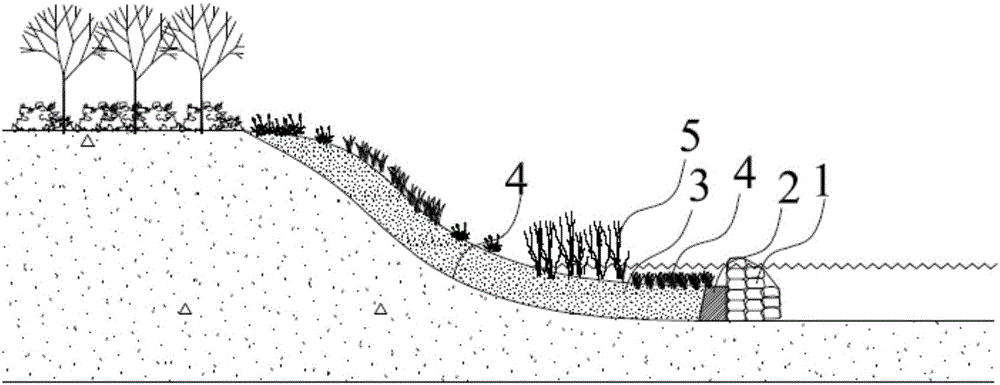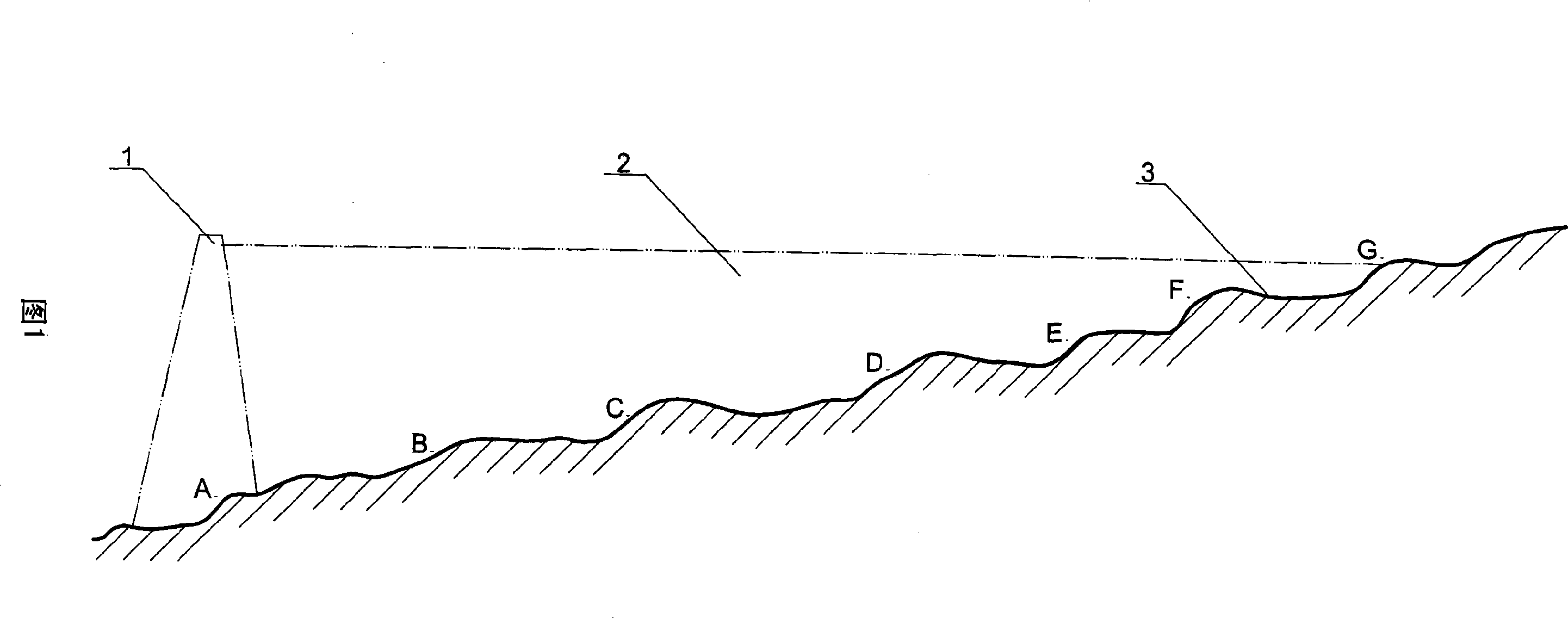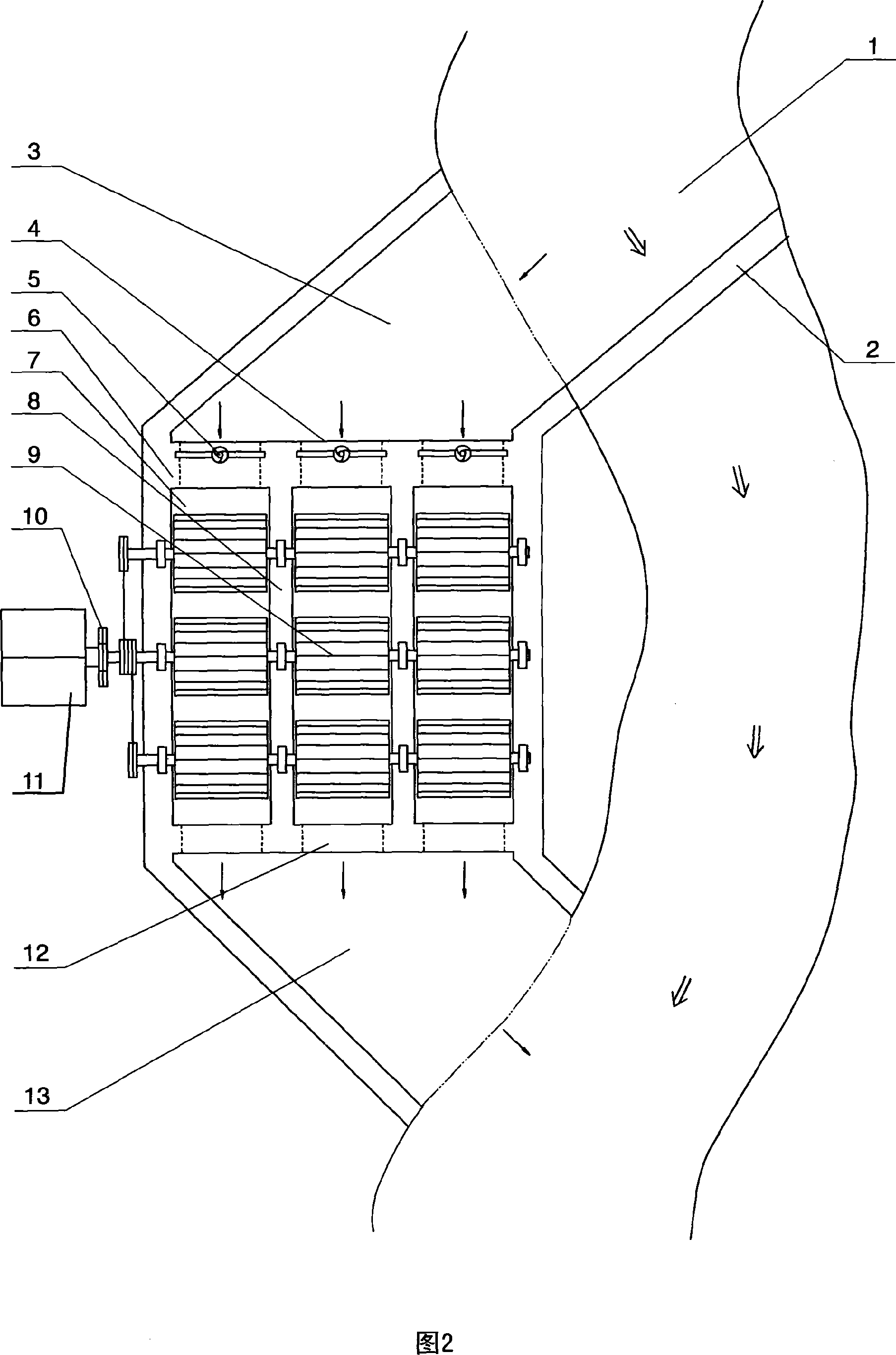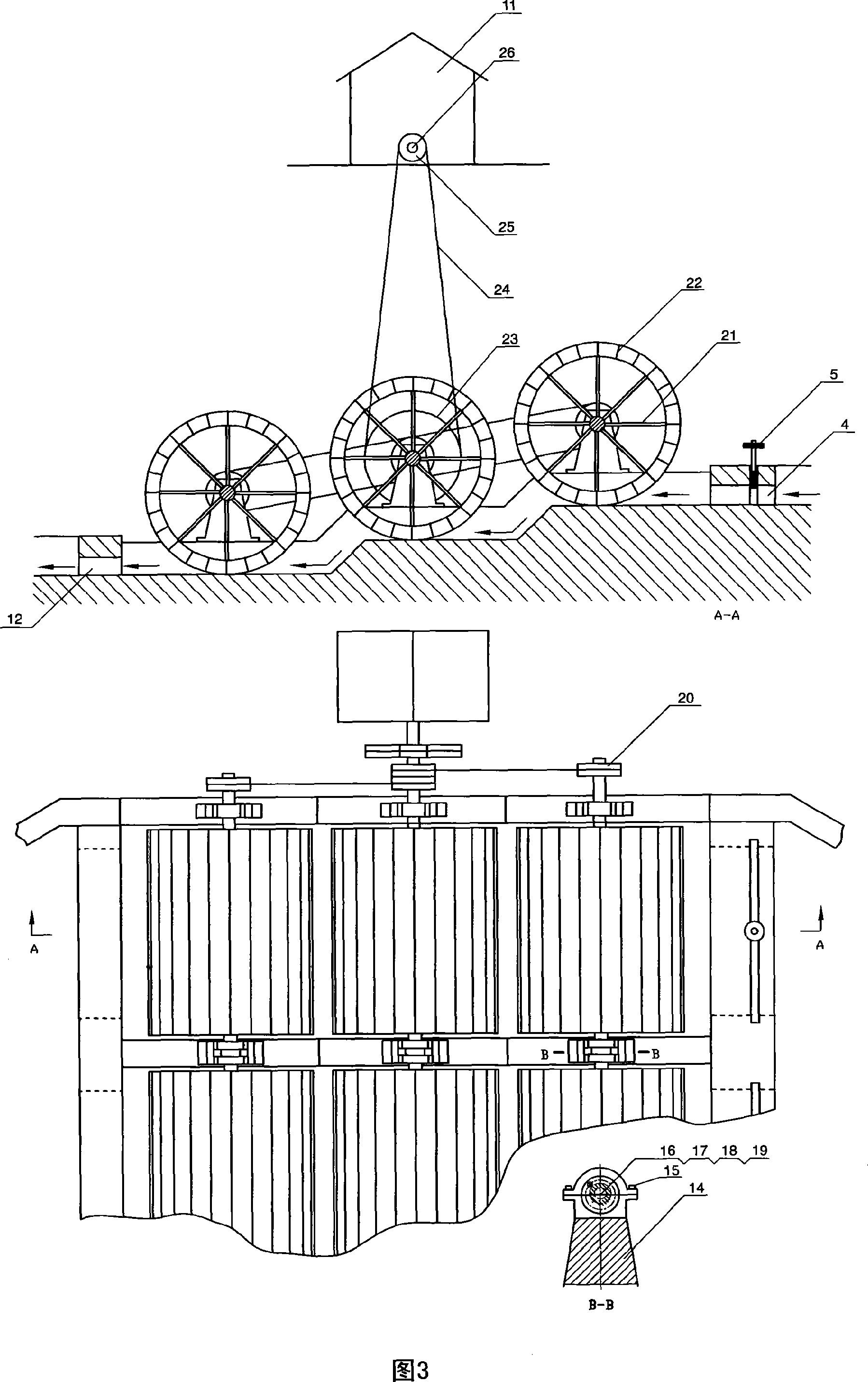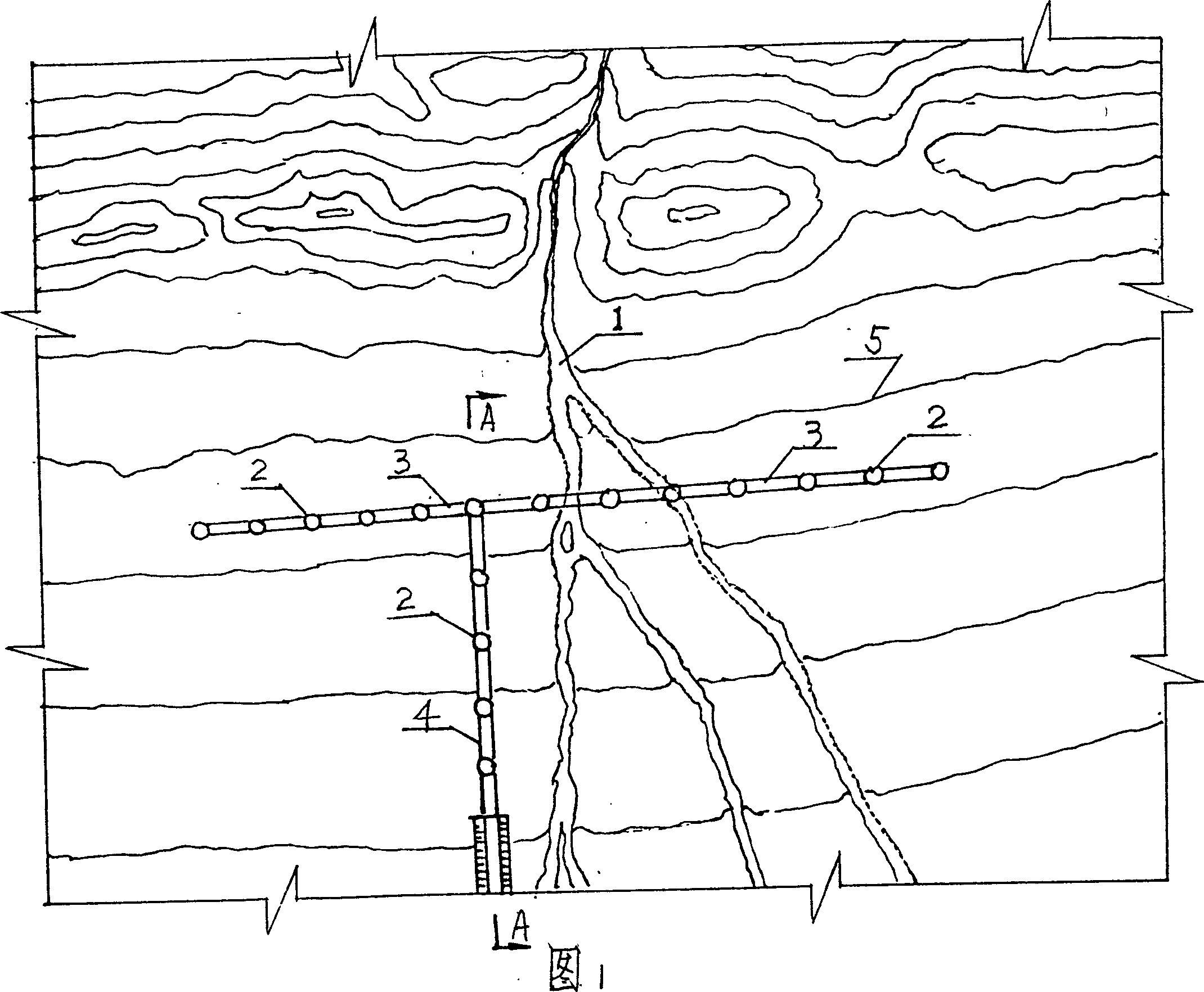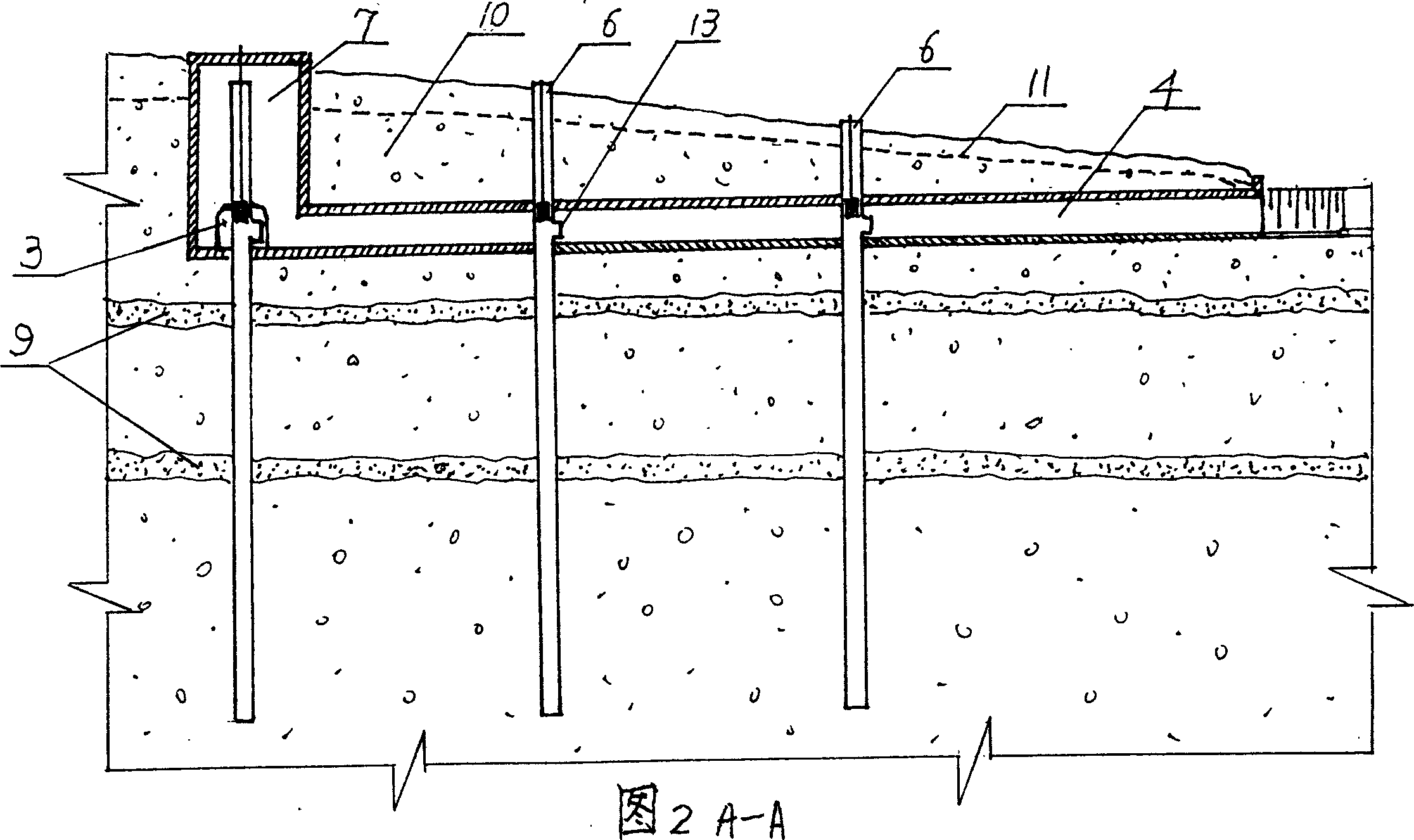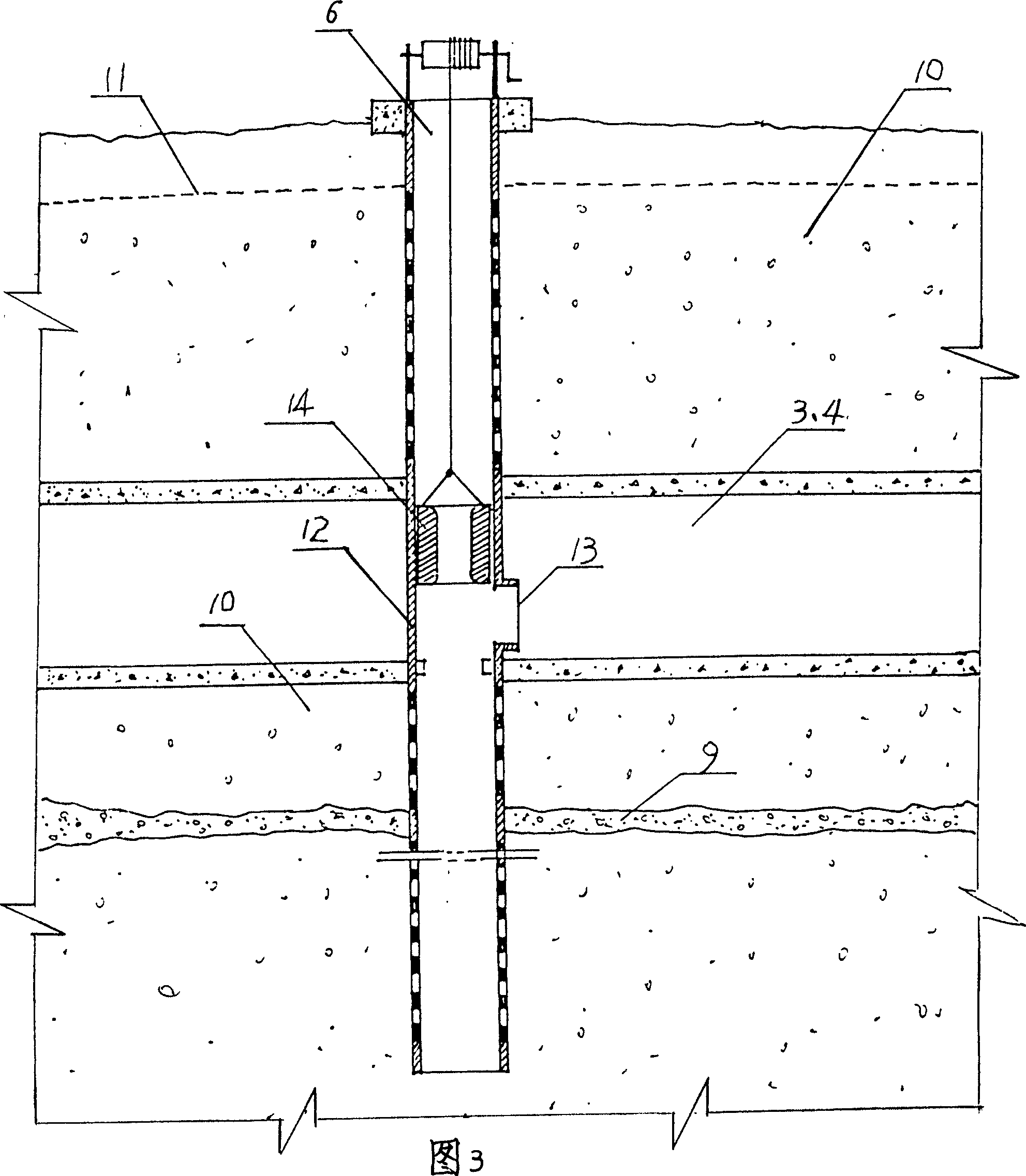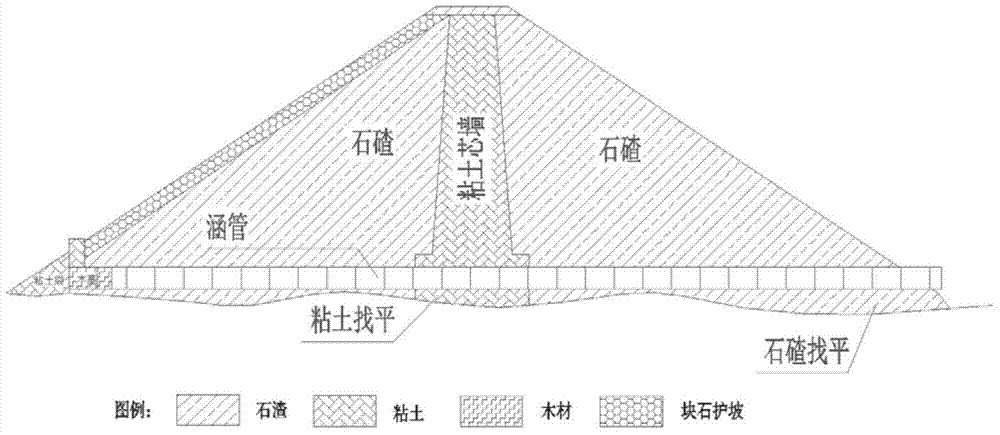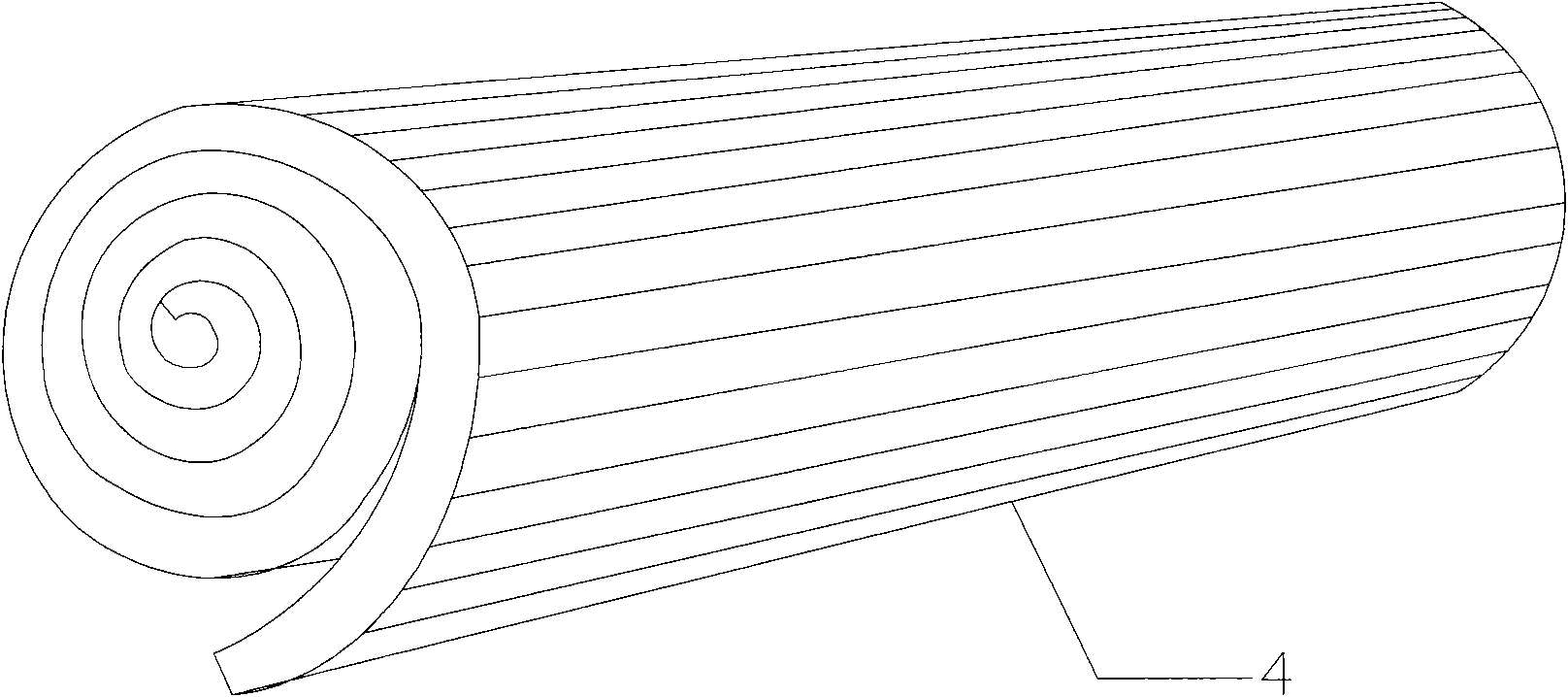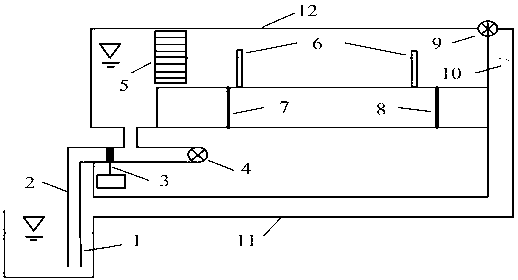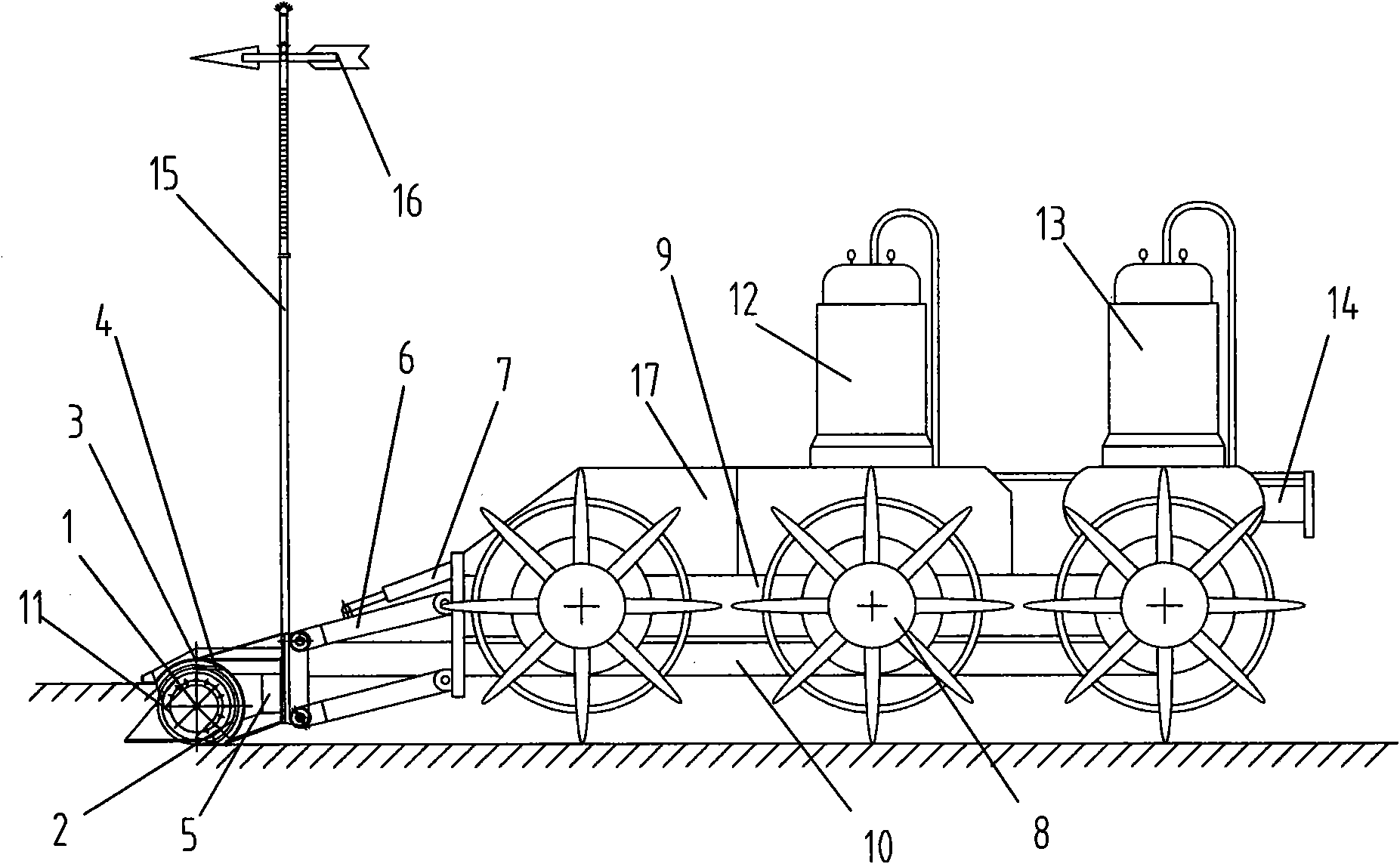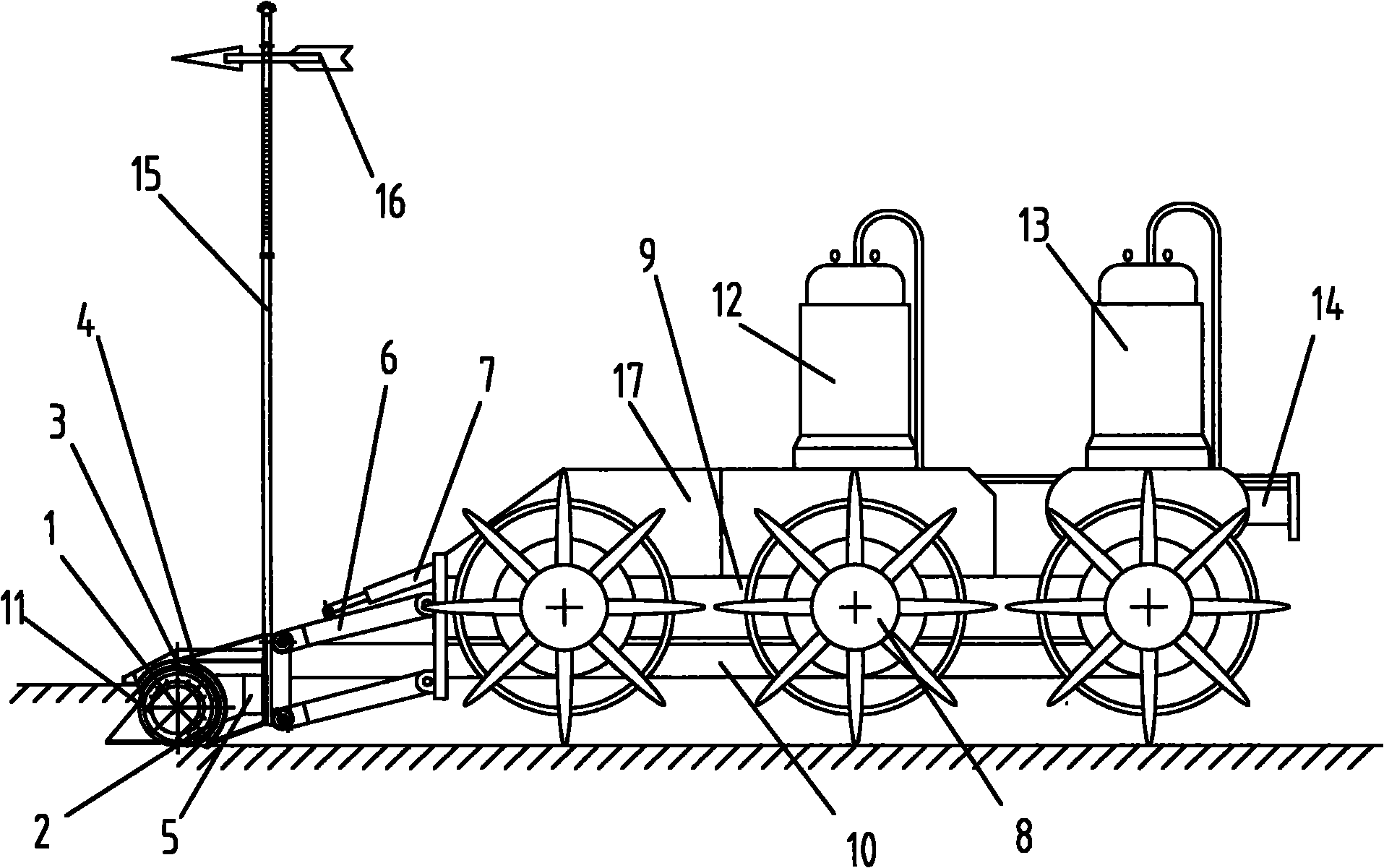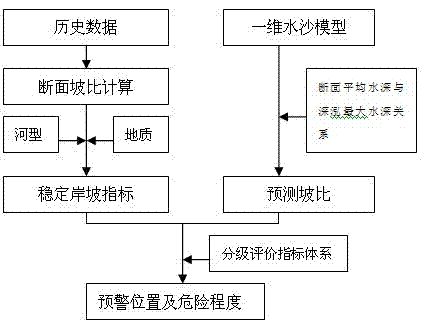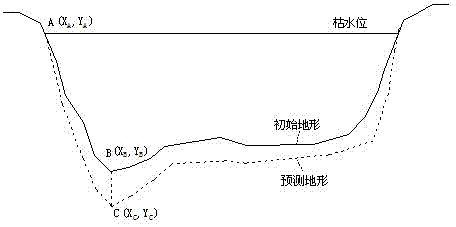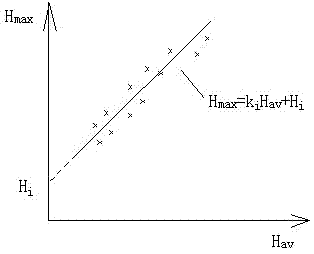Patents
Literature
1316 results about "River bed" patented technology
Efficacy Topic
Property
Owner
Technical Advancement
Application Domain
Technology Topic
Technology Field Word
Patent Country/Region
Patent Type
Patent Status
Application Year
Inventor
Construction method for shallow soil-covered river bed under shield tunnel
The construction process for shielded tunnel to penetrate through river bed with shallow covered soil layer includes the following steps: engineering investigation, river bed analogy, calculation and analysis, research and determination of technological scheme, determining auxiliary measures and setting the initial shielding parameters, river bed penetrating construction, etc. The auxiliary measures include foundation consolidation, setting anti-floating plate, surface blasting weight, etc. The initial shielding parameters include earth pressure, earth output amount, propulsion speed, grouting amount, etc. During the construction, one computerized real-time monitoring system is adopted for comprehensive monitoring on tunnel sedimentation, displacement and other conditions. The construction process can ensure safety and avoid water inrush, collapse and other accidents.
Owner:CHINA RAILWAY NO 2 ENG GRP CO LTD
Construction method of trestle steel pipe pile foundation
InactiveCN102312442AEnsure stability and securityEnsure structural safetyFoundation engineeringReinforced concreteWater flow
The invention discloses a construction method of a trestle steel pipe pile foundation. The construction method is used for performing anchoring construction for the trestle steel pipe pile foundation on a slope bare rock surface and a shallow covered slope rock surface of the river, lake or ocean. The construction method comprises the following steps: A10) after utilizing an anchoring system to accurately position a floating pilot hole platform, respectively guiding each trestle steel pipe pile to fall onto a river bed rock surface but not perform a rock anchoring, through each reserved hole position on the floating pilot hole platform; A20) after impacting a hole to a designed depth on a foundational bed rock surface in the trestle steel pipe pile by using an impacting drill with the diameter less than the inner diameter of the trestle steel pipe pile, vibrating the trestle steel pipe pile so as to guide the trestle steel pipe pile to sink to the bottom of the hole, pouring reinforced concrete and firmly connecting the trestle steel pipe pile to the foundational rock; and A30) welding a trestle steel pipe pile connecting system, thereby finishing the construction for the trestle steel pipe pile foundation. According to the construction method, the operation of drilling the pile and steel pipe pile is adopted for construction, thereby efficiently resisting the influences of water flow, wind wave and air load and ensuring the stability and structural safety of the trestle.
Owner:CHINA MAJOR BRIDGE ENG +2
Preparation method of microbial agent capable of continuously desilting and removing black and odorous water body
The invention discloses a preparation method of a microbial agent capable of continuously desilting and removing a black and odorous water body. The preparation method comprises the following steps: adding mineral powder for planting into soil for planting green leaf plants, collecting grown green leaf plants, mixing the collected green leaf plants with sterile purified water, crushing and stirring a mixture to obtain a plant culture medium; preparing the following raw materials in parts by weight: 10.2 to 36.0 parts of the mineral powder with 100 to 300 meshes for culturing, 0.5 to 5.5 parts of the plant culture medium, 0.3 to 2.5 parts of plant source microorganisms and 56.0 to 89.0 parts of the sterile purified water for culturing; preparing microbial liquid from the raw materials, fusing the microbial liquid with to-be-treated plant source microbial liquid obtained by collecting and domesticating in an original river branch according to the weight part ratio being 3:7, and finally, mixing a mixed solution with broken ore grains to obtain a finished product. The microbial agent disclosed by the invention can realize instant settlement for taking effect, quick field planting and propagation expanding at the bottom of a river bed and continuous biological deodorization, desilting and water purification within 3 to 6 months, is ecological and environment-friendly, and is suitable for treating the black and odorous water body in the river branch.
Owner:钟华
Box-raft pressure-bearing type foundation underpinning and construction reinforcing method for tunnel across pile foundation of bridge above river
InactiveCN101761068AReduce the impactImprove construction levelFoundation repairBulkheads/pilesCofferdamAbutment
The invention relates to a geotechnical and underground engineering technology field, particularly to a box-raft pressure-bearing type foundation underpinning and construction reinforcing method for tunnels across pile foundations of a bridge above a river. The method of the invention comprises: reinforcing abutment foundation of both sides of the bridge, reinforcing the riverbed outside the cofferdam construction and abutment, strengthening bridge supports, excavating pits under cofferdam bridges, strengthening expanding plate-type foundations inside the pits and ground base under the plates, as well as shield tunneling and removing obstructive file base. The method can smoothly complete construction and guarantee smooth shield tunneling while ensuring normal passage of existing bridge structure, further can effectively reduce construction risk, accelerate construction process, reduce cost and reduce influence to environment to a maximal extent.
Owner:TONGJI UNIV +1
Composite hydrological monitoring system
ActiveUS20170292839A1Simple structureEasy constructionMeasuring open water depthVolume/mass flow by mechanical effectsMonitoring systemMechanical energy
Disclosed is a composite hydrological monitoring system, in which a counterweight component and a test component are respectively connected to both opposite ends of a strip and a plurality of sensors are disposed at different vertical positions. Accordingly, the scour depth can be measured by sensing the location of the counterweight component, whereas the water level and / or flow velocity can be determined by signals from the sensors. When the counterweight component moves downward with sinking of the riverbed, the strip would be pulled down and thus causes the test component to present a change in mechanical energy. Accordingly, the sinking depth can be measured by sensing the change of the mechanical energy. Additionally, since the water level variation would cause signal changes of the sensors arranged in a row along a vertical direction, the change of water level can be determined accordingly.
Owner:NAT APPLIED RES LAB
Universal Framed Cofferdam
Universal Framed Cofferdam has prefabricated skeletal steel space framing formed from multiple steel vertical pipes and two levels of horizontal diaphragm trusses rigidly connected to pipe columns. Beams of each diaphragm truss are attached to vertical pipes of the framing with rigid moment connections creating a rigid space frame of the perfectly round form that is used as a false work of the Cofferdam. Wales of the Cofferdam and short pieces of the flat sheet piling are attached to the vertical pipes forming a skeleton of the Cellular structure. The Skeleton of the Universal Framed Cofferdam is prefabricated in the convenience of the Dry Dock and than floated to the site. Buoyancy of the framing allows Cofferdam skeleton transportation without using the barge or otherwise necessary floating devices. Once brought to the site of installation Cofferdam skeleton is installed vertically in position and leveled on the bottom of the river bed. If necessary river silt can be jetted and pumped out of pipe annular space and pipe columns of framing can be simultaneously lowered in position by using vibro—hummer. After space framing installation, rock sockets are predrilled through the annular space of vertical pipes and rock anchors installed. Sheet pile skin of the Cofferdam installed between pipe columns concludes Cofferdam Can erection. Universal Framed Cofferdam Can than filled with compacted gravel and becomes a Hybrid Gravity Caisson / Columnar water front or marine structure that has the best features of the Conventional Cellular Cofferdam and of Columnar Dolphin structure. It has enhanced sliding and overturning stability provided by Rock anchors preloaded by Cofferdam granular fill and has effective mechanism that prevents concave or convex surface of rupture failure that may be suffered by conventional Cellular Cofferdams, and has mechanism that more effectively resists deep surface sliding failure of the Cofferdam base.
Owner:FEYGIN VITAL BORIS +1
Testing device and testing method for testing environmental preference behavior of fish
ActiveCN103461232ARealizing Preference Sexual Behavior ResearchElimination of Preference Sexual Behavior Study FindingsClimate change adaptationPisciculture and aquariaWater channelData acquisition
The invention provides a testing device and a testing method for testing environmental preference behaviors of fishes. The device is characterized in that water inlet pipes with a flow regulator and water outlet pipes with a flow regulator are respectively installed at the two ends of a water trough, one ends of the water inlet pipes are communicated with a pressure-bearing water tank, flow conditioning meshes are respectively installed at the communicating ports of the water inlet pipes which are communicated with the water channel, upper flow guide baffles are installed between the water inlet pipes and the water outlet pipes to form flow guide channels, isolating nets are installed at the front ends of the water inlet pipes and the water outlet pipes, and the pressure-bearing water tank is connected with a variable-frequency water pump and a variable-frequency regulator. The method comprises the steps of 1) preparation before testing; 2) testing and correction of the testing device; 3) testing of preference behaviors of fishes; 4) testing data acquisition and preference index calculation; 5) maintenance and cleaning of the device. The testing device and the testing method for testing the environmental preference behaviors of the fishes can realize researches on the preference behaviors under various environmental factors such as flowing speed, river bed materials and illumination according to different environmental factors which are distributed in an experimental area.
Owner:YANGTZE RIVER FISHERIES RES INST CHINESE ACAD OF FISHERY SCI
Down-lying, bed-contacting and sinking control technologies of super large steel cofferdam
InactiveCN101205720AAdjustable levelPrecise sinkingFoundation engineeringBridge engineeringCofferdam
The invention discloses a control technology of putting down, touching rocks and settlement of a super cofferdam. The invention belongs to the bridge engineering foundation construction field and is applicable to the cofferdam construction in the bridge high-low pile cap foundation. Namely the invention adopts the control technology of putting down, touching rocks and settlement to realize controllable initiative, adjustable ration, controllable position and adjustable deviation during the settlement of the cofferdam. The technology adopts a uniquely designed lifting system and a horizontal guide device to ensure that the cofferdam is safely and accurately settled to the designed position under the synchronous action of the lifting system and the horizontal guide device and through the wall cabin batch water filling mode as well as under the controllable state that the gravity is greater than the buoyancy. The invention effectively solves the problems of putting down and touching rocks of the super cofferdam as well as the settlement precision in the covering layer under the disadvantageous conditions such as tidal rivers with frequent hydrologic change, bigger riverbed height difference and so on, and improves the installation accuracy of the cofferdam.
Owner:CHINA MAJOR BRIDGE ENG
Method for measuring three-dimensional terrain in river model test
InactiveCN102538763AQuality improvementAdjust shooting rangeWater resource protectionWater resource assessmentDigital videoTerrain
The invention belongs to the technical field of hydraulic measurement and in particular relates to a method for measuring a three-dimensional terrain. A key technology for the river model test is characterized in that: deformation of a river channel is monitored in real time in the river model test of hydraulic engineering. The method comprises the following steps of: on the basis of a binocular stereo vision principle, by using an image pick-up technology, a laser matrix light source tracing technology and a three-dimensional terrain reconstruction technology, measuring the three-dimensional morphology of a bed surface in the river model test in real time; integrating a digital video camera, a laser rectangular lattice tracing light spot transmitting device and a computer; by installing a system in a set mode, correcting camera parameters and projecting laser lattice light spots to the bed surface, tracing the bed surface of a river model, acquiring an image of the bed surface, and extracting and matching laser tracing points of a river bed in an economic, safe and high-quality mode; by using a computational formula, computing three-dimensional space coordinates of laser tracing light spots on the bed surface; and on the basis of the computer, by taking the three-dimensional space coordinates of all laser tracing light spots on the bed surface as media, generating a terrain map of the river model.
Owner:TSINGHUA UNIV
River critical levee section washing safety analysis and bank slope stability judgment method
ActiveCN110287571AResearch stabilityData processing applicationsClimate change adaptationElement modelData set
The invention discloses a river critical levee section washing safety analysis and bank slope stability judgment method. The method comprises the steps of 1, generating a data set used for constructing a two-dimensional river channel water / sand model; 2, setting model calculation parameters and definite solution conditions according to river reach parameters in the research area, and constructing a two-dimensional water / sand numerical simulation model of the research area; step 3, setting various working conditions according to sand coming conditions under different flood conditions, simulating river water / sand transportation and river bed silt flushing of a research area by utilizing a two-dimensional water / sand numerical model, analyzing dangerous river beds before and after flood based on a simulation result, and respectively calculating river dangerous bank slope river bed depth flushing distance and river lateral erosion distance; and step 4, constructing a finite element model for seepage-stability analysis of the bank slope of the critical levee section, and quantitatively researching the relationship between each factor and the bank slope stability safety coefficient. According to the method, the stability of the riverway dangerous work bank slope under the action of water flow flushing is studied, and a quantitative means is provided for critical levee section stability evaluation.
Owner:TIANJIN UNIV
Ecological floating bed device for in-situ enhanced denitrification of micro-polluted river
ActiveCN106396121AInsufficient improvementGood removal effectWater contaminantsSustainable biological treatmentEmergent plantDual effect
The invention relates to an ecological floating bed device for in-situ enhanced denitrification of a micro-polluted river, and can effectively solve problems that in the water body of the micro-polluted river, the C / N is relatively low, the available carbon source is insufficient, the denitrification effect is inhibited, and the TN removal rate is relatively low. The technical scheme is that the ecological floating bed device comprises a floating bed frame and emergent plants; the floating bed frame is composed of a rectangular outer floating bed frame 2 and a grid-like inner floating bed frame 3; plant water-permeable planting grooves 4 are uniformly distributed in frame grids; the planting grooves are provided with a floating bed substrate 5 and the emergent plants 1 planted in the substrate; the lower part of the floating bed frame is filled with a perpendicularly downward combined filler; the lower parts of four corners of the outer floating bed frame 2 are connected with fixed piles 7 fixed on a riverbed through connecting ropes 6. The ecological floating bed device provided by the invention is suitable for purifying water body of natural river channels, lakes and reservoirs, as well as landscapes, has dual effects of water surface beautification and water purification, and is simple to mount, economical and practical.
Owner:ZHENGZHOU UNIV
Deepwater single-wall steel plate pile cofferdam structure with low buried depth and construction method thereof
The invention discloses a deepwater single-wall steel plate pile cofferdam structure with low buried depth. The structure comprises a plurality of bored piles, a steel plate pile cofferdam around the bored piles, bagged sand positioned outside the cofferdam and arranged on the surface of a river bed, and high-pressure rotary jet piles constructed in the cofferdam and outside the bored piles, wherein the plane size of the cofferdam is greater than that of a bearing platform to be constructed so as to reserve a construction space. By using the steel plate pile cofferdam, the deepwater low pile bearing platform and the underwater part of a pier of a bridge can be constructed with relatively low cost and minimum construction risk, and a double-wall steel cofferdam scheme with relatively high cost does not need to be adopted for construction, so that the turnover steel consumption of the cofferdam serving as a temporary project is saved, and the application range of the deepwater steel plate pile cofferdam construction technology is enlarged.
Owner:THE FIRST ENG OF CCCC FOURTH HARBOR ENG +1
Monitoring device for monitoring river-bed scouring depth, remote automatic monitoring system and bridge
InactiveCN101334261ASimple structureEasy to installMechanical depth measurementsFoundation testingMonitoring systemEngineering
The invention relates to a monitoring device used for monitoring the scouring depth of a river bed, and an automatic remote monitoring system as well as a bridge. The monitoring device used for monitoring the scouring depth of the fundamental river bed of the bridge comprises at least one gravity measuring rod, one end of which is held and connected on the river bed and the other end thereof extends to the vertical direction; at least one protective cased pipe, wherein, the center thereof is used for the penetration of the gravity measuring rod and allows the vertical sliding of the rod; at least one sliding bush with one end provided with a guiding part loosely sheathed outside the cased pipe and the other end thereof fixed on the pier of the bridge and used for maintaining the vertical sliding of the cased pipe and gravity measuring rod. In this way, when the river bed sinks owning to the scouring, the gravity measuring rod and the protective cased pipe also sink accordingly, scouring data is obtained by level slippage, furthermore, an alarm is given and the traffic is controlled to avoid the occurrence of accidents. The invention simultaneously discloses a remote monitoring system and a bridge with the function of automatic monitoring.
Owner:陈明正 +1
Shallow river water depth surveying and mapping method and system based on unmanned aerial vehicle multi-view shooting
ActiveCN110779498AReduce personal riskHigh measurement accuracyMeasuring open water depthWater resource assessmentTotal stationAngle of view
The present invention discloses a shallow river water depth surveying and mapping system and method based on unmanned aerial vehicle multi-view shooting. The method comprises step S1: determining a surveying time, a surveying area and surveying precision; S2: setting ground control points GCPs in the surveying area, and using a positioning instrument to perform positioning on the control points; S3: planning a flight line of an unmanned aerial vehicle, and performing aerial shooting according to the pre-determined air line; and S4: using unmanned aerial vehicle image analysis software to process an image of the multi-view shooting in step S3, surveying an orthoimage and a digital surface elevation model of the area, and applying an optical model water depth inverse program to perform refraction correction and to perform inversion to obtain a water depth value of a shallow river. Compared with conventional GPS measurement, total station measurement and echo sounding, the method is time-saving, labor-saving and cost-saving, causes no damage to a water body and a river bed, and has relative high execution efficiency; and water depth surveying and mapping is extended from point measurement to face measurement, a relatively high spatial resolution is provided, and water depth measurement precision and a spatial resolution are also improved.
Owner:INST OF GEODESY & GEOPHYSICS CHINESE ACADEMY OF SCI
Lake dredging bottom-mud dewatering integrated treatment technology
InactiveCN101024548ALow costIncrease valueSludge treatment by de-watering/drying/thickeningWater qualityEnvironmental engineering
The invention discloses a river bottom mud dredging dewatering process technology that includes the following steps: dredging river bed, separating mud and sand, separating sand and water, dewatering and sterilizing. The processed water could reach the discharging standard, and could be recycled. It supplies a entire, low cost and high value method to treat river course.
Owner:曹健
Bridge prefabricated foundation and bed-burying method thereof
InactiveCN101962956AReduce water resistanceGuarantee the construction qualityBridge structural detailsFoundation engineeringPilot holeUnderwater
The invention discloses a bridge prefabricated foundation and a bed-burying method thereof. The bridge prefabricated foundation consists of a bridge lower part pier body, an undercut bearing platform and a cavity formed by enclosing the pier body and the bearing platform. The undercut bearing platform is reserved with a guide hole, an exhausting recharging hole and a supporting liner plate. The bed-burying method comprises the following steps of: integrally prefabricating the lower part pier body and the bearing platform in a factory; excavating a foundation ditch, and then paving a crash pad layer; and sinking a pile which passes through the crash pad layer and is inserted into a sea (or river) bed. A range of 5 to 30 m below a designed height mark of the top of the pile and is filled with core filling concrete, and a supporting pile and a bearing pile are cut to the designed height mark underwater. The prefabricated foundation is positioned through a guide pile, and is placed on the supporting pile which is provided with a supporting component. The guide pile is cut underwater, and the cavity is poured with concrete to ensure that the prefabricated foundation is firmly connected with the pile. The top surface of the lower part pile body of the bridge prefabricated foundation must be higher than water surface and higher than a splash zone. The bearing platform of the prefabricated foundation is completely buried into the sea (or river) bed to ensure that the water resistance ratio can be reduced, the construction period can be shortened, the influence on the environment can be reduced, and the engineering cost is low.
Owner:CCCC HIGHWAY CONSULTANTS
Safe and fast construction method of down-traversing river shallow depth bored tunnel
InactiveCN104631475AReduce vertical infiltrationReduce moisture contentUnderwater structuresTunnelsCofferdamFluvial
The invention discloses a safe and fast construction method of a down-traversing river shallow depth bored tunnel. The method includes the steps that on the two sides of the tunnel, the upstream and the downstream of a river are each provided with a clay cofferdam so that the river can be intercepted, and a dry river bed is formed in a tunnel construction area; the two constructed clay cofferdams are communicated through a flow guiding pipe, and therefore upstream river water and downstream river water can flow; the two sides of the tunnel are each provided with at least one row of Larsen steel plate piles, and the tunnel is excavated after the Larsen steel plate piles extend to a river bank in the axial direction of the tunnel. The clay cofferdams, the flow guiding pipe and the Larsen steel plate piles are matched coordinately and comprehensively utilized, and tunnel construction safety is guaranteed by the clay cofferdams, the flow guiding pipe and the Larsen steel plate piles jointly. The method is good in construction safety and high in construction efficiency, treatment measures are flexible, pertinent adjustment can be performed according to different geological conditions, and manufacturing cost of projects is saved as much as possible on the premise that safety is guaranteed.
Owner:中铁隧道局集团有限公司市政工程公司
Automatic hydrologic parameter measuring system for river flow and the method using the same
An automatic hydrologic parameter measuring system for a river flow comprises a supporting installed below a bridge surface; a waterproof box connected to a steel rope for suspending a weight; another end of the rope extending downwards out of the waterproof box for retaining the weight; a waterproof electric wire winding around the steel rope for transferring signals to the signal processor; a water pressure meter installed in a hollow space of the weight; when the weight being in water, the water pressure meter starts the measuring process; after the weight reaches to the riverbed, the water pressure is unchangeable; and a water pressure meter installed in a hollow space of the weight; when the weight being in water, the water pressure meter starts the measuring process; after the weight reaches to the riverbed, the water pressure is unchangeable.
Owner:LIAO YI JIUN
Hi-resolution three-dimensional imaging apparatus for topographic and 3d models
The present invention is directed to an automated system that includes a hi-resolution three-dimensional imaging apparatus for topographic modeling that is electronically coupled with a computer. The system incorporates one or more algorithms for converting the complex and randomly-occurring contours found in natural terrain into an efficient series of adjacent and parallel coloring-agent imaging paths or swaths (comprised of inks, dyes, paints, and / or pigments). The swaths are defined in simplified 2-axis surface contour-following printer-head movements by the system's CPU, printer driver software, driver circuitry and / or logic circuitry. This multi-axis control of the system assures that each of the swaths are seamlessly rendered next to one another while also maintaining an optimal proximity between the upper surface of the 3D model and the nozzle end of one or more hi-resolution printer. A single coloring-agent such as black ink, may be used solely, or in combination with a plurality of colors such as a Cyan, Magenta, Yellow and Black or “CMYK” combination. The system also incorporates algorithms for applying accurately registered indicia of a prescribed color, or colors, onto the surface of models including man-made boundaries such as property lines, easements, right-of-ways, land-development features; naturally occurring boundaries such as ridges and flow-lines, bodies of water, lakes, lake-beds, rivers, river-beds and forested areas including tree varieties; lettering including the accommodation of a variety of fonts; graphical embellishments; and cartographic elements.
Owner:SOLID TERRAIN MODELING
Tension leg and method for transport, installation and removal of tension legs pipelines and slender bodies
InactiveUS6682266B2Increase the diameterLarge wall thicknessPipe laying and repairDrilling rodsRiver bedEngineering
A tendon which is divided into compartments enclosing therein pressurized gas. A method for transporting a fluid containing tubular body or assembly of bodies above a sea / river bed floor and within a body of water. In addition to the method for transporting the tendon a method of installing and removing an internal pressurized tendon or assembly of tendons in a vertical position in a body of water.
Owner:ANCHOR CONTRACTING
Apparatus and method for the dredging of sediments from the seabed
ActiveUS20140015302A1Shorten speedAdequate slowing downSpecific fluid pumpsMachines/dredgers working methodsImpellerEngineering
A dredging apparatus is described for removing sediments from a bed of an expanse of water, comprising: a suction apparatus including a) a submersible pump including: a housing body provided with an inlet mouth and with a discharge opening and an impeller rotatably supported in the body between the inlet mouth and the discharge opening and rotatably driven by a respective driving device; and b) a suction head associated to the inlet mouth of the housing body of the pump and provided at the bottom with a suction opening of the sediments; wherein the suction opening of the head has a value of the cross-section area dimensioned to achieve in the working range of the pump a suction speed capable of removing the sediments by means of the fluid dynamics removal action carried out by the water sucked into the head. The invention also describes a dredging method which may be carried out by means of such an apparatus.
Owner:DECOMAR
In-situ remediation method for mining area watershed heavy metal pollution bottom sludge
ActiveCN105712596AImprove survival rateAvoid churnWater resource protectionSpecific water treatment objectivesSludgeDrainage basin
The invention discloses an in-situ remediation method for mining area watershed heavy metal pollution bottom sludge.The method includes the following steps that a slope wall is arranged; a bank side riverbed slope is leveled, and a layer of geotextile is laid on the bank side riverbed slope; the mining area watershed heavy metal pollution bottom sludge is obtained to be stirred and mixed with a heavy metal pollution restoration agent, and the mixture is laid on the geotextile and stabilized for a certain period of time to form a restoration bottom sludge layer; plants are planted on the restoration bottom sludge layer.By means of the method, on one hand, the problem of riverway pollution bottom sludge accumulation can be solved, and on the other hand, the problem of bottom sludge heavy metal pollution is effectively solved due to addition of a bottom sludge matrix restoration agent and combined planting of riverway plants.Besides, riverway landscape is attractive, and water quality is continuously and effectively improved.Plant intercropping is beneficial to restoration of bottom sludge polluted by heavy metal and stabilization of the slope, and soil and water loss is prevented.
Owner:SHENZHEN TECHAND ECOLOGY & ENVIRONMENT CO LTD
Power station of running water
A flowing water power station directly acquires potential energy from the river water to generate electricity. The place having large river hypsography is chosen and a power station on the side of the riverbed is built. The power station is composed of a water intake part, a turbine running field part, a power transfer part, a generator producing field part and a water output part. The river flowing water is introduced into the turbine running field and then return to the downstream river after driving the turbine unit run. The generator can obtain enough power (needed rotate speed and power) to generate electricity for whole day by applying a waterwheel splicing type turbine with the flowing water push force as power and a method for acquiring flowing potential energy time after time, and operating a drive mechanism and a speed regulator.
Owner:胡碎芬 +3
Water taking gallery of self flow type for underground reservoir
InactiveCN1948639AReduce consumptionLower annual operating costsDrinking water installationTerrainEvaporation
This invention relates to a device in hydraulic engineering groundwater extraction, especially a spontaneity underground reservoir of water corridor. There is vertical well in sand stone. Collecting tunnel and diversion tunnel located in the groundwater below the water makes the vertical wells connect from one another. The direction of diversion tunnel is the same to the terrain slope. The diversion tunnel makes the water of vertical well out of the ground. This invention can replace small river valley emerges surface reservoir functions, storing basin of water, so that the groundwater basin rational allocate its resources, its quantity, water wide range of low-cost water, reducing water evaporation. This invention can directly get water in deep coverage river bed, and is appropriate to get water in mountain underground water reservoir.
Owner:新疆水利水电规划设计管理局
Construction method of clay core earth rock cofferdam
The invention provides a construction method of a clay core earth rock cofferdam. Considering the situations that the regulation and storage capacity of a small river and a channel in a mountainous area is low, the watercourse gradient is large, the amount of coming water is small, and the watercourse covering layer is not thick (the thickness should not be larger than 10 meters), a guide pipe can be adopted in the design of the clay core earth rock cofferdam for water draining. Thus, the excavating difficulty of a shuting of an impermeable structure can be reduced, the dry construction condition can be provided for a clay core, the construction quality of the clay core can be improved, a design section can be optimized, reduction of the construction cost is facilitated, and a novel construction method is created for construction of the clay core earth rock cofferdam.
Owner:CHINA GEZHOUBA GRP INT ENG
Riverbed base vegetation type ecological blanket repair method
InactiveCN101817628AOvercoming release problemsOvercoming recovery difficultiesBiological sludge treatmentBiological water/sewage treatmentMicroecosystemSludge
The invention provides a riverbed base vegetation type ecological blanket repair method. The method comprises the steps of: preparing vegetation ground substance by mixing sand and stones, raw soil, substrate sludge, water-retaining agents and water by proportion; uniformly adding aquatic plant seeds or interplanting aquatic plant branches in the vegetation ground substance; covering the vegetation ground substance by nonwoven fabric, and forming a blanket by a pressing machine and a forming machine; and covering a layer of nylon mesh outside to form the vegetation type ecological blanket. When in use, the vegetation type ecological blanket is smoothly laid at riverbed bottom, and bamboo fillers are drilled at the four corners, and the centers of the upper edge and the lower edge of the vegetation type ecological blanket to fix the vegetation type ecological blanket at the riverbed bottom. The invention solves the problems of the difficulty of aquatic plant repair at the riverbed with deeper silt, and the damage to riverbed microecosystem caused by desilting and dredging. Inner source pollution caused by the release of infectant in substrate sludge to water can be effectively restricted, and all of the used materials are environmental friendly. When in use, the vegetation type ecological blanket can be installed and laid conveniently on site, and have low cost and obvious effect.
Owner:HOHAI UNIV
System for confirming vegetation bed bottom resistance and confirming method
The invention discloses a system and a method for confirming vegetation bed bottom resistance. The system comprises a circulating variable slope water tank system for simulating urban rivers, a simulating vegetation fixing system and a physical quantity measuring system. The confirming method includes: 1) forming a vegetation belt, and placing a plastic plate provided with vegetations in an inserting mode at the bottom of a water tank; 2) controlling the incoming flow by adjusting a frequency variable pump; 3) calculating a corresponding bottom slope; 4) calculating the volume ratio of the vegetations to the water body; 5) closing the frequency variable pump, removing the vegetations on the plastic plate, and starting the variable frequency pump again to control the incoming flow; and 6) calculating a corresponding bottom slope. The system has the advantages of: 1) being capable of simulating the urban rivers of different hydraulic conditions through the variable slope circulating water tank system; 2) being capable of simulating natural subsistent vegetations of different types through the vegetation fixing system, and simulating the vegetations of different distribution modes and different density; and 3) obtaining the resistance of the vegetation river bottom under different hydraulic conditions, and providing river planning and designing specifications for relevant cities.
Owner:HOHAI UNIV
Underwater dredging machine
InactiveCN101864782AIncrease concentrationGuaranteed smoothMechanical machines/dredgersVehicle frameEngineering
The invention relates to an underwater dredging machine which comprises a frame; both sides of the frame are provided with self-walking chasses; the front end of the frame is provided with a lifting frame, and the rear end thereof is provided with a hydraulic workstation and a submersible mud pump; the front end of the lifting frame is provided with a dredging device, and the dredging device comprises a cutter, a scraper and a crusher; a lifting oil cylinder is arranged between the lifting frame and the frame; both ends of the submersible mud pump are respectively connected with a mud suction tube and a mud pipe; and the top of the mud suction tube is connected with the crusher. The hydraulic workstation supplies power to the self-walking chasses, the cutter, the lifting oil cylinder, the submersible mud pump and the crusher. The underwater dredging machine can effectively improve the concentration of dredging mud so that the concentration can reach 20 to 50 percent and is far higher than 10 to 15 percent of general dredgers, and ensure the neatness of the river bed cross section after dredging.
Owner:THE JIANGSU GENERAL FACTORY OF WATER CONSERVANCY MACHINERY
Alluvial river bank collapse early warning method
The invention discloses an alluvial river bank collapse early warning method. Aiming at collapse of a binary structure bank of an alluvial river under long-term action of water flow, the position of bank collapse can be forecasted early; meanwhile, rolling forecast can be continuously performed by utilizing the characteristics that river section data is relatively easily acquired and more forecasting times are present, and the forecast accuracy is improved. The method comprises the following steps of: determining a river bank stability index, forecasting river bed deposition and erosion change and performing early warning and judgment on the bank collapse. By using the bank slope stability index determining and judging standard, comparing with a forecast slope and combining with a gradingjudgment index system, the position of a dangerous bank section can be early warned, and technical support is provided for dike maintenance and management.
Owner:WUHAN UNIV
Features
- R&D
- Intellectual Property
- Life Sciences
- Materials
- Tech Scout
Why Patsnap Eureka
- Unparalleled Data Quality
- Higher Quality Content
- 60% Fewer Hallucinations
Social media
Patsnap Eureka Blog
Learn More Browse by: Latest US Patents, China's latest patents, Technical Efficacy Thesaurus, Application Domain, Technology Topic, Popular Technical Reports.
© 2025 PatSnap. All rights reserved.Legal|Privacy policy|Modern Slavery Act Transparency Statement|Sitemap|About US| Contact US: help@patsnap.com
